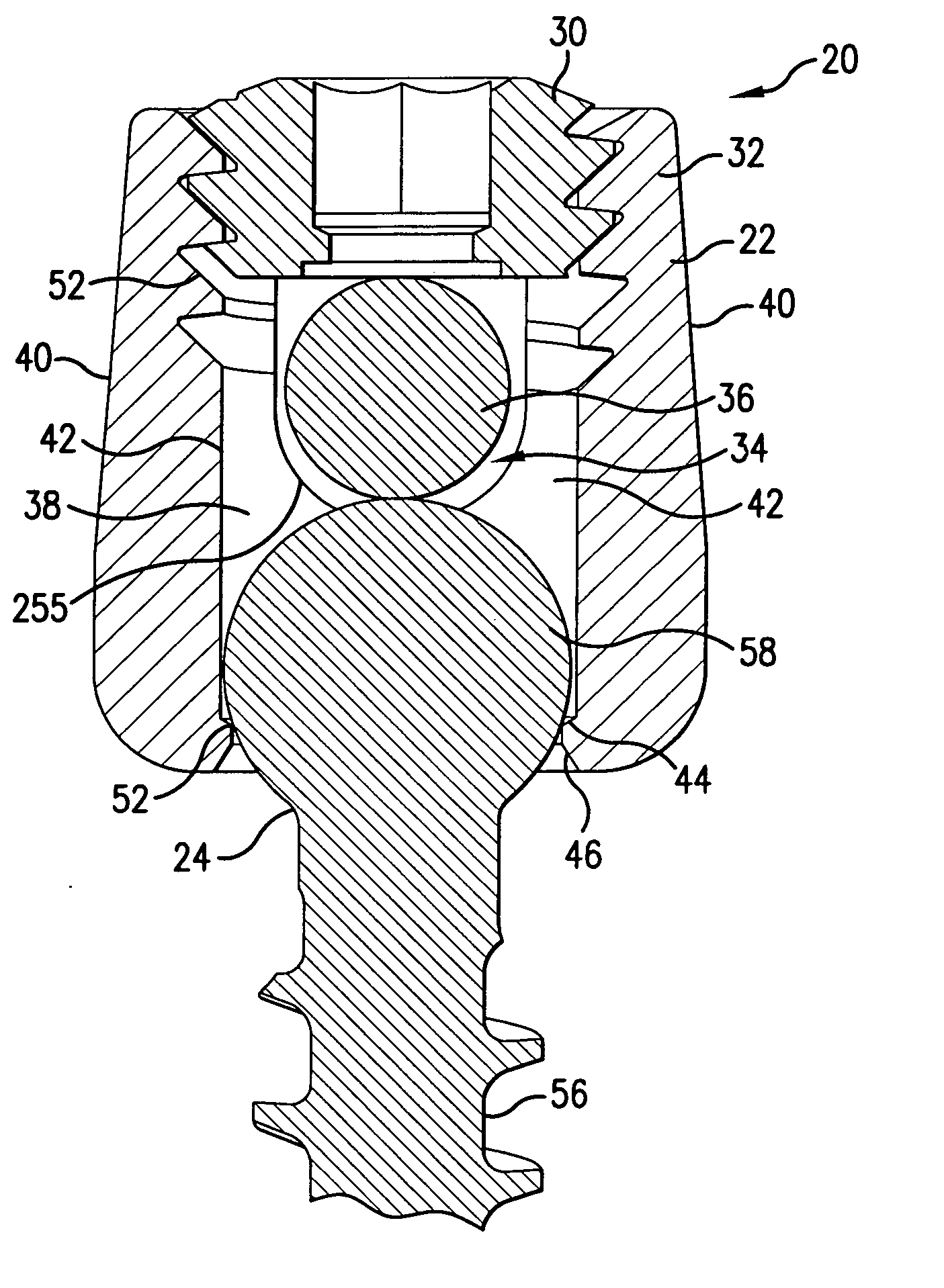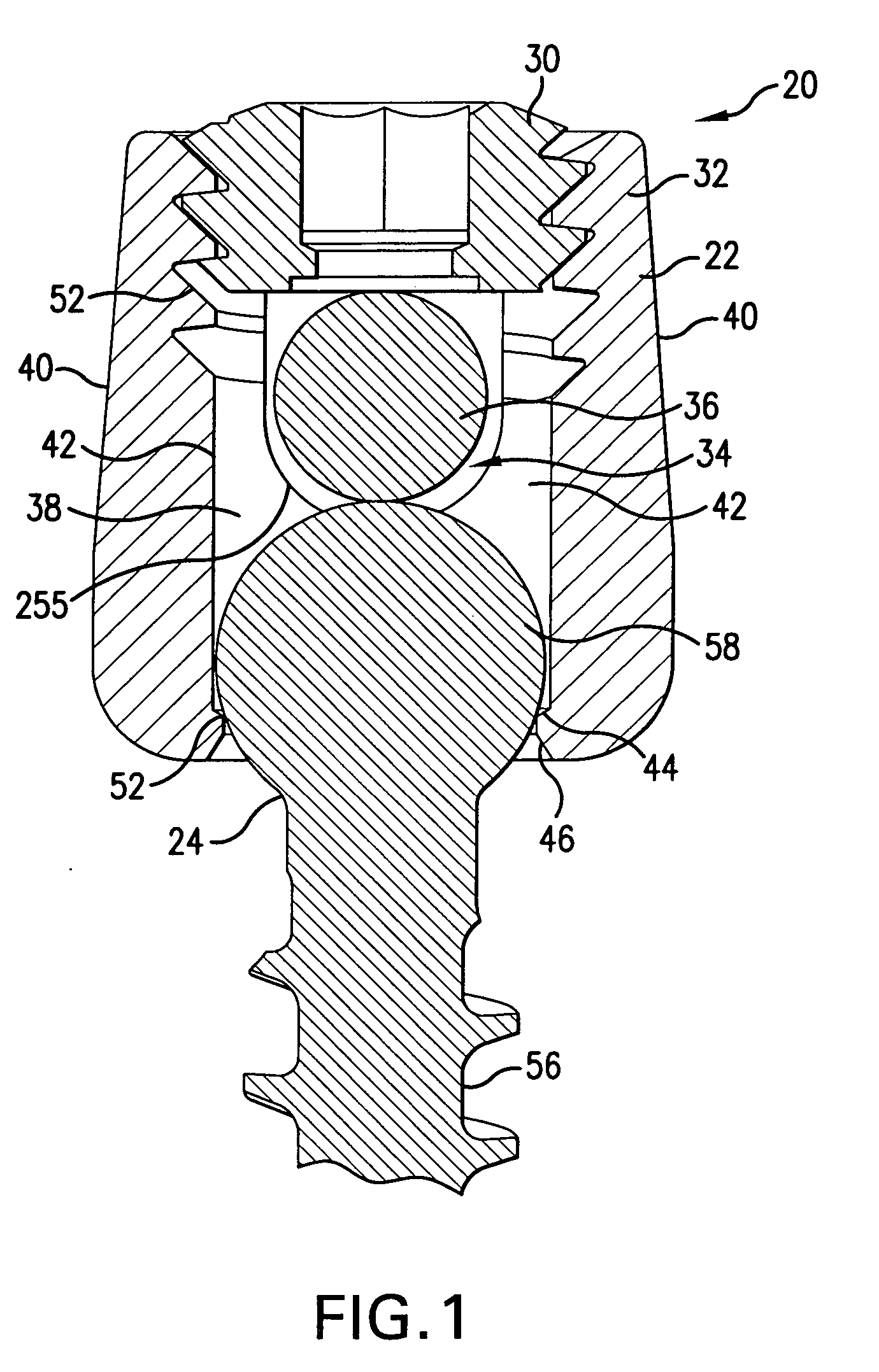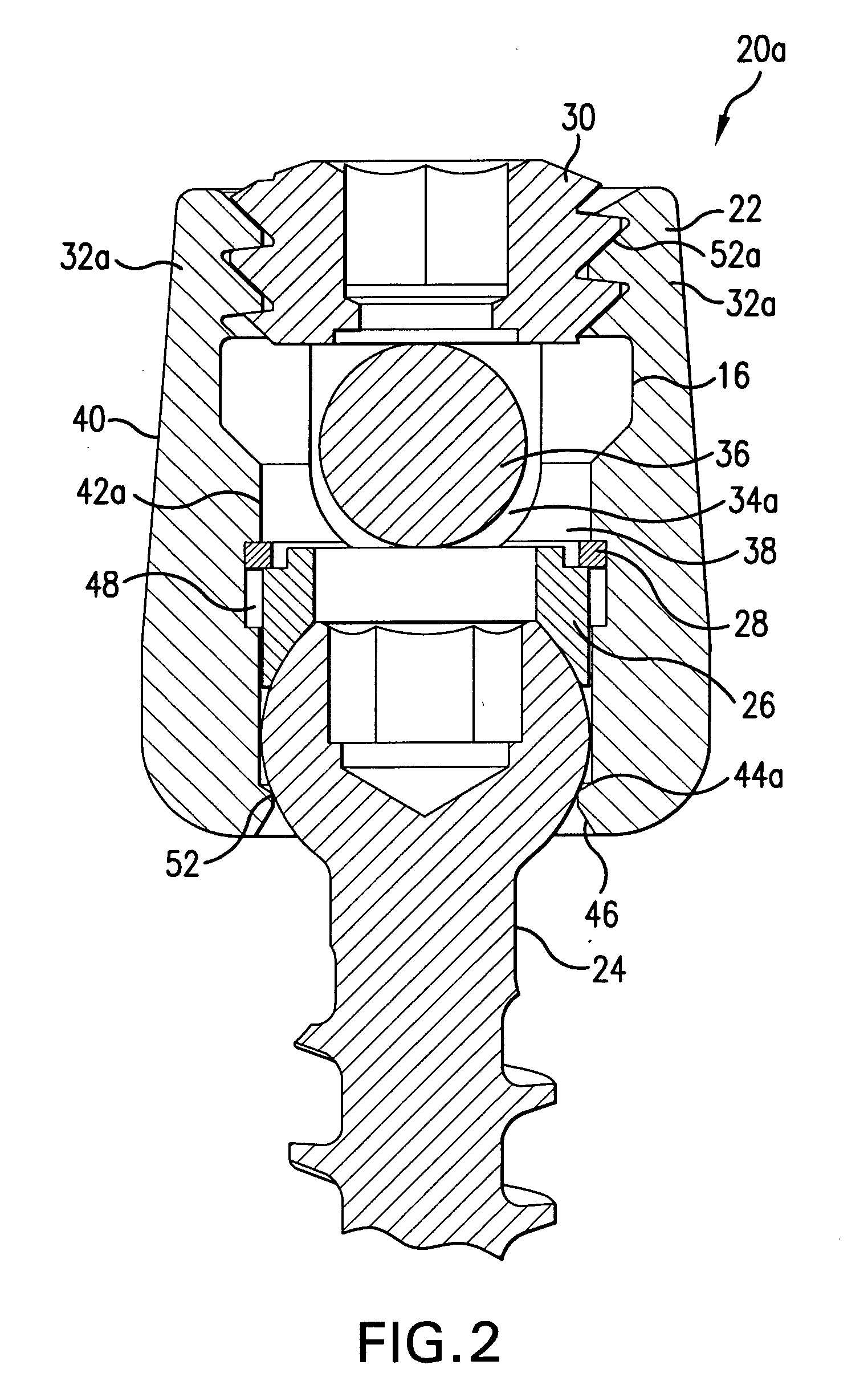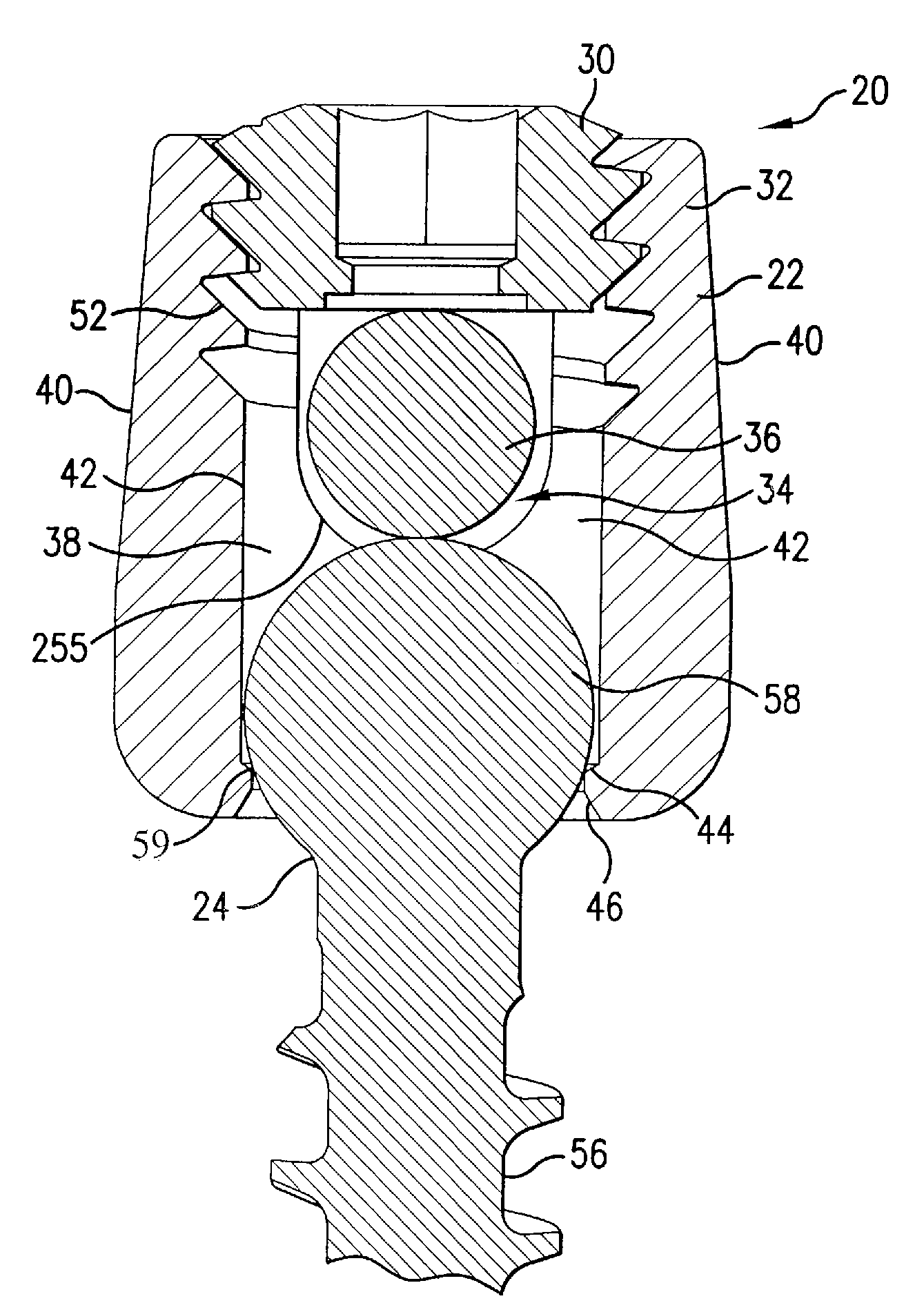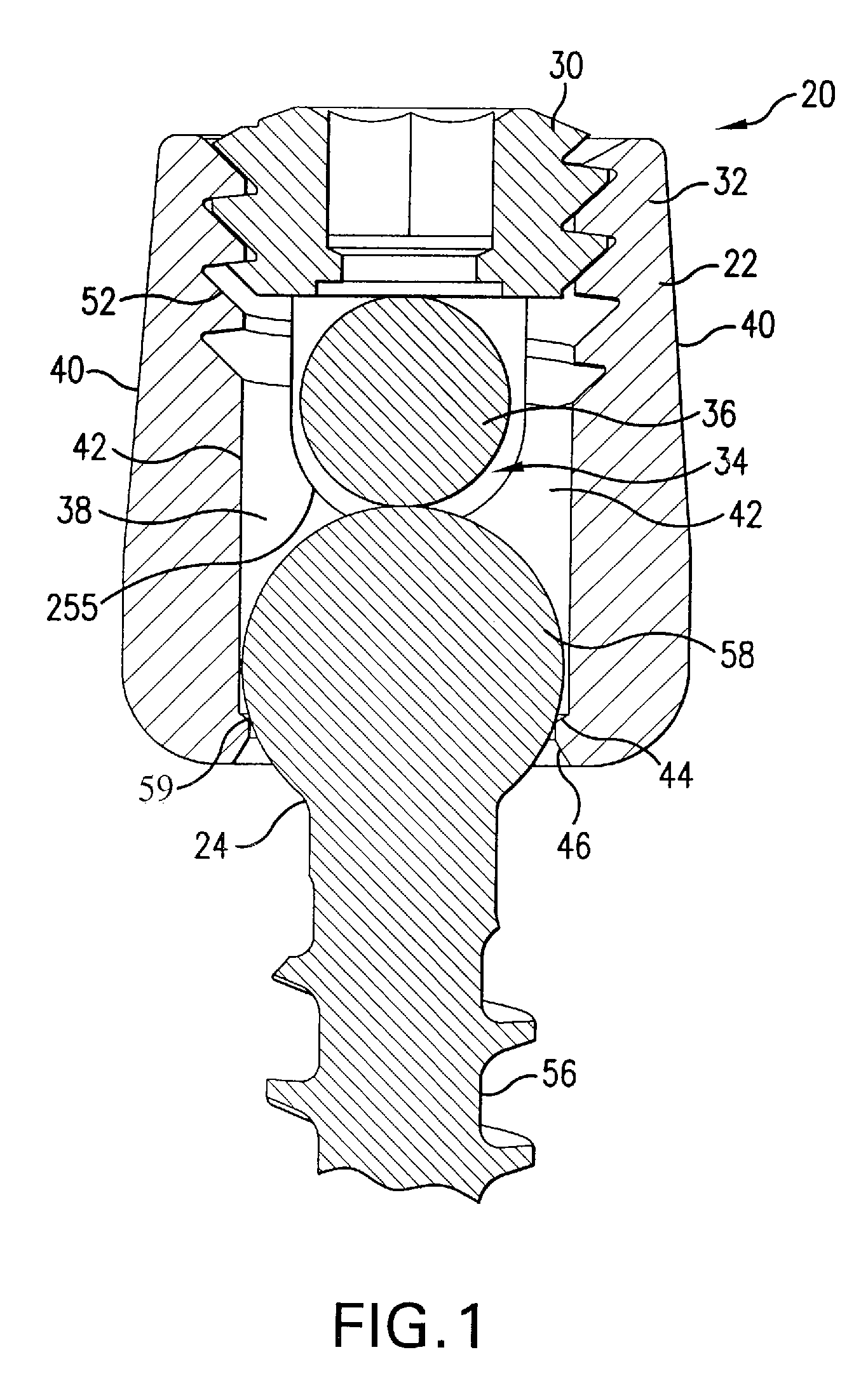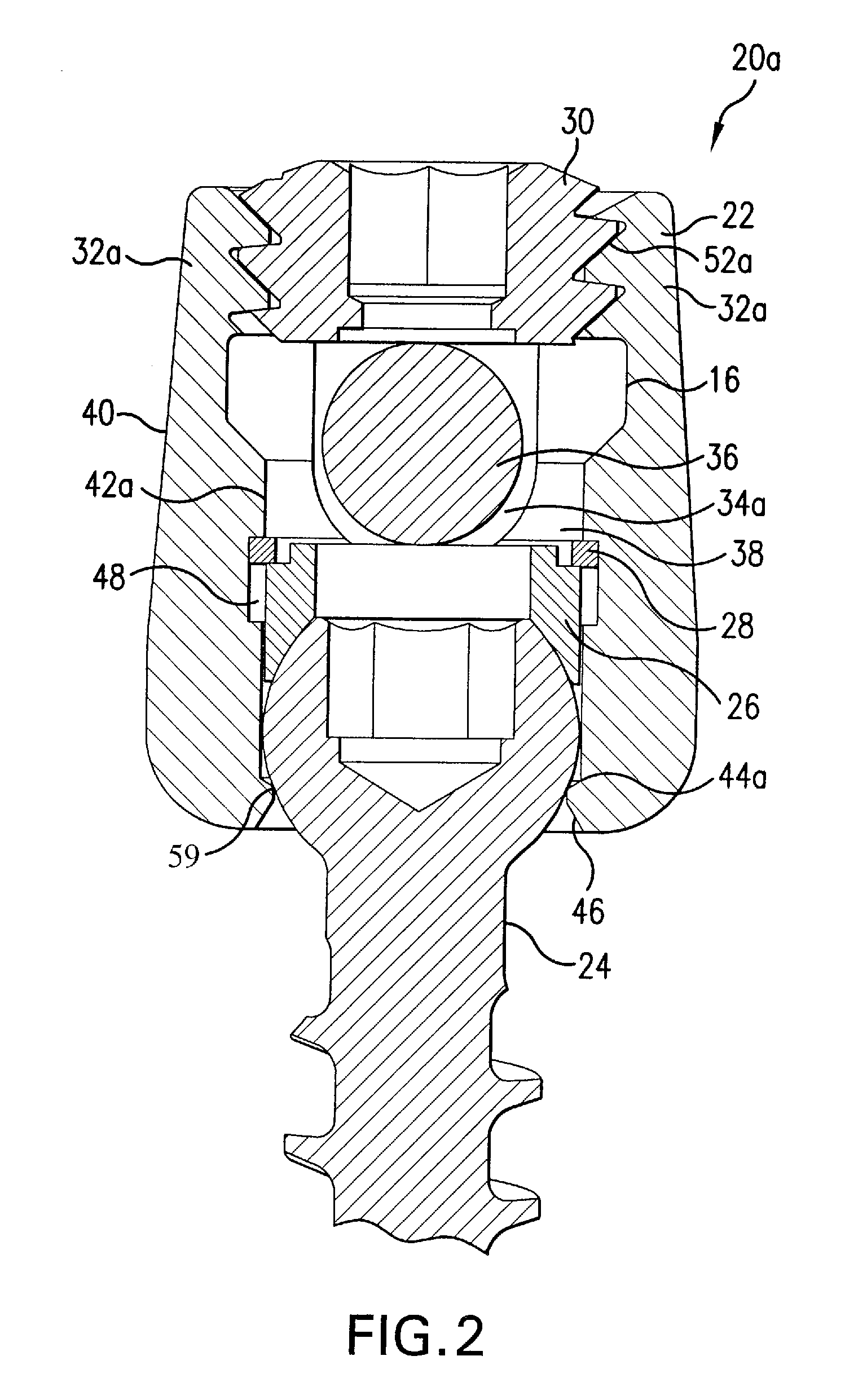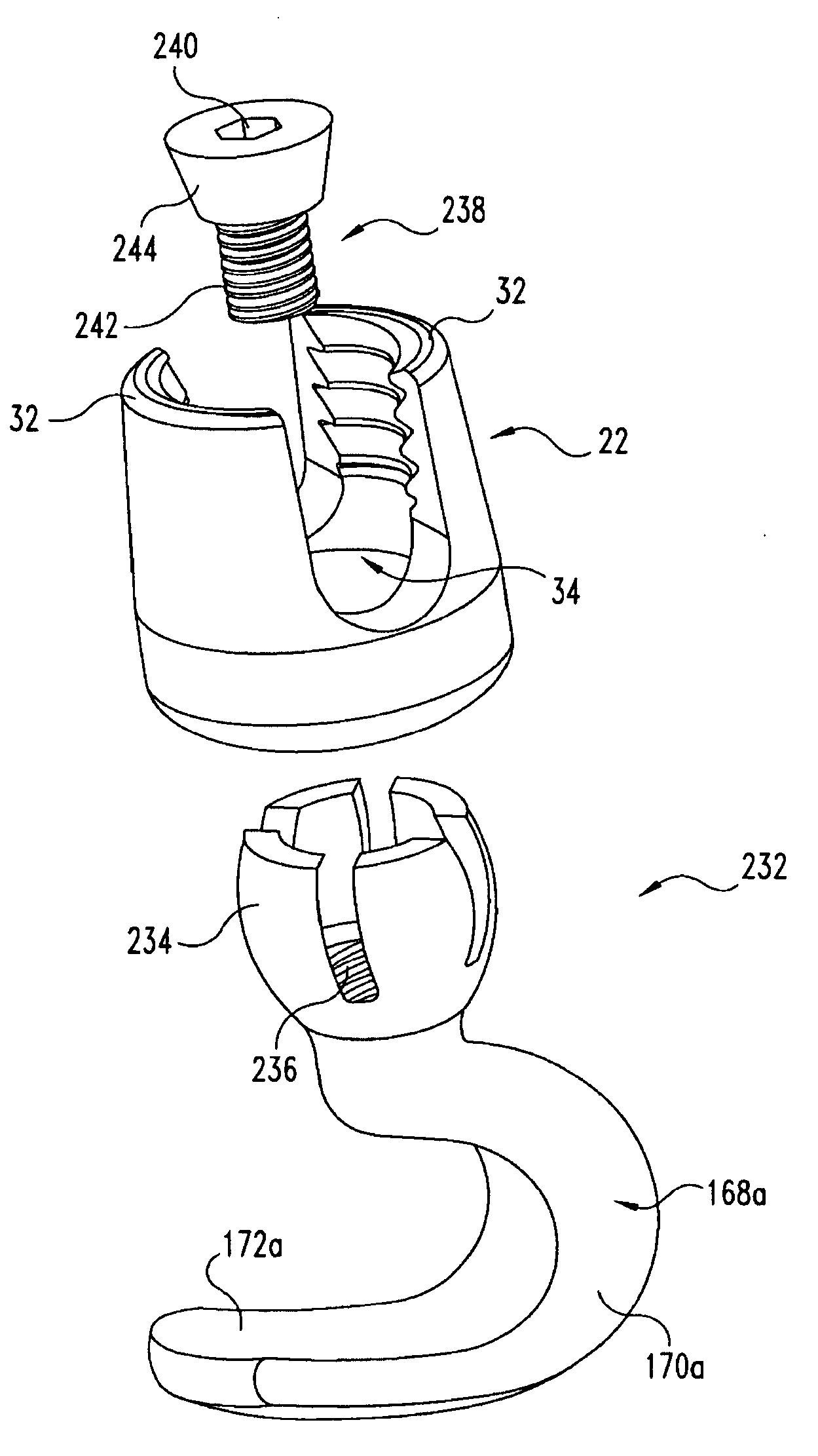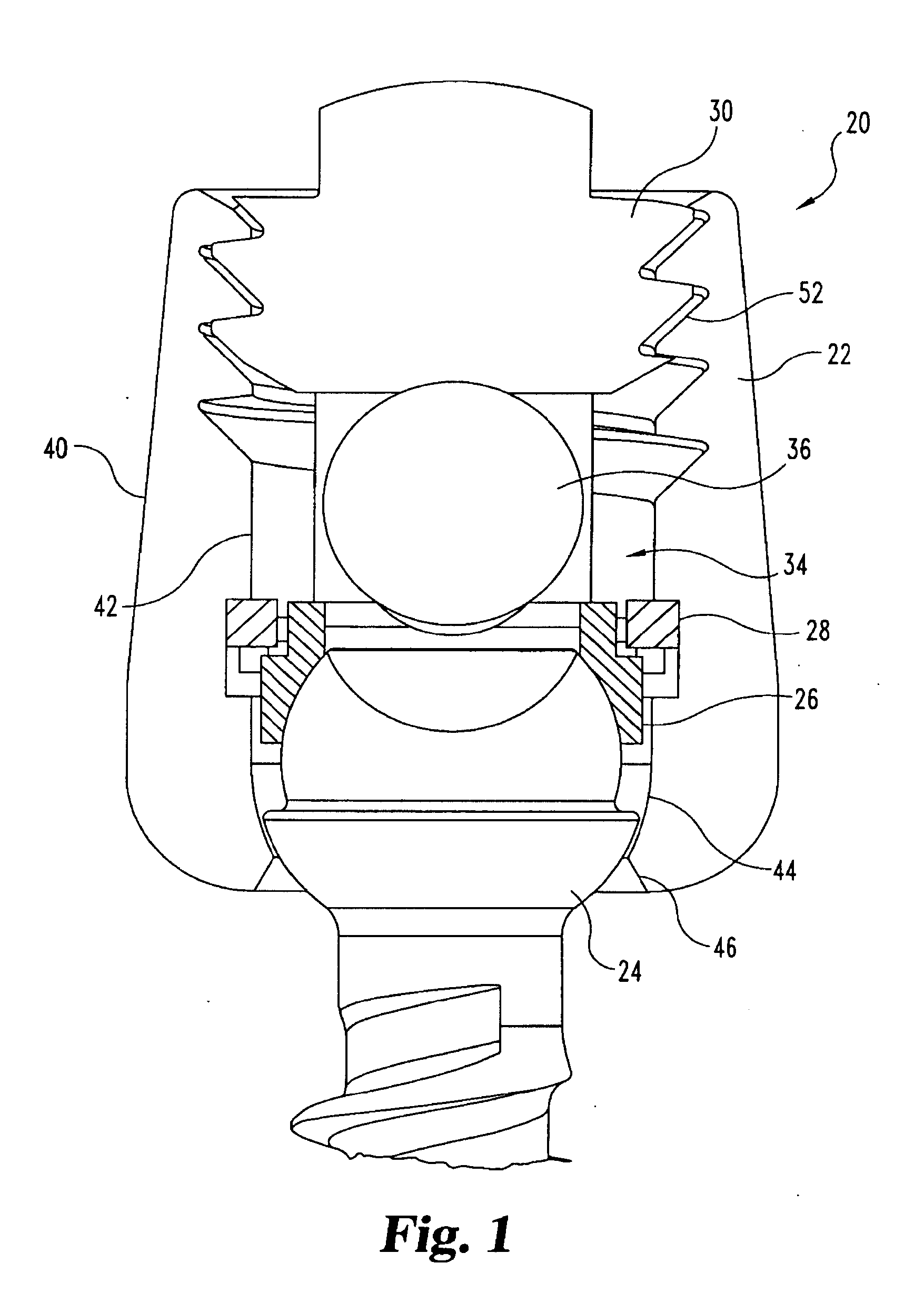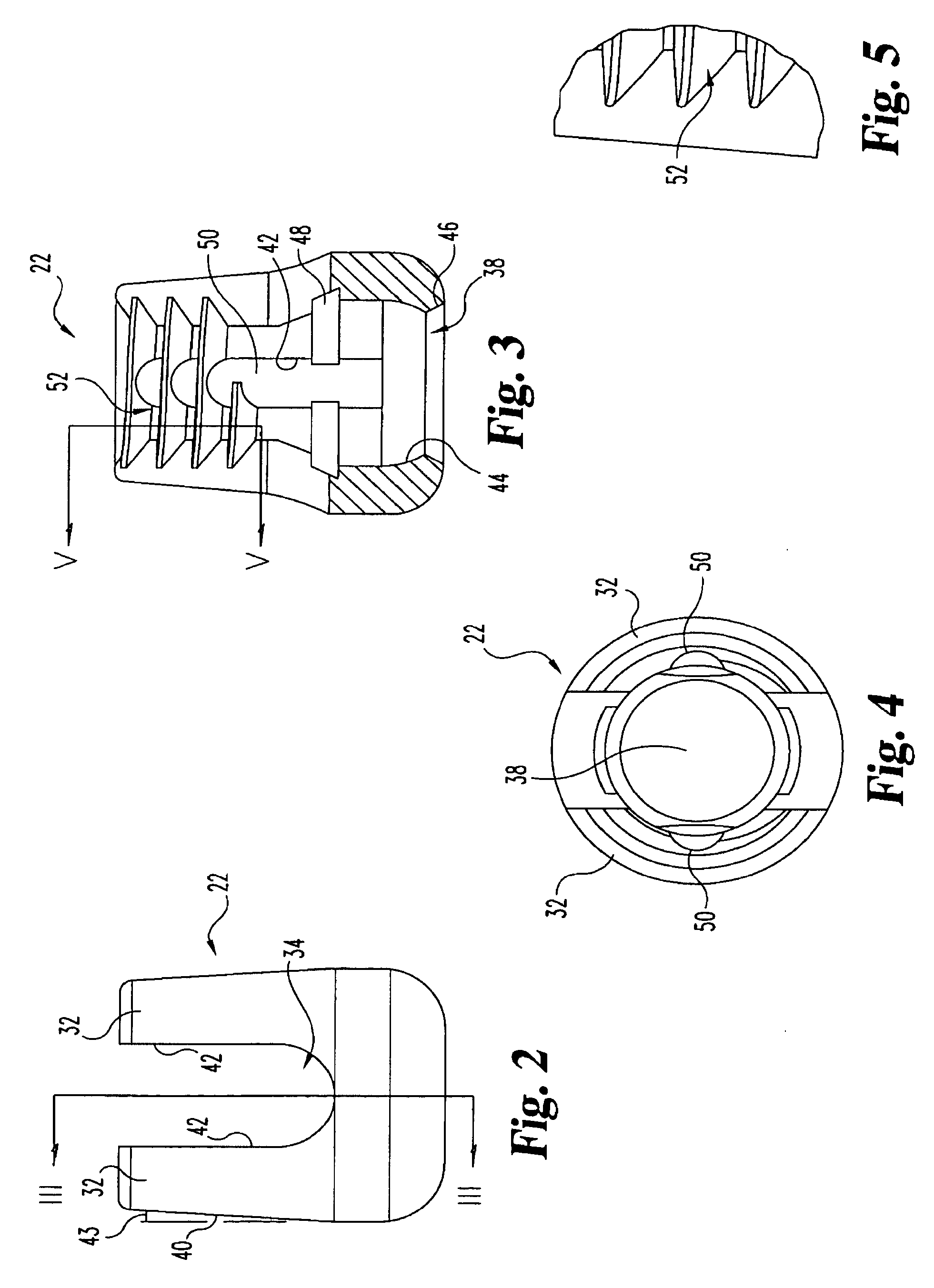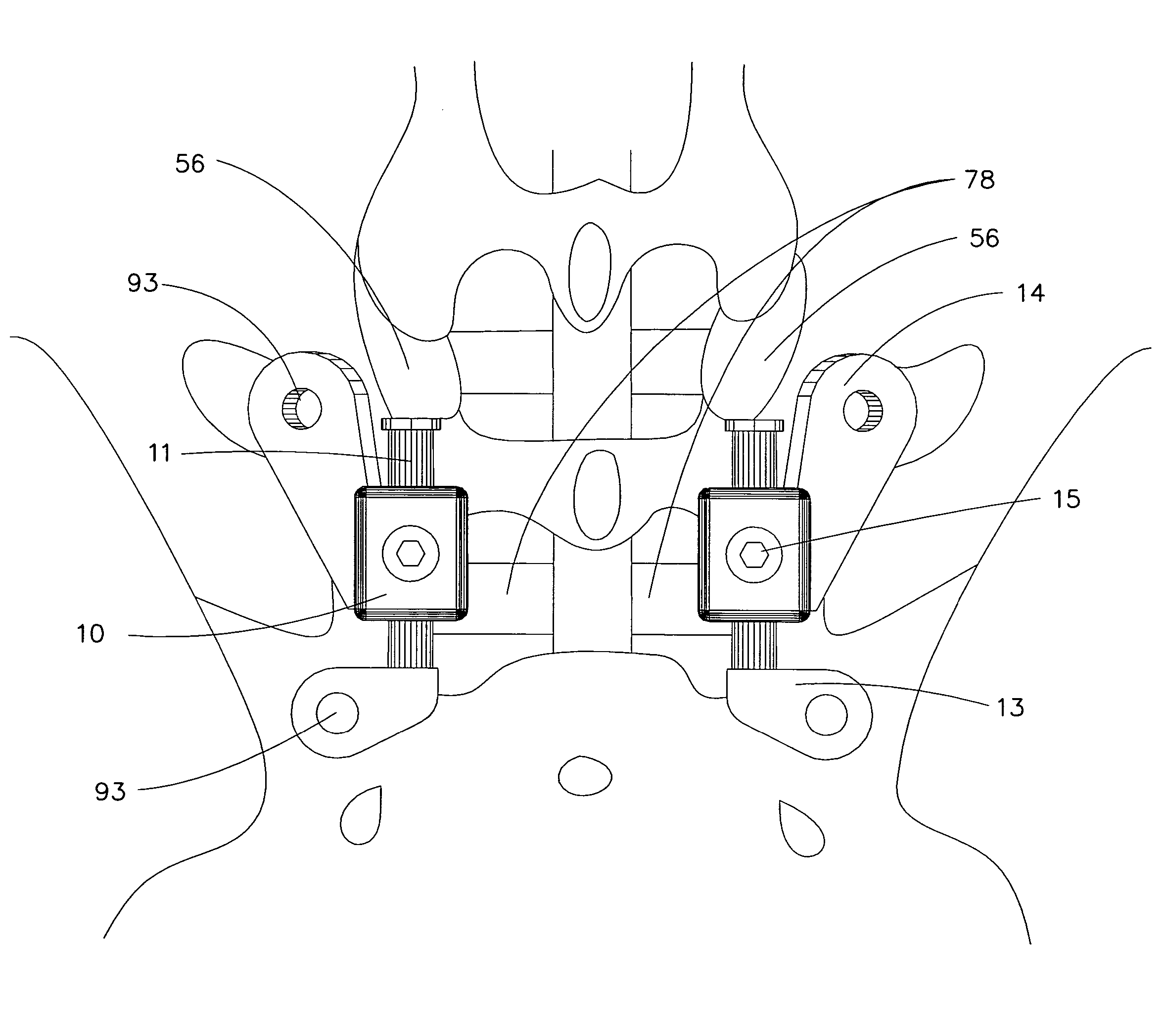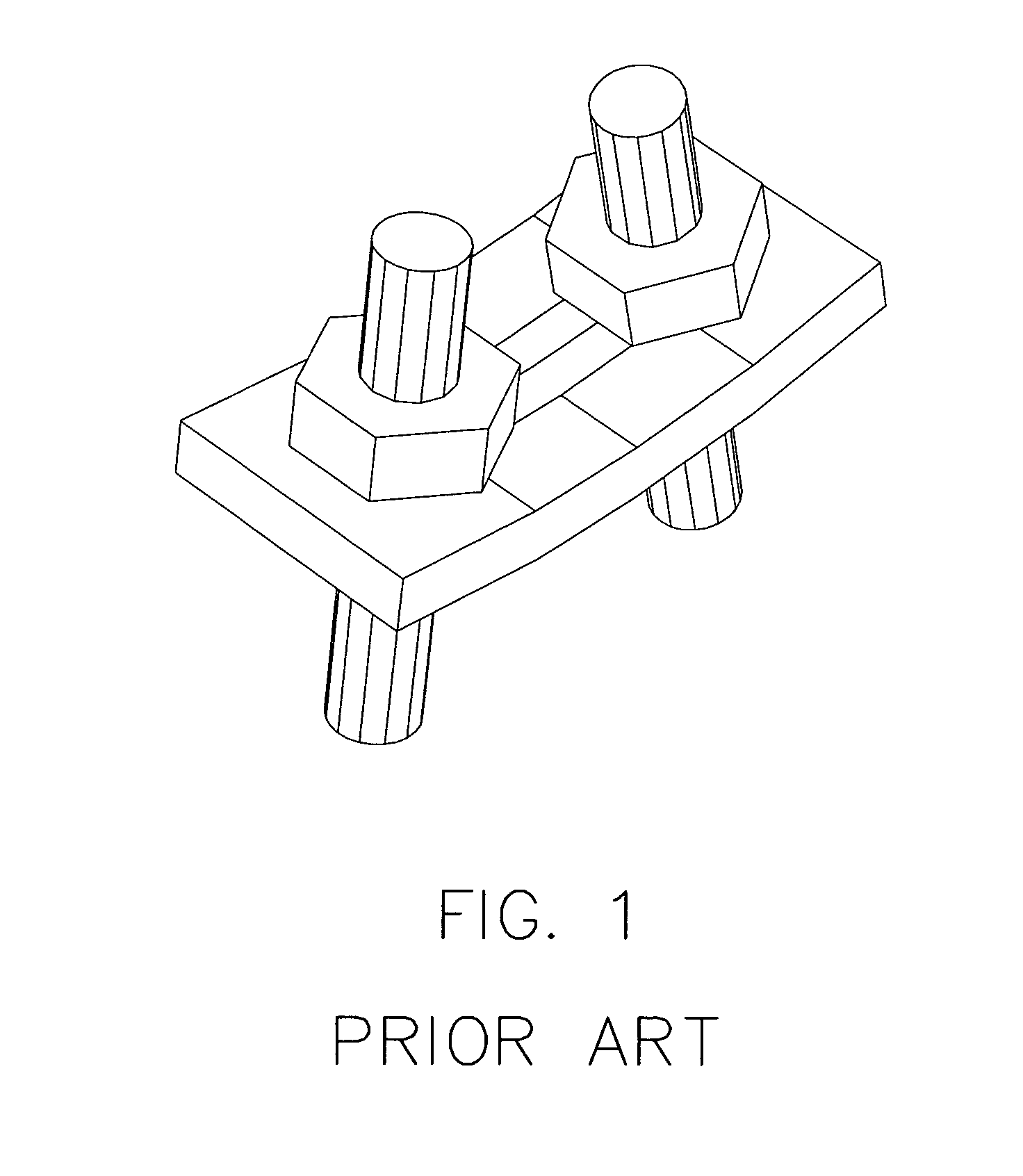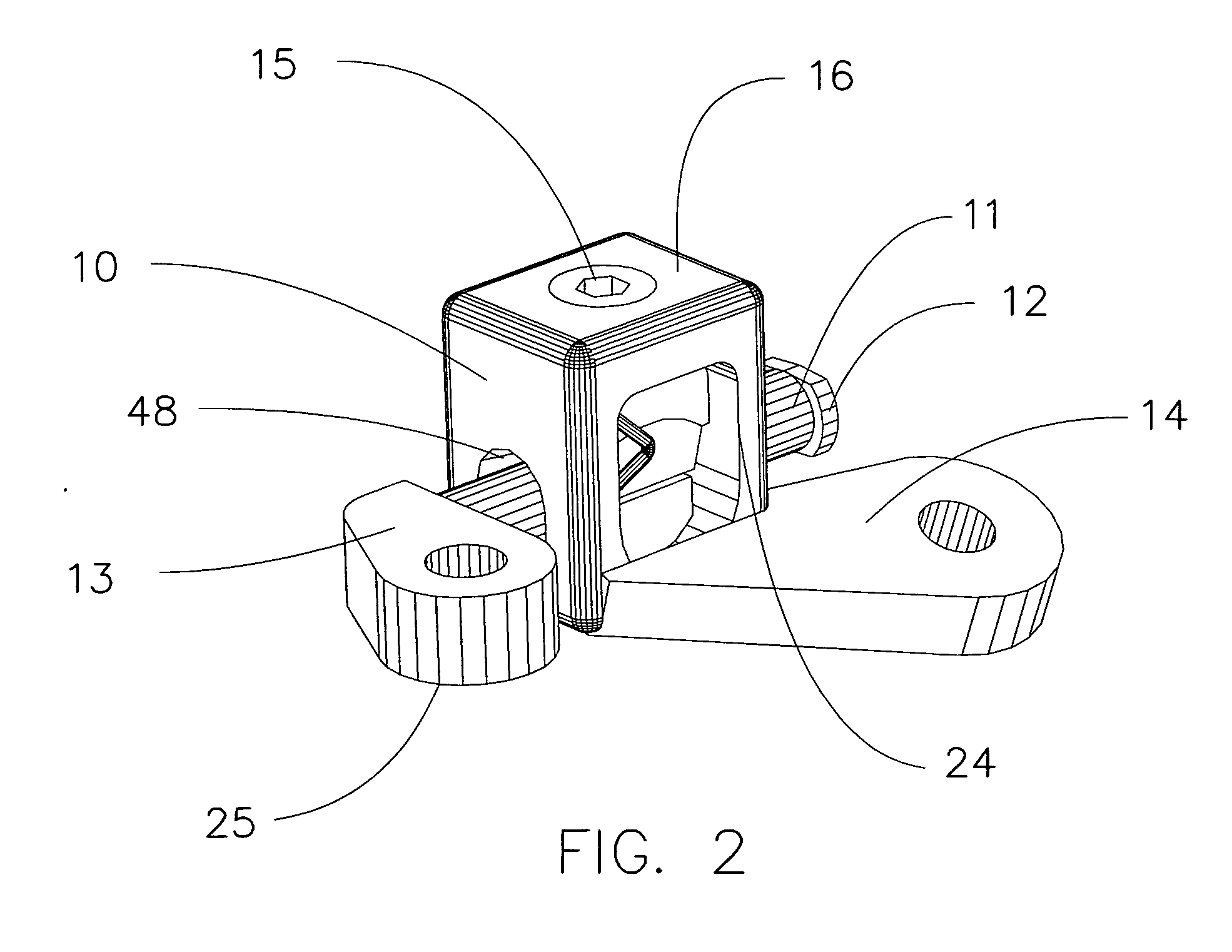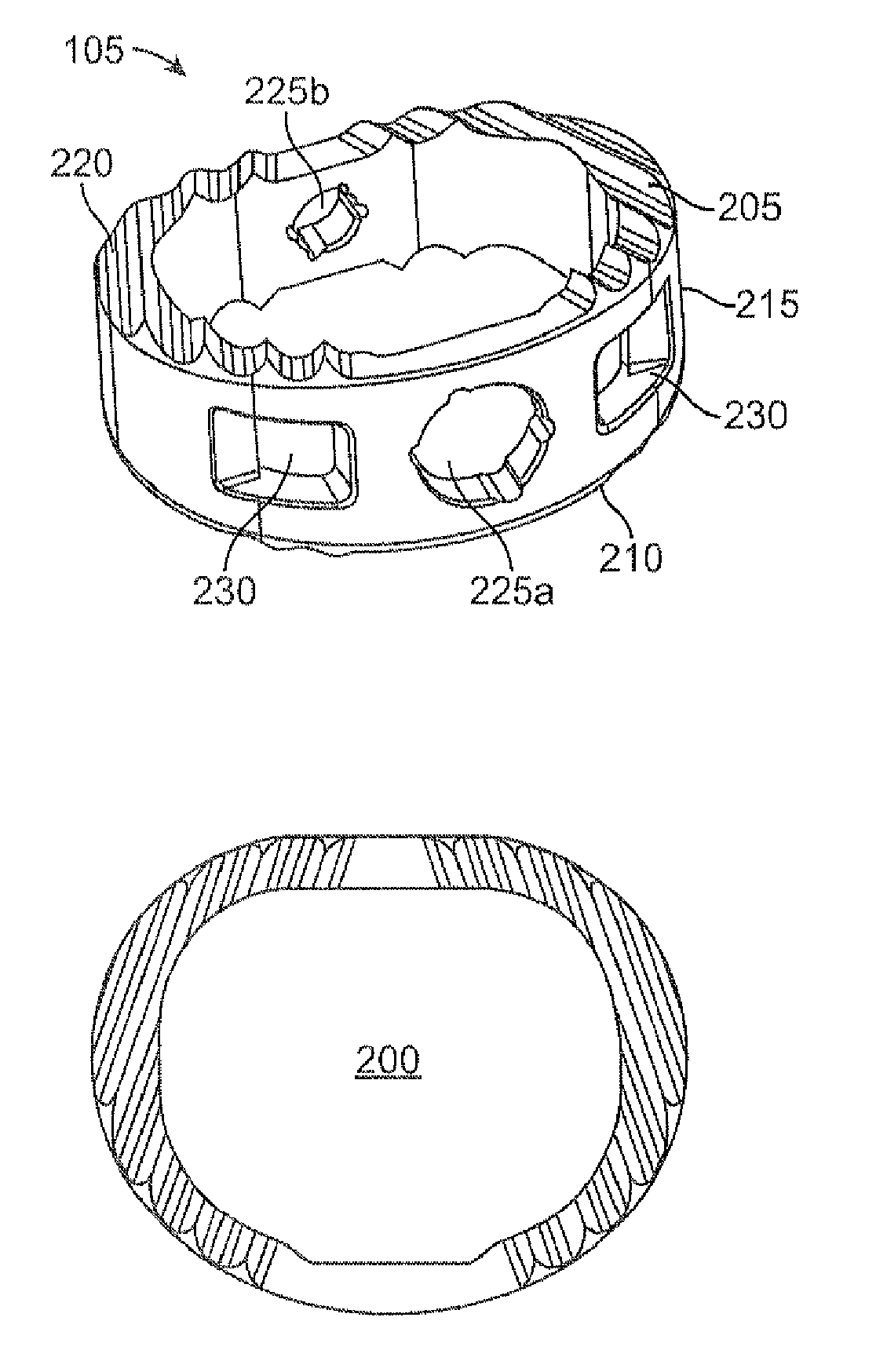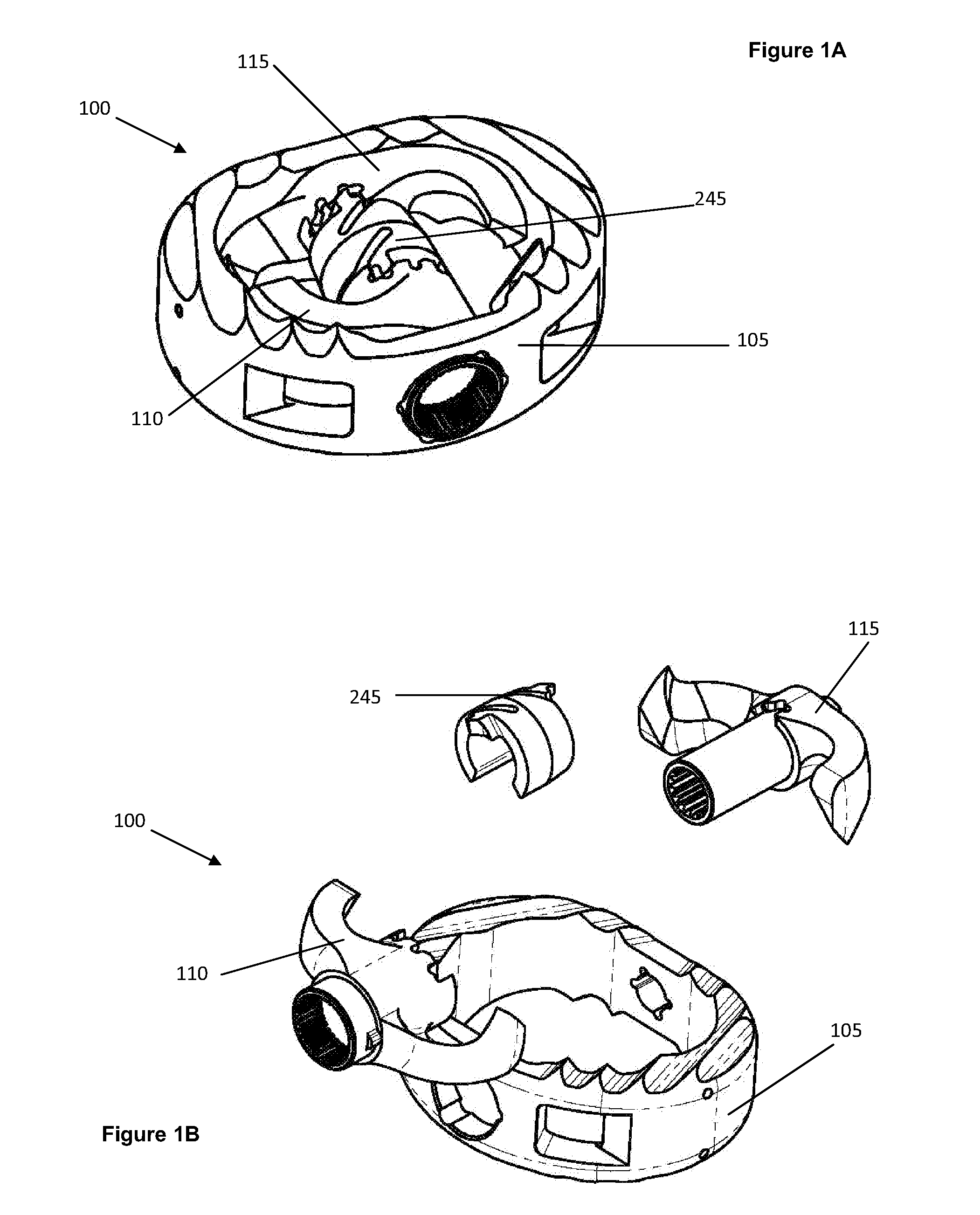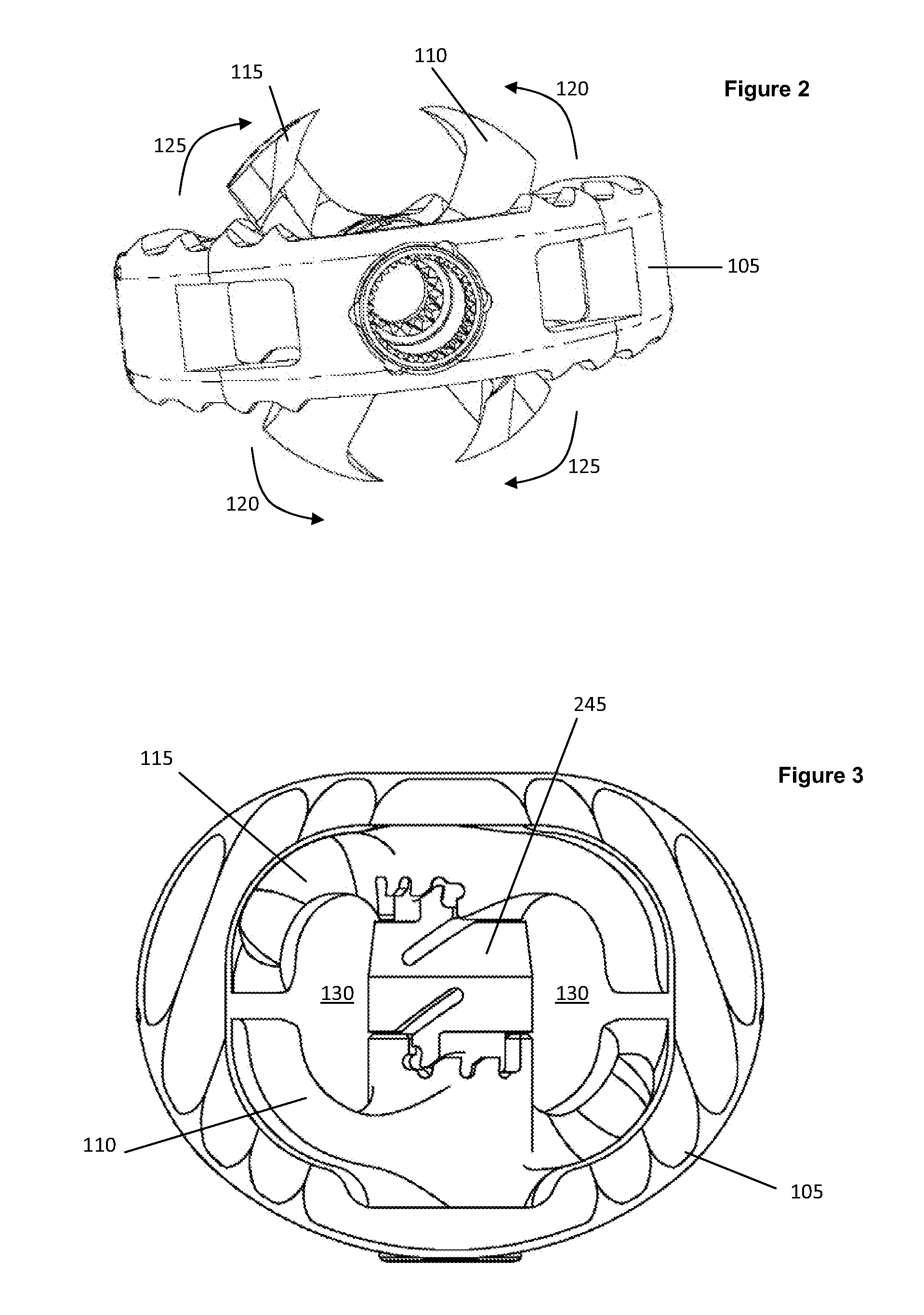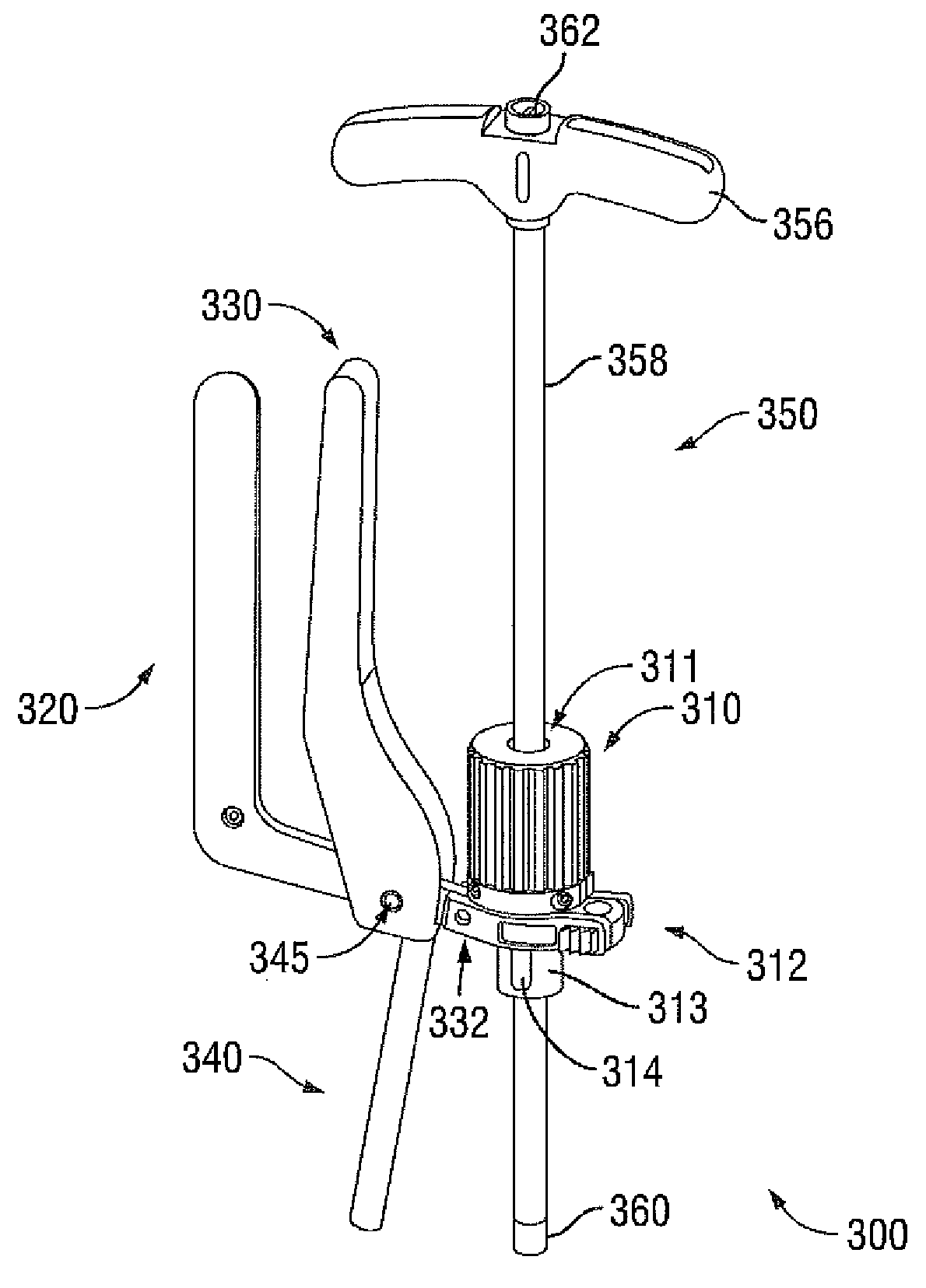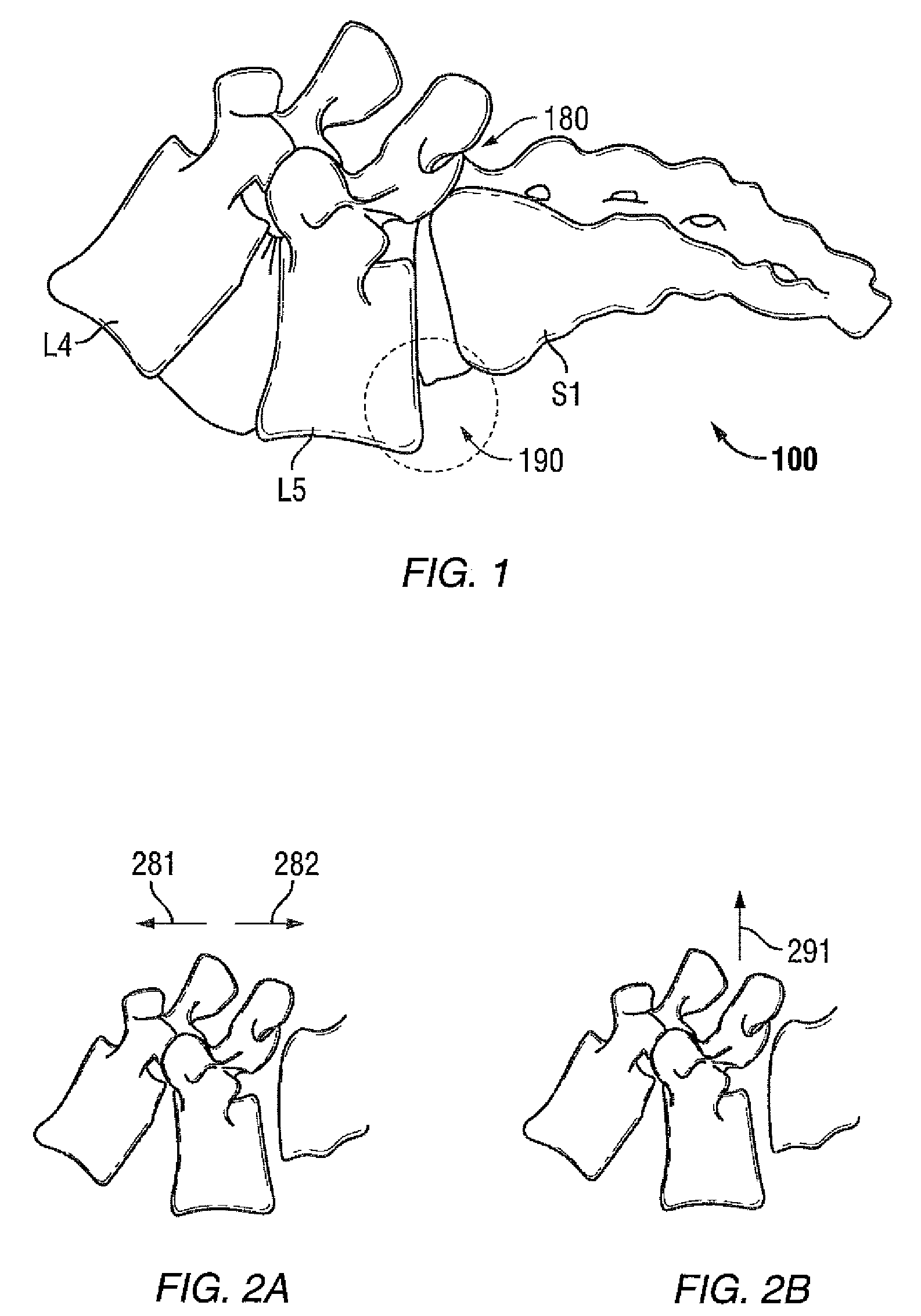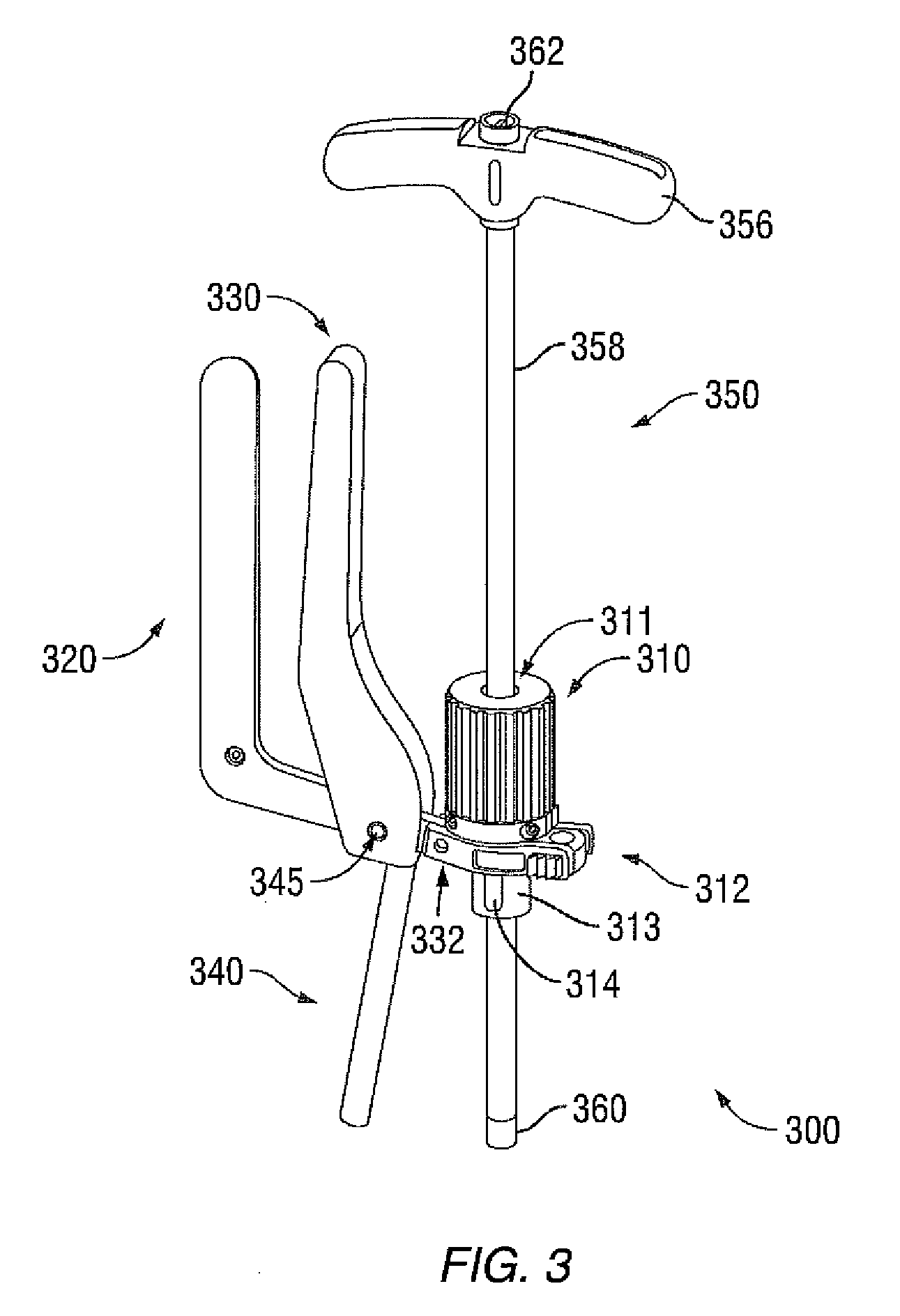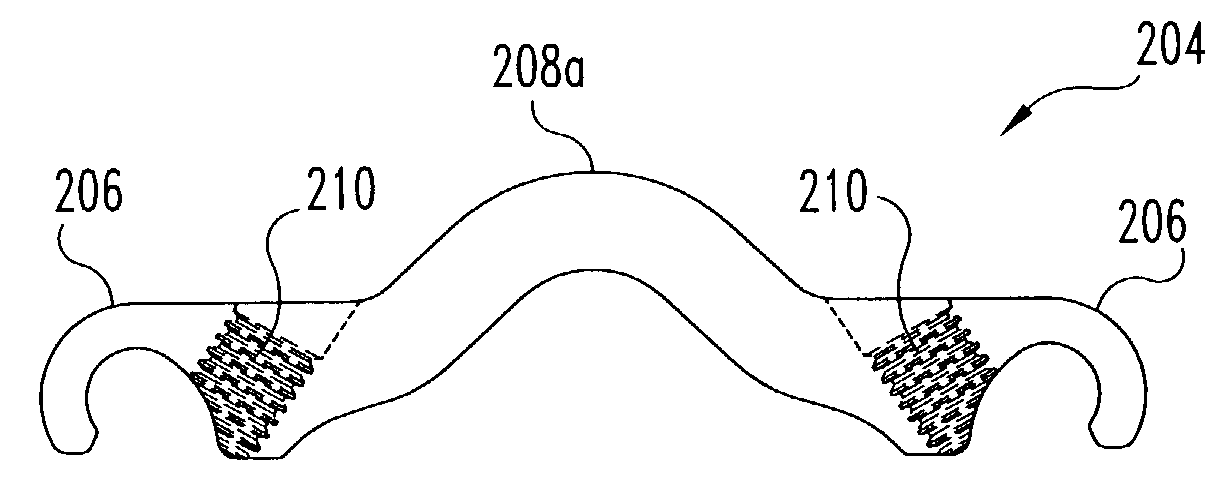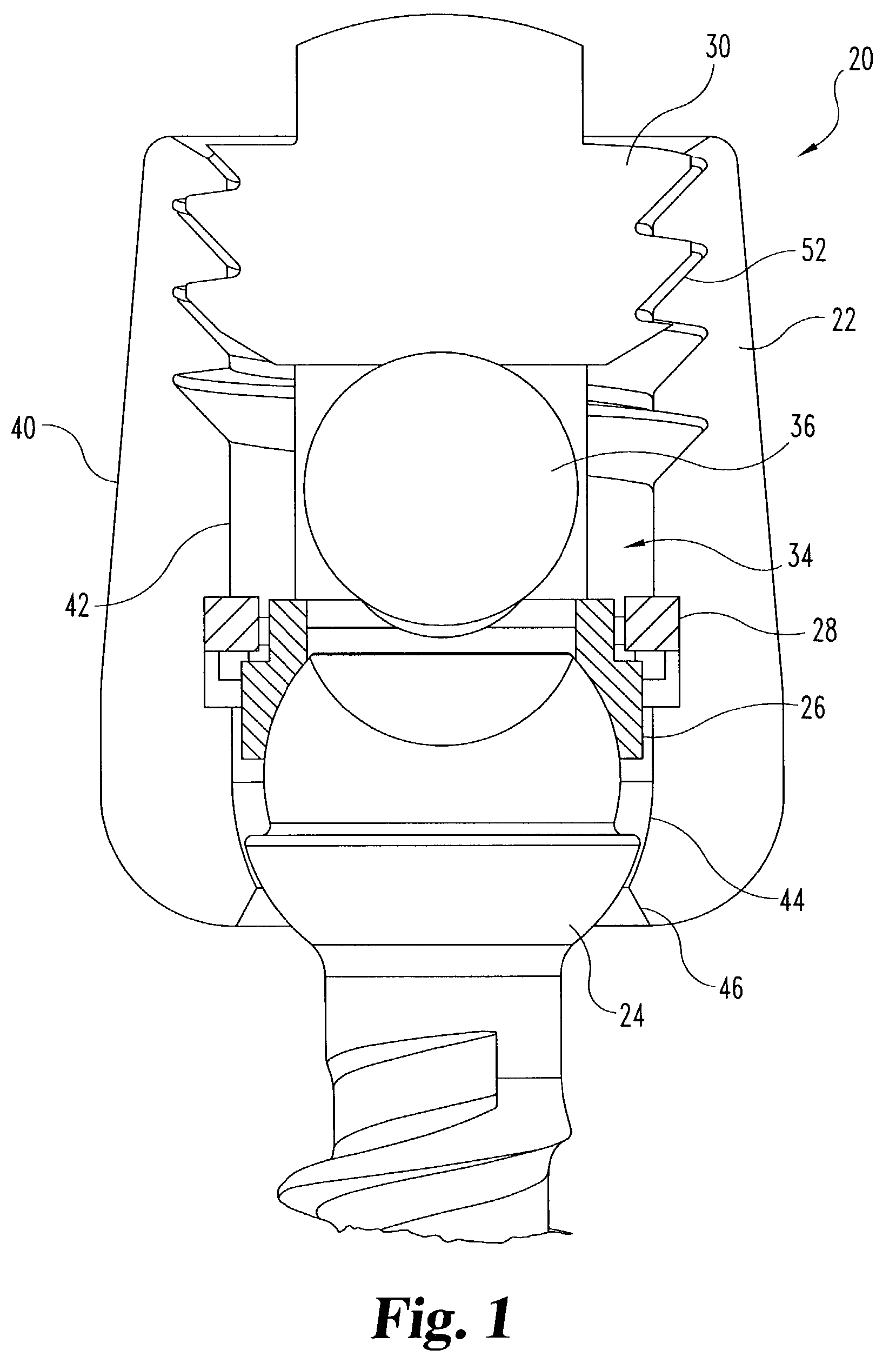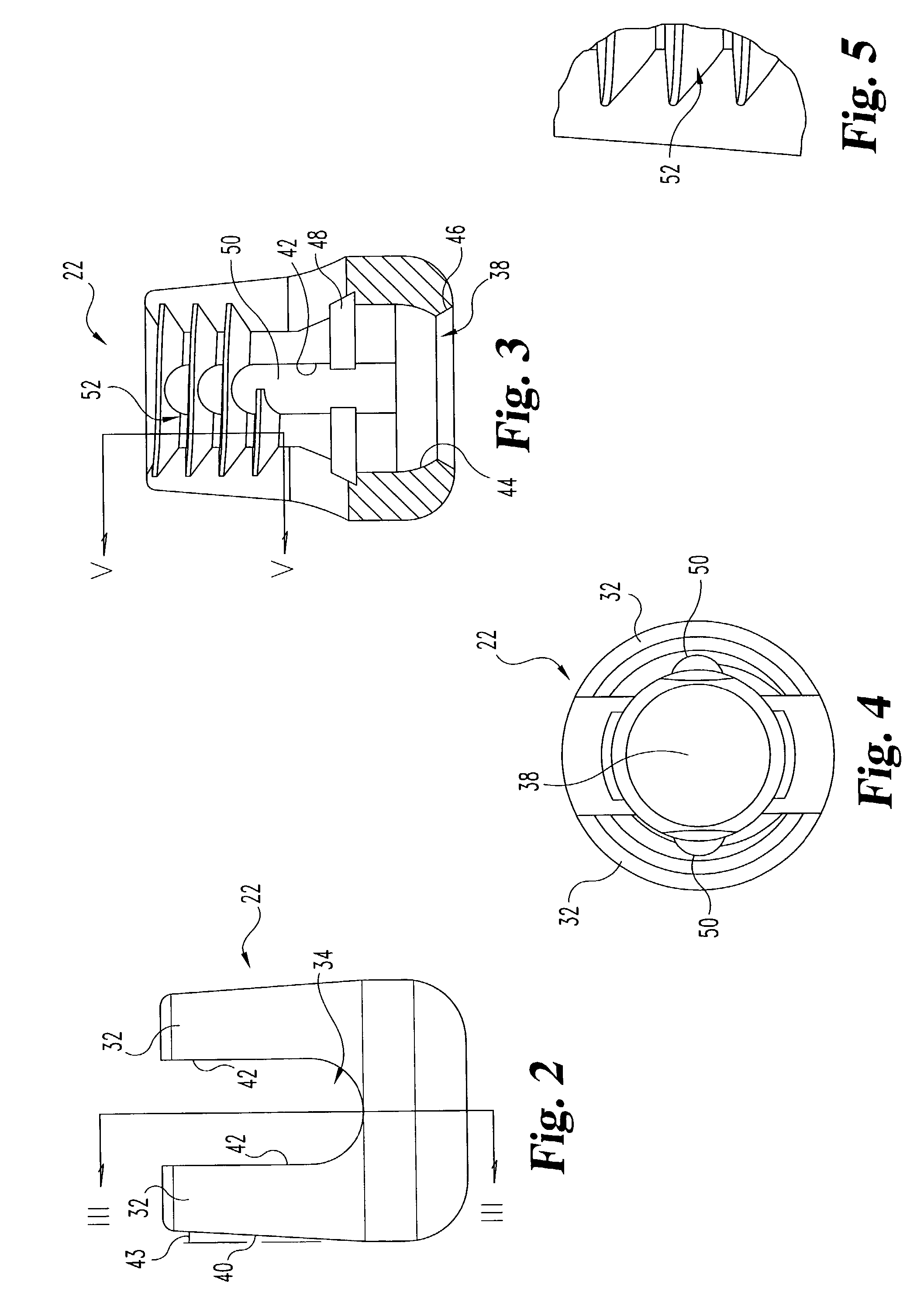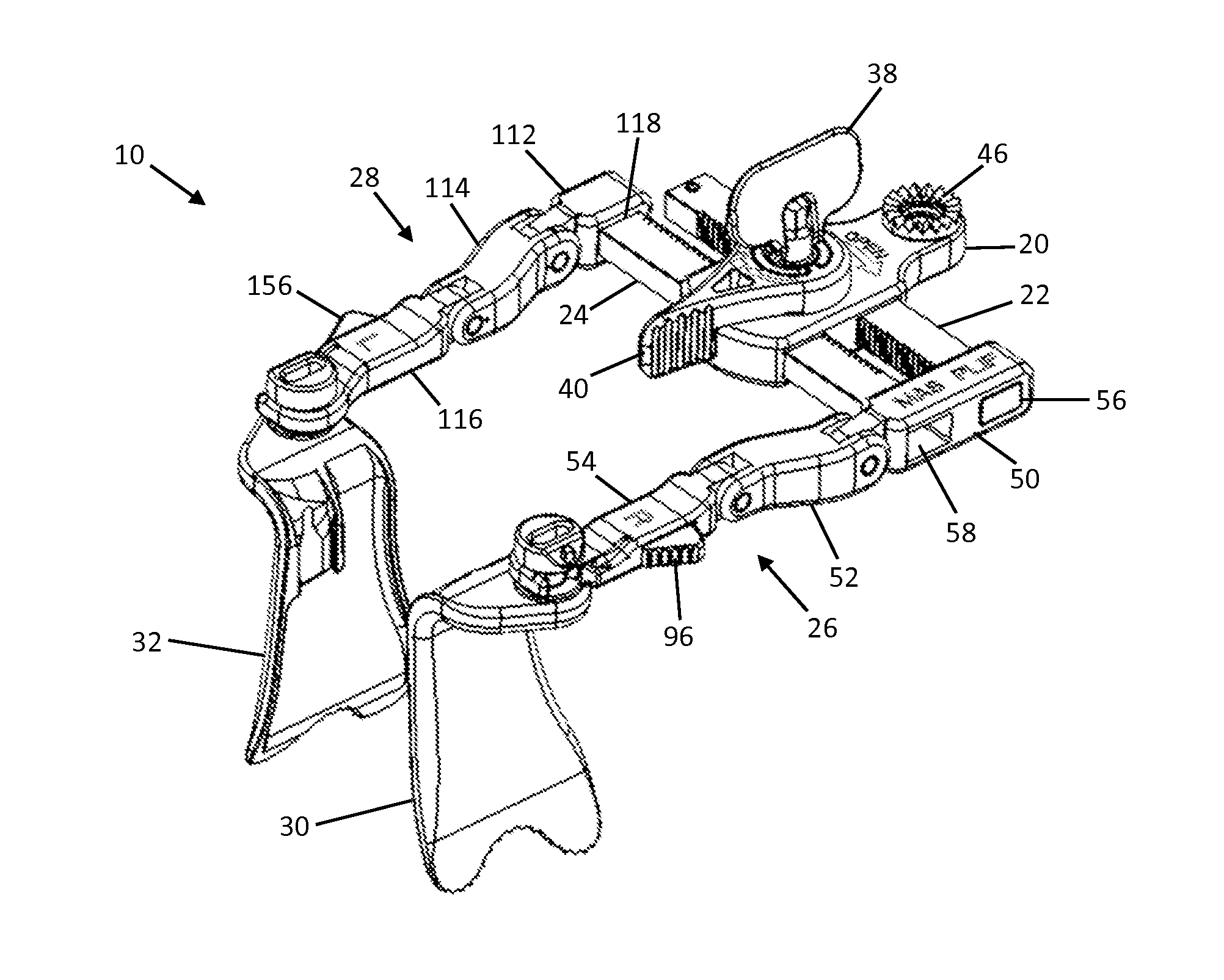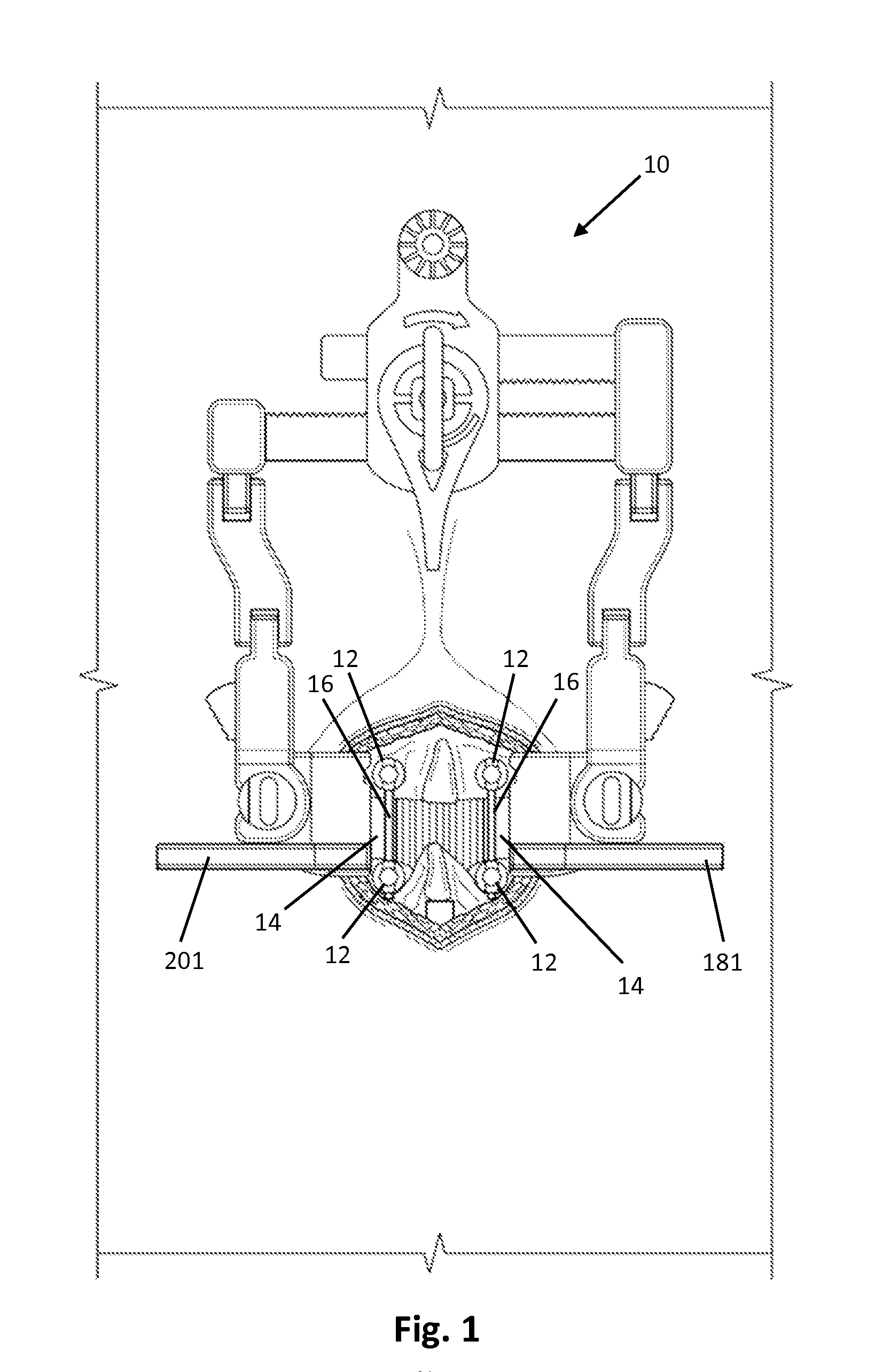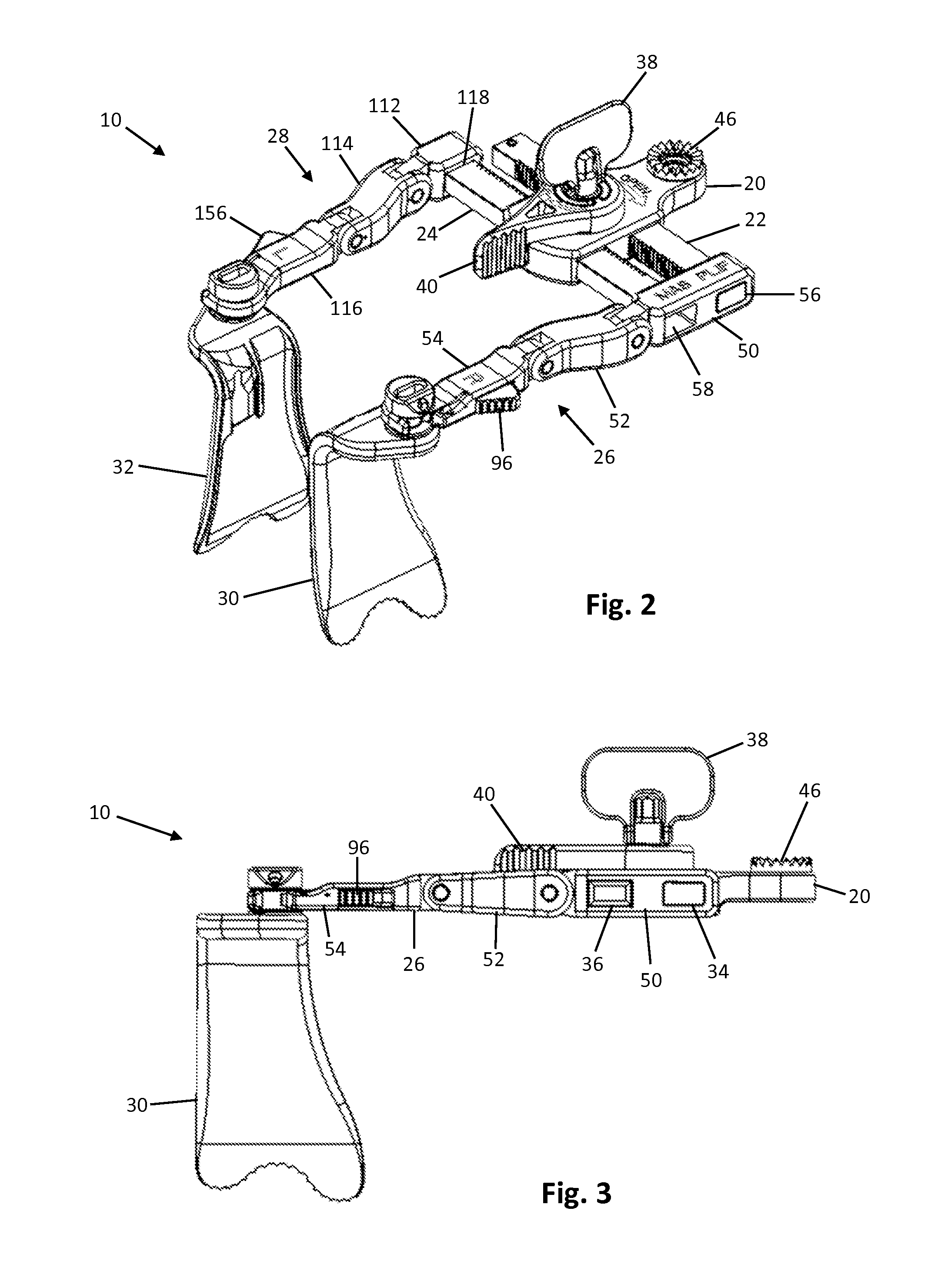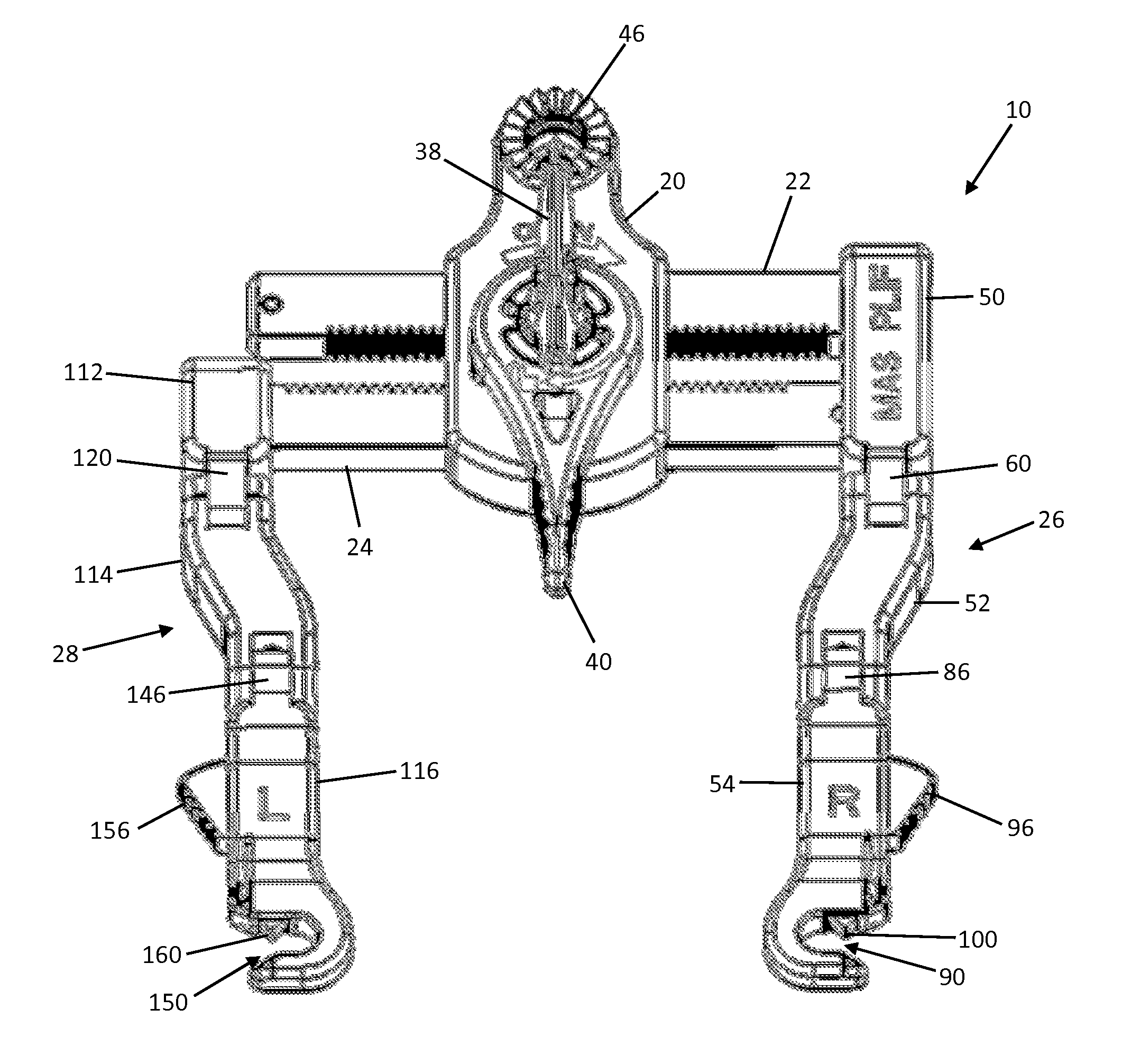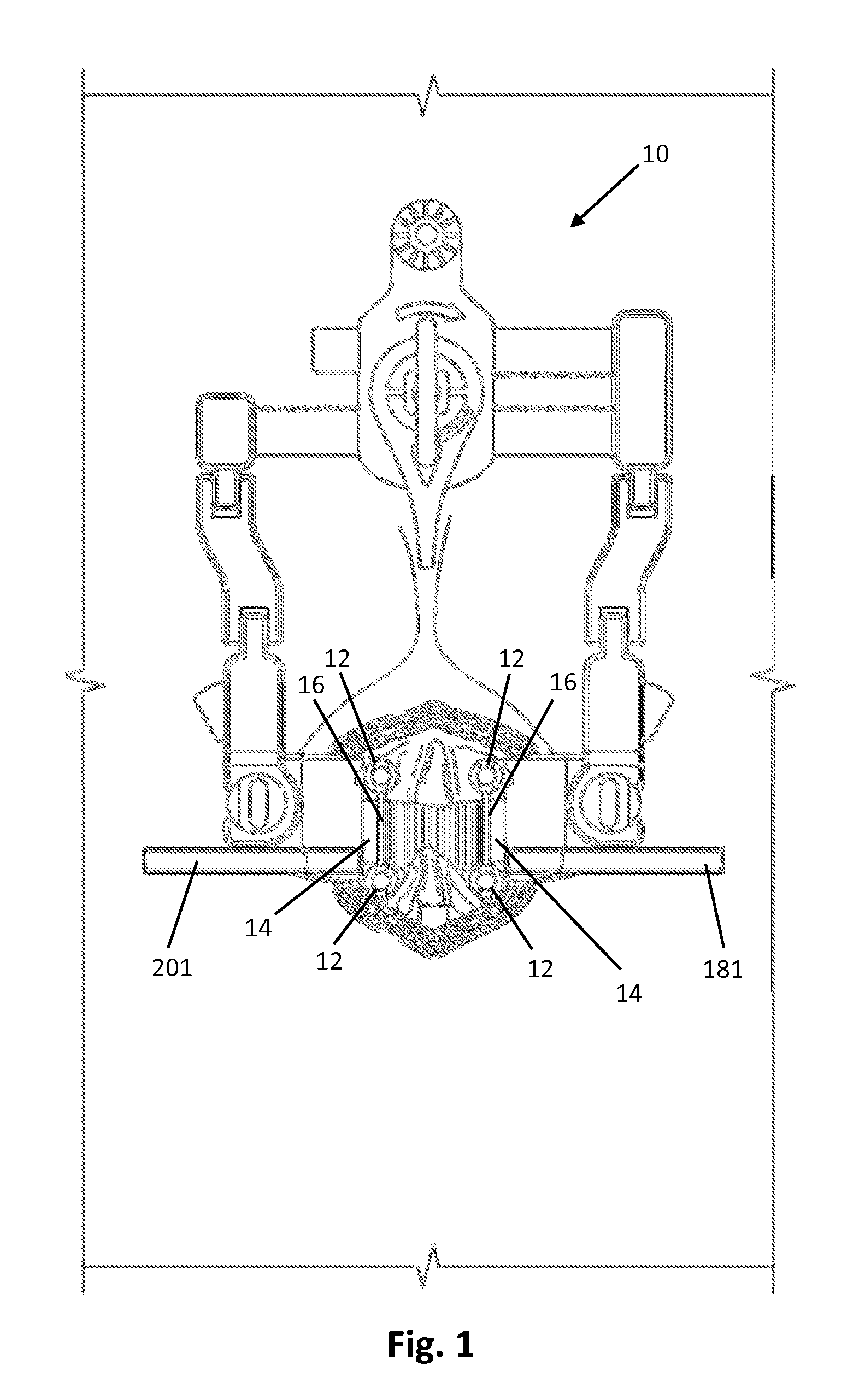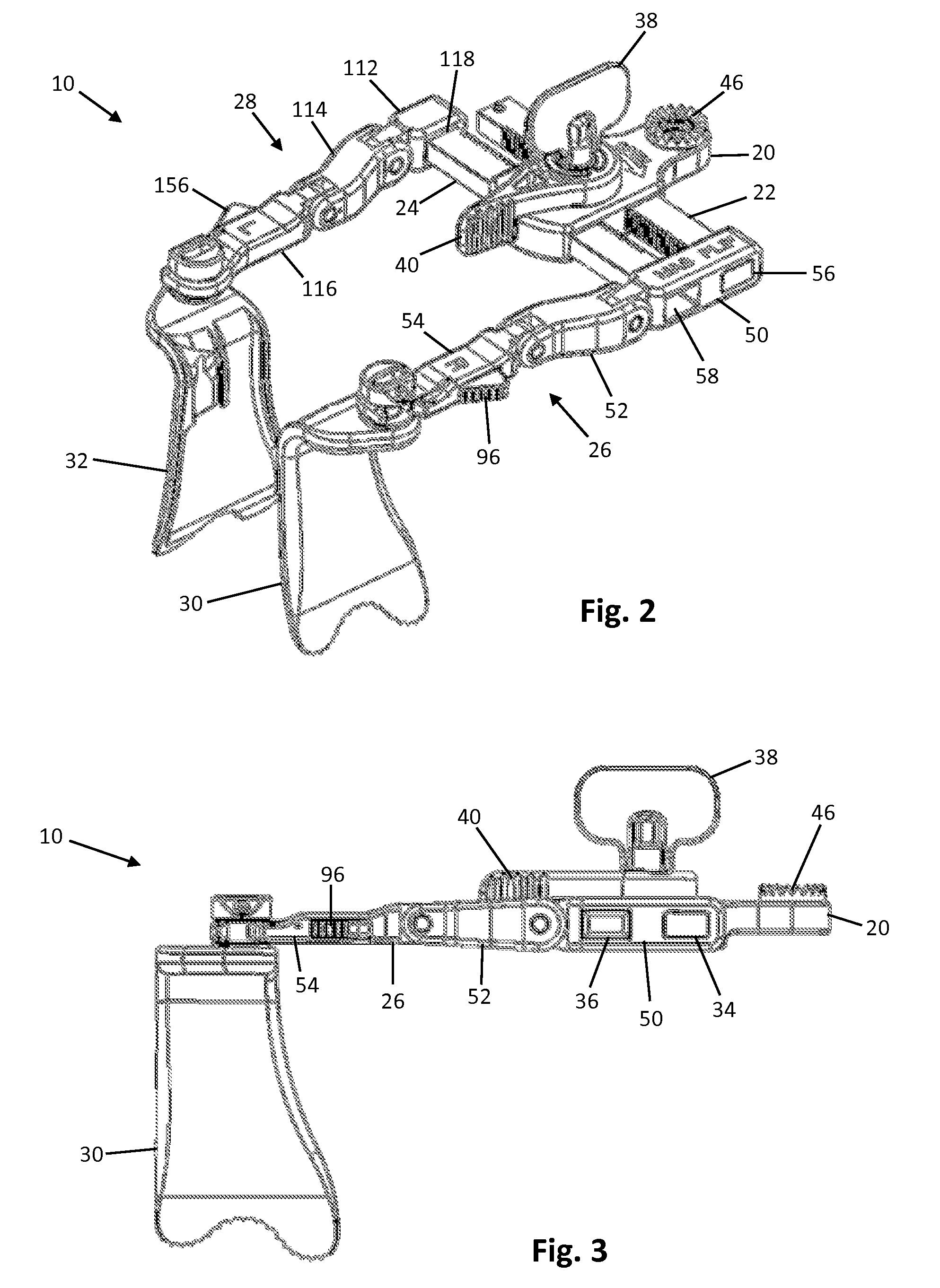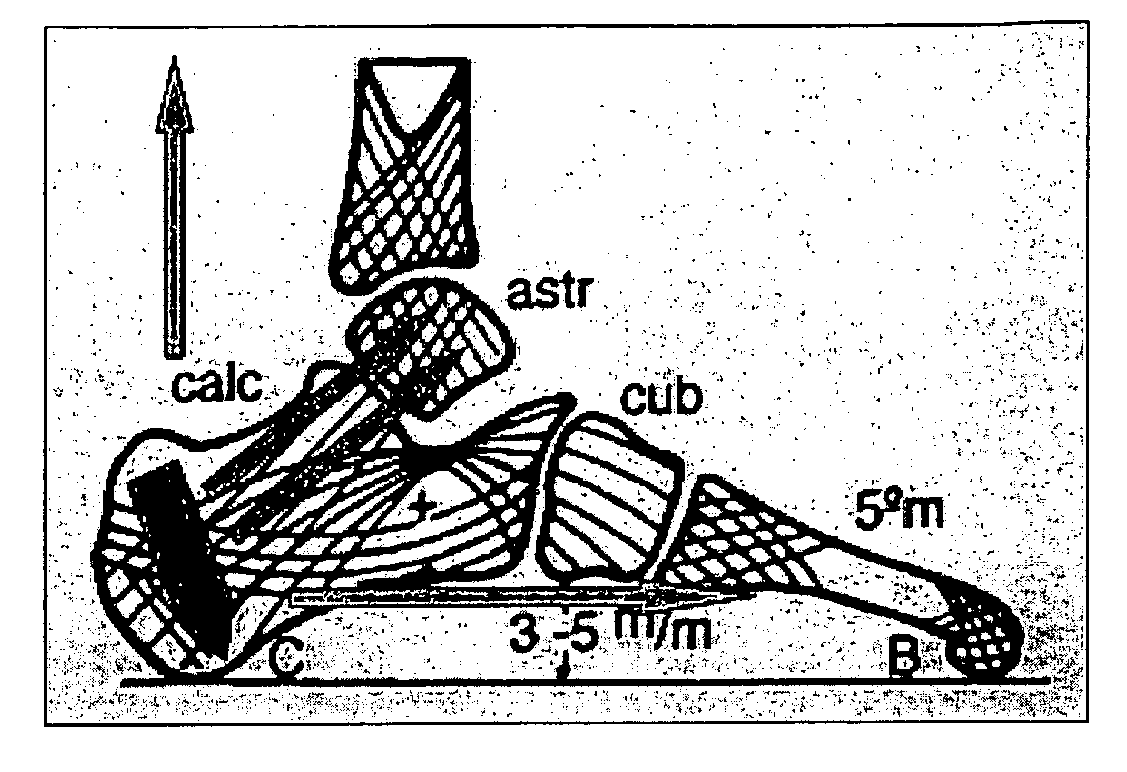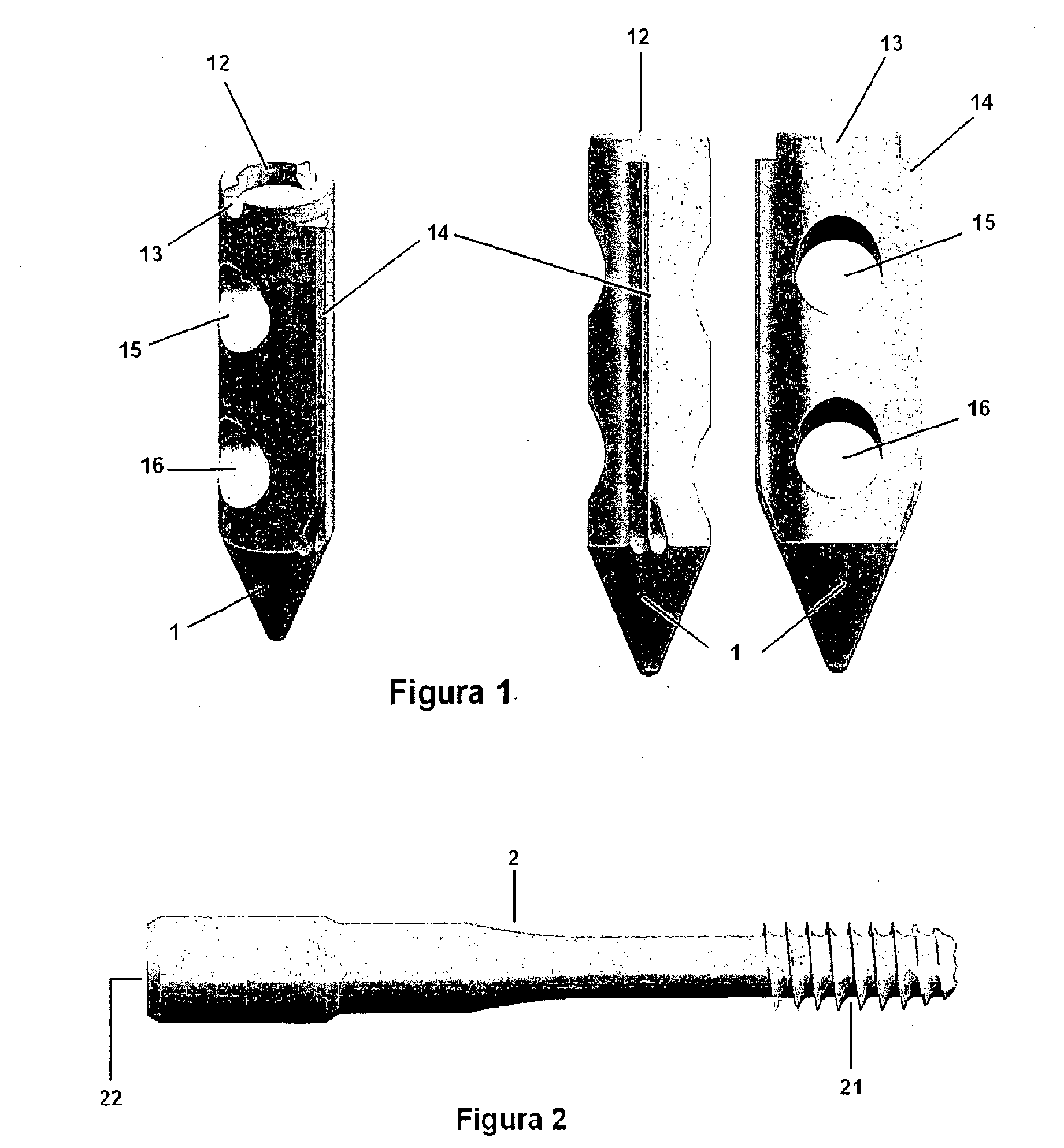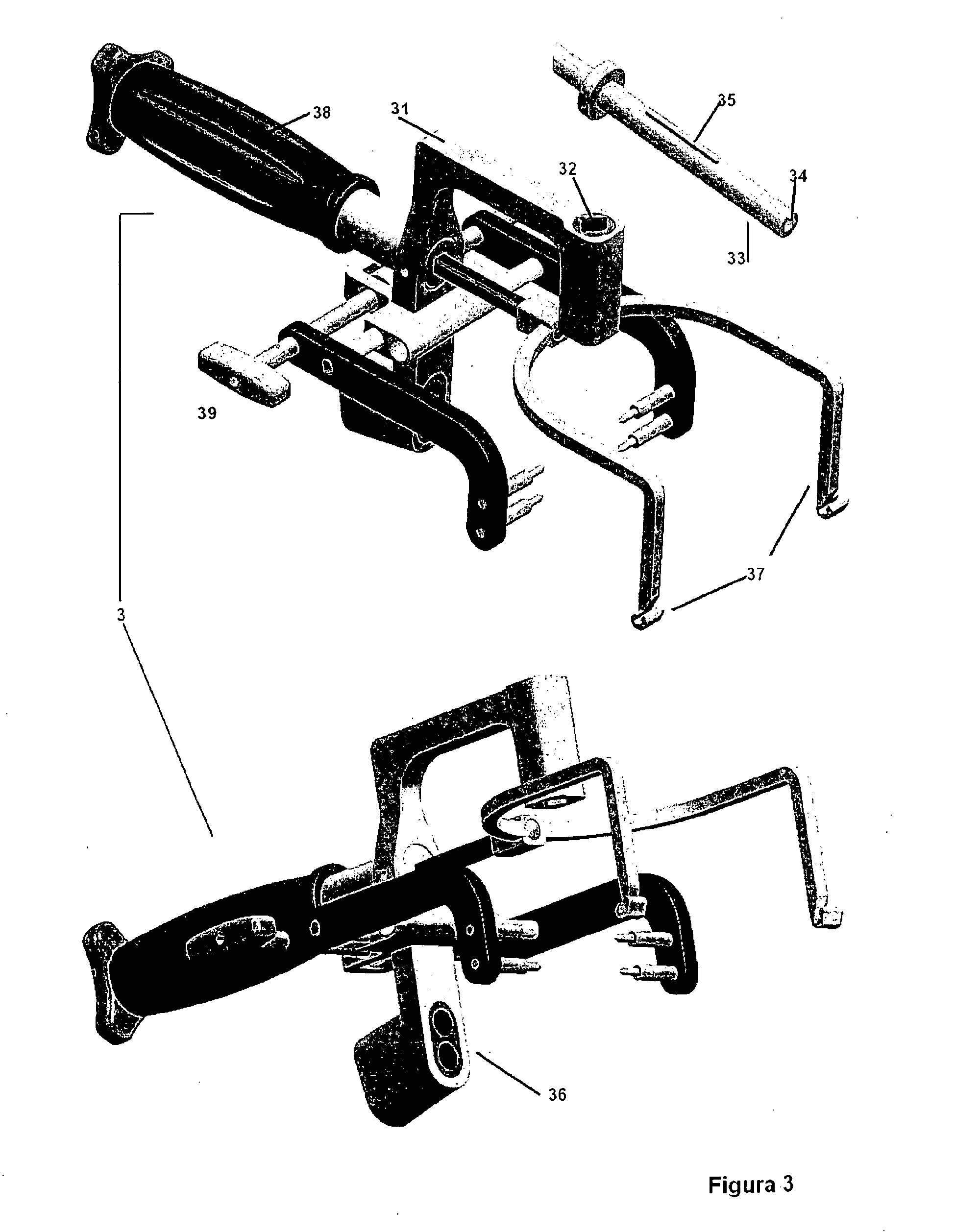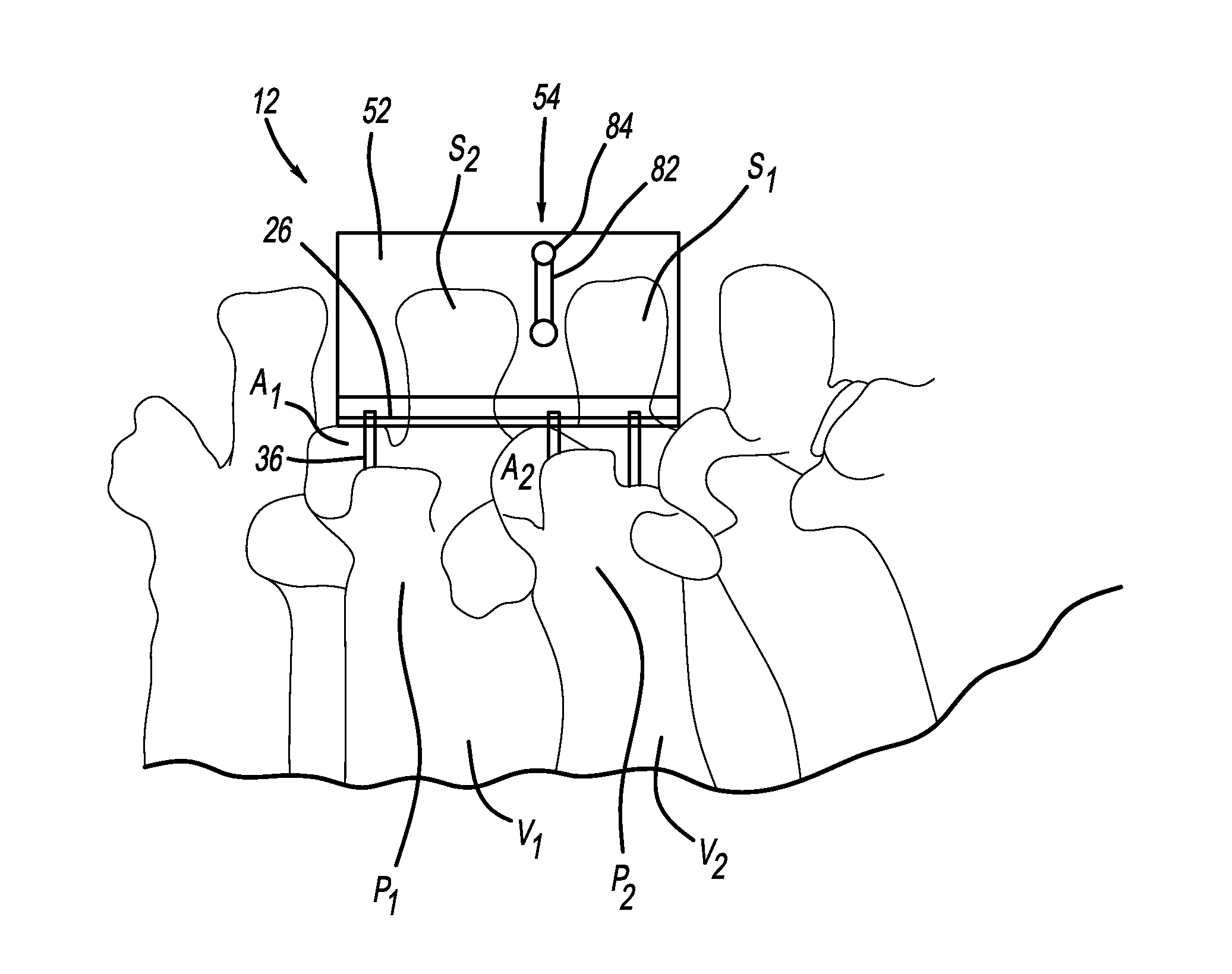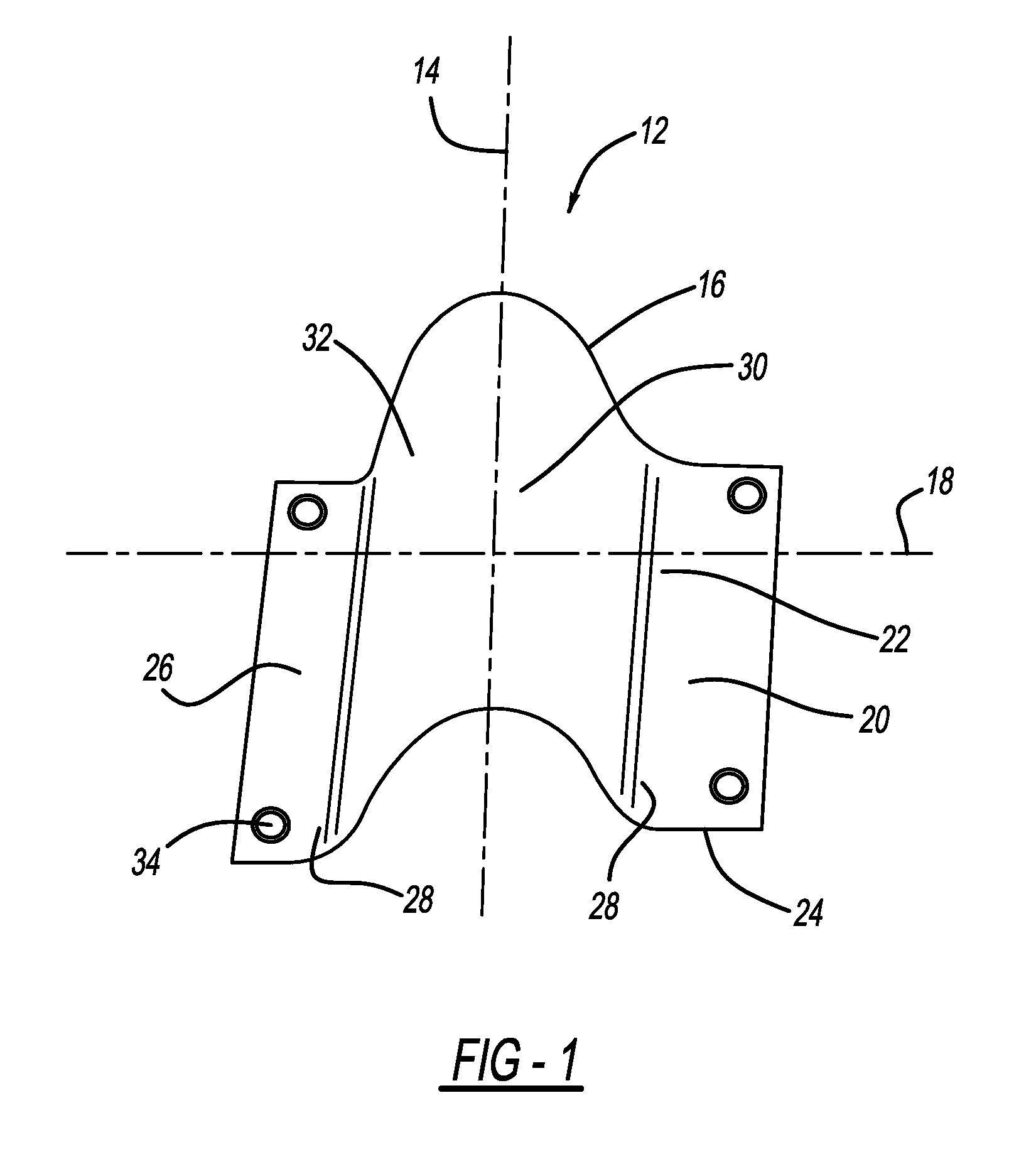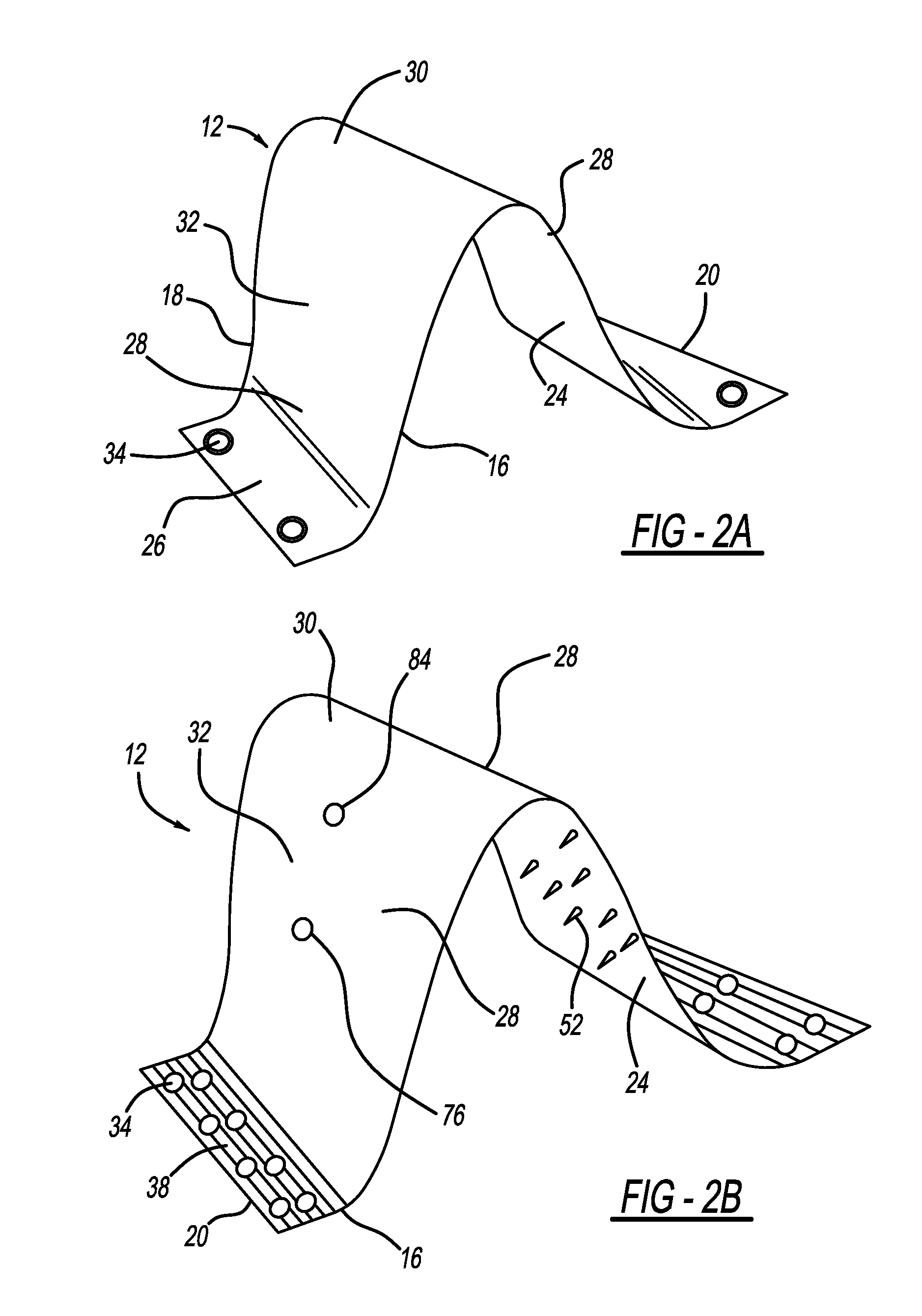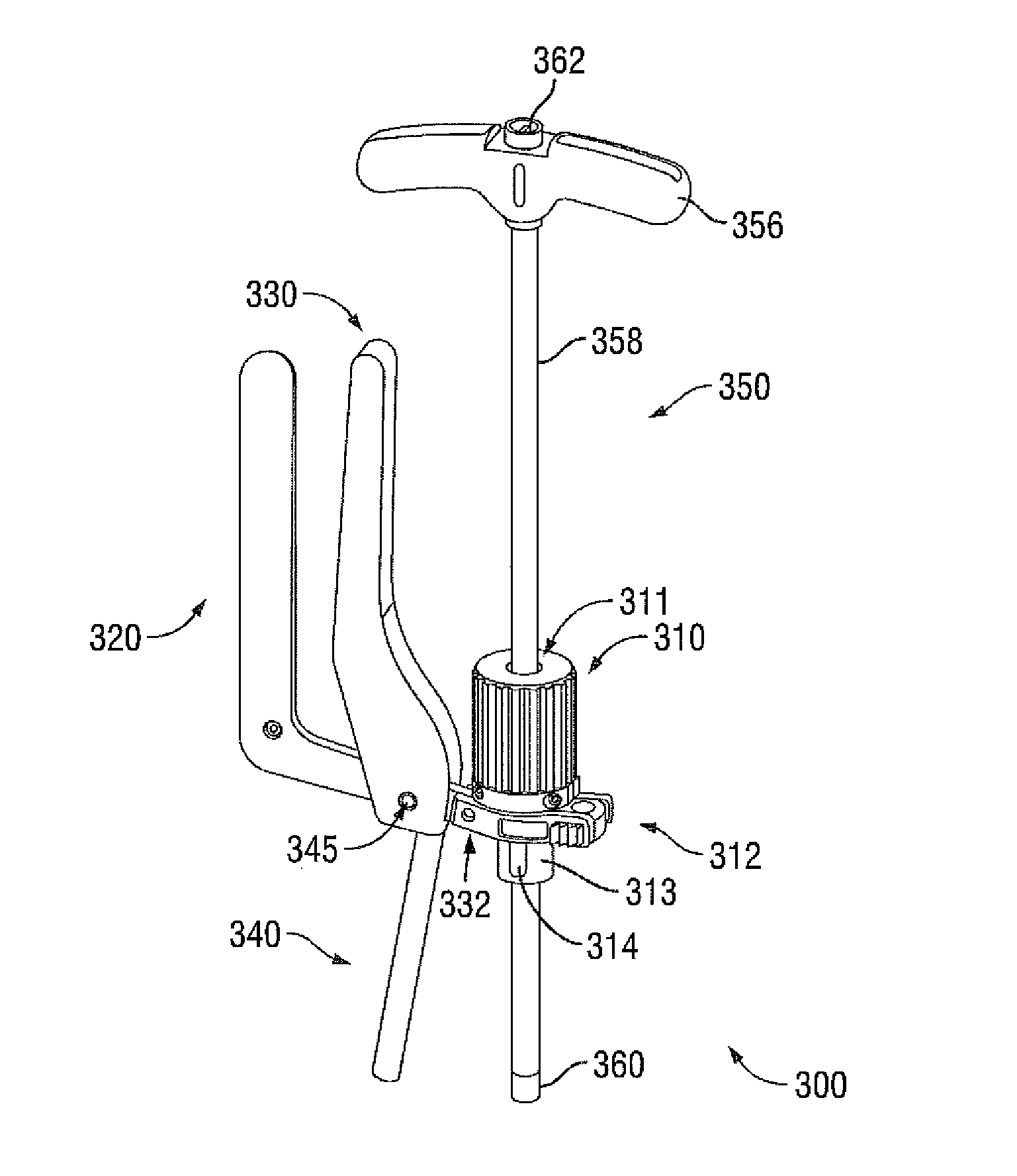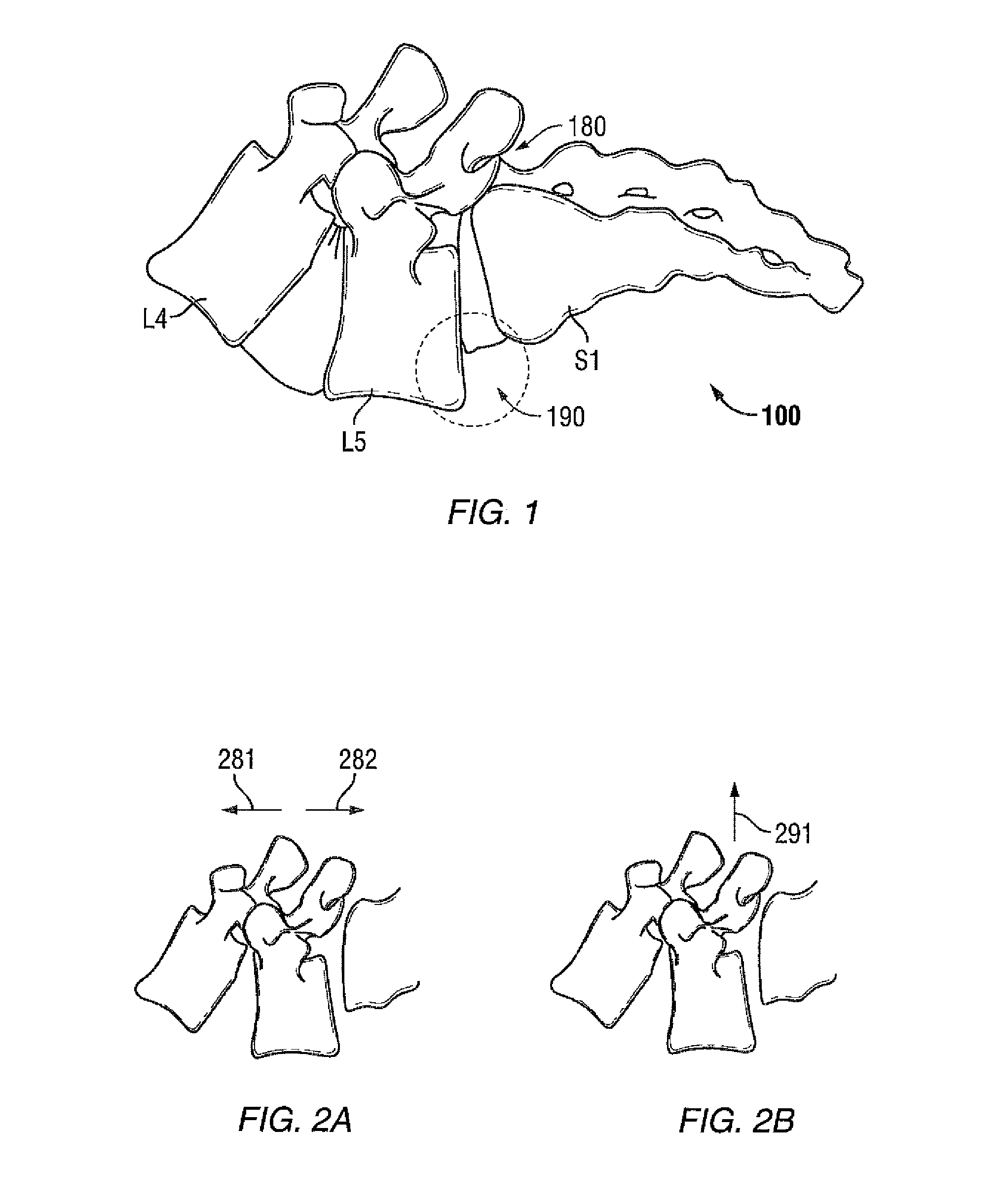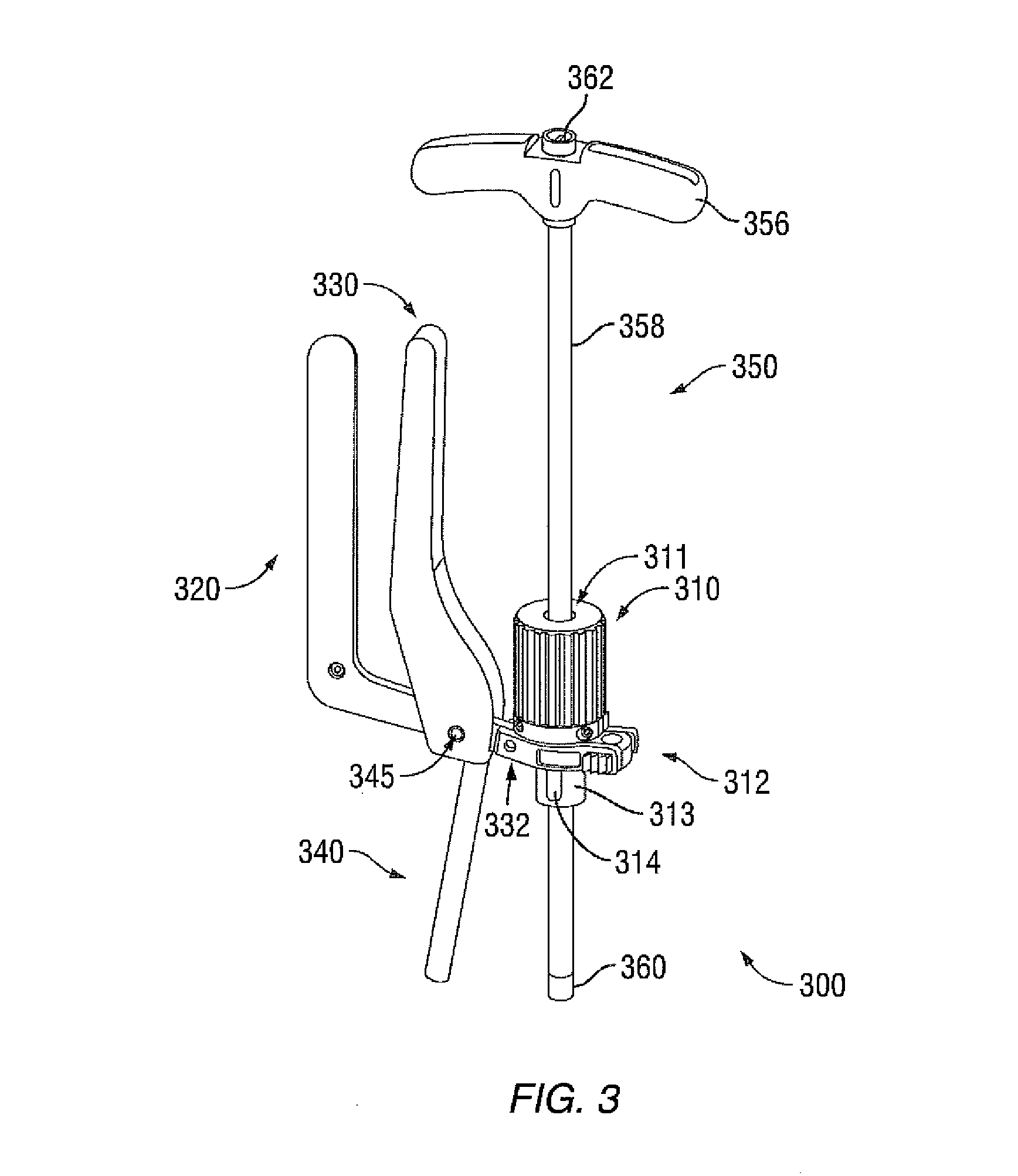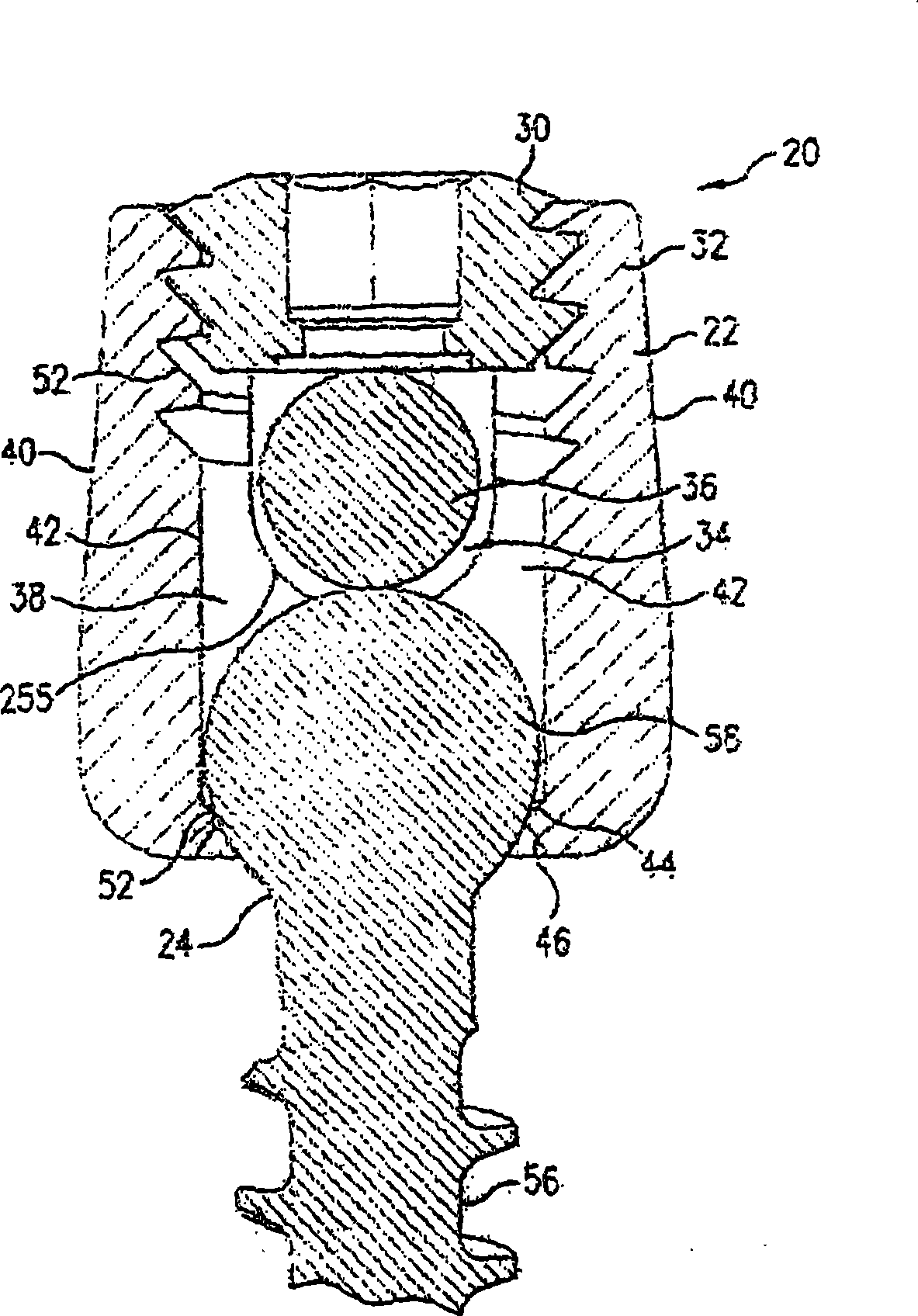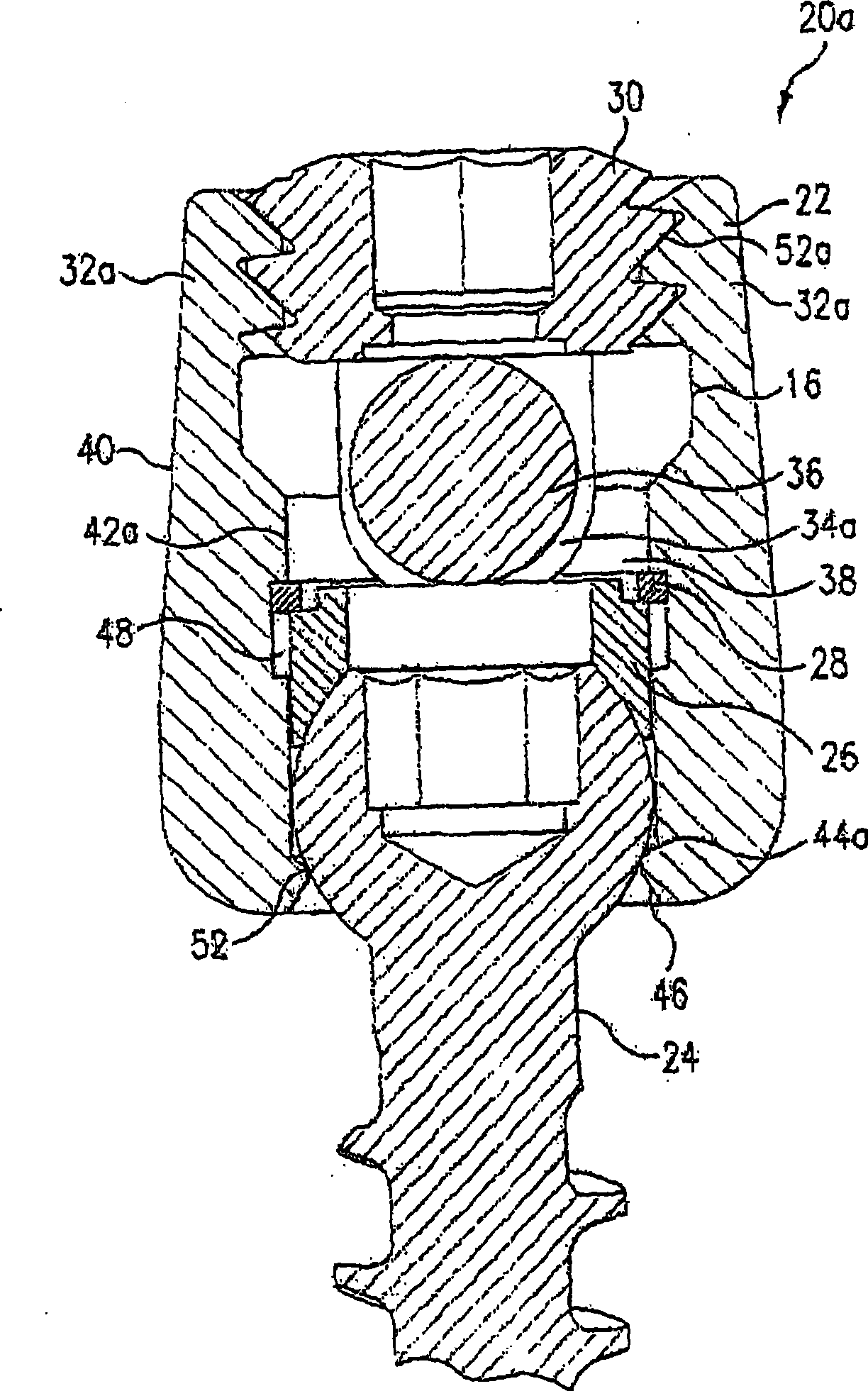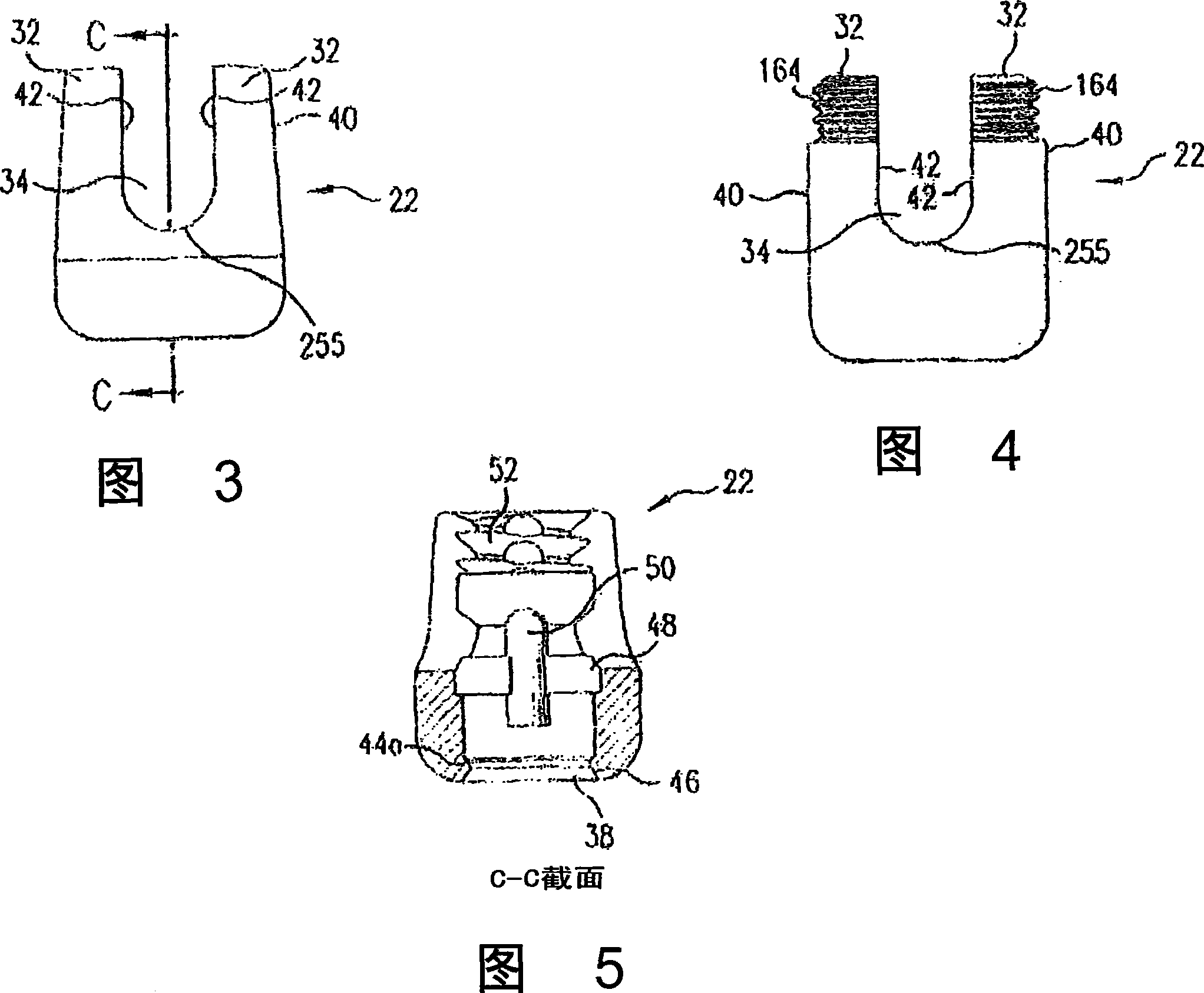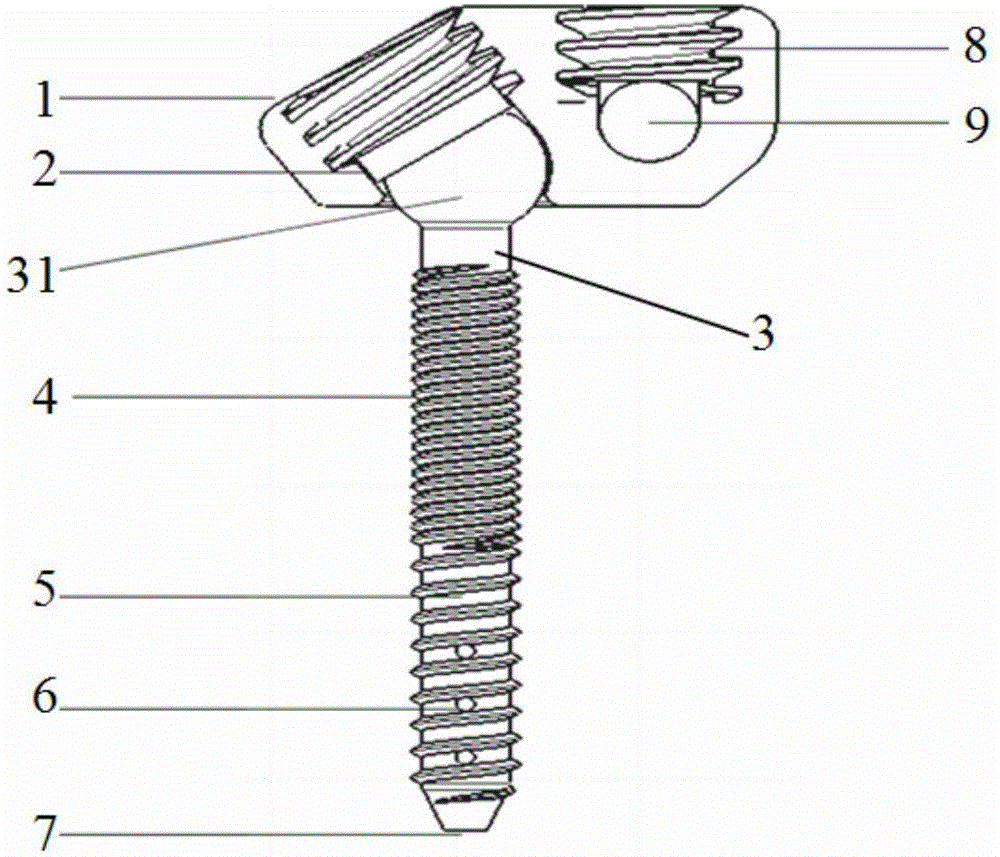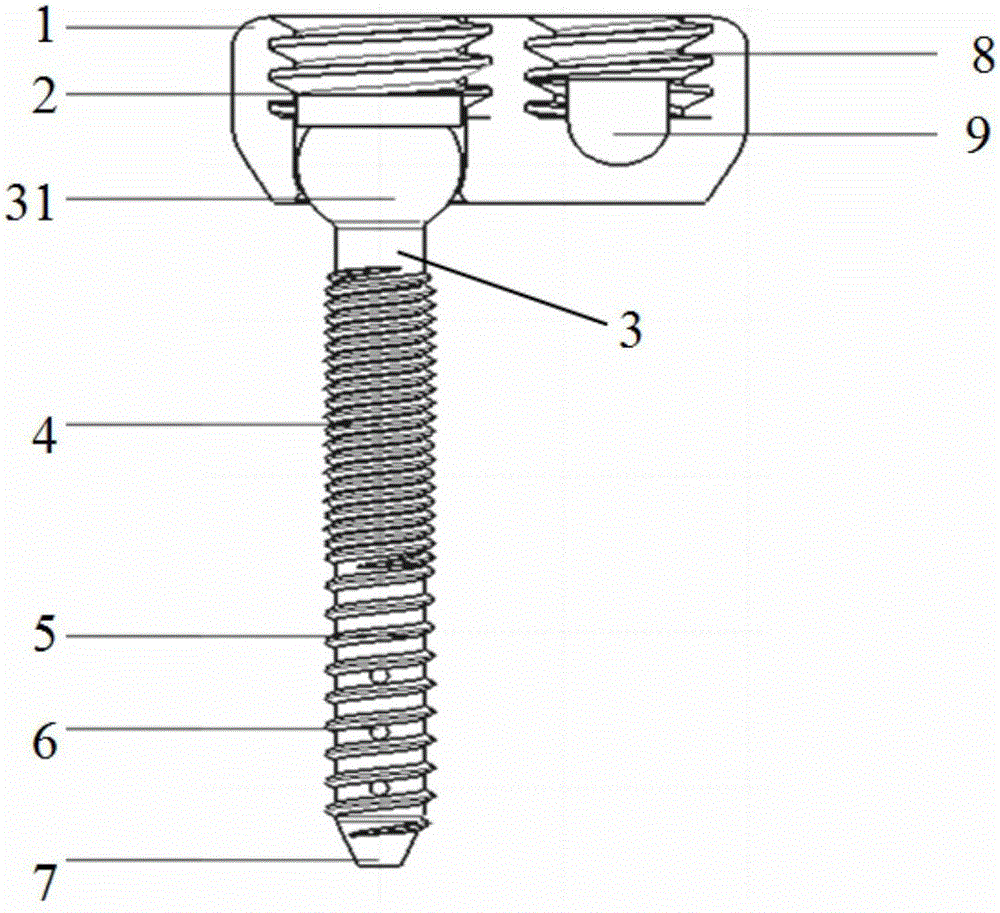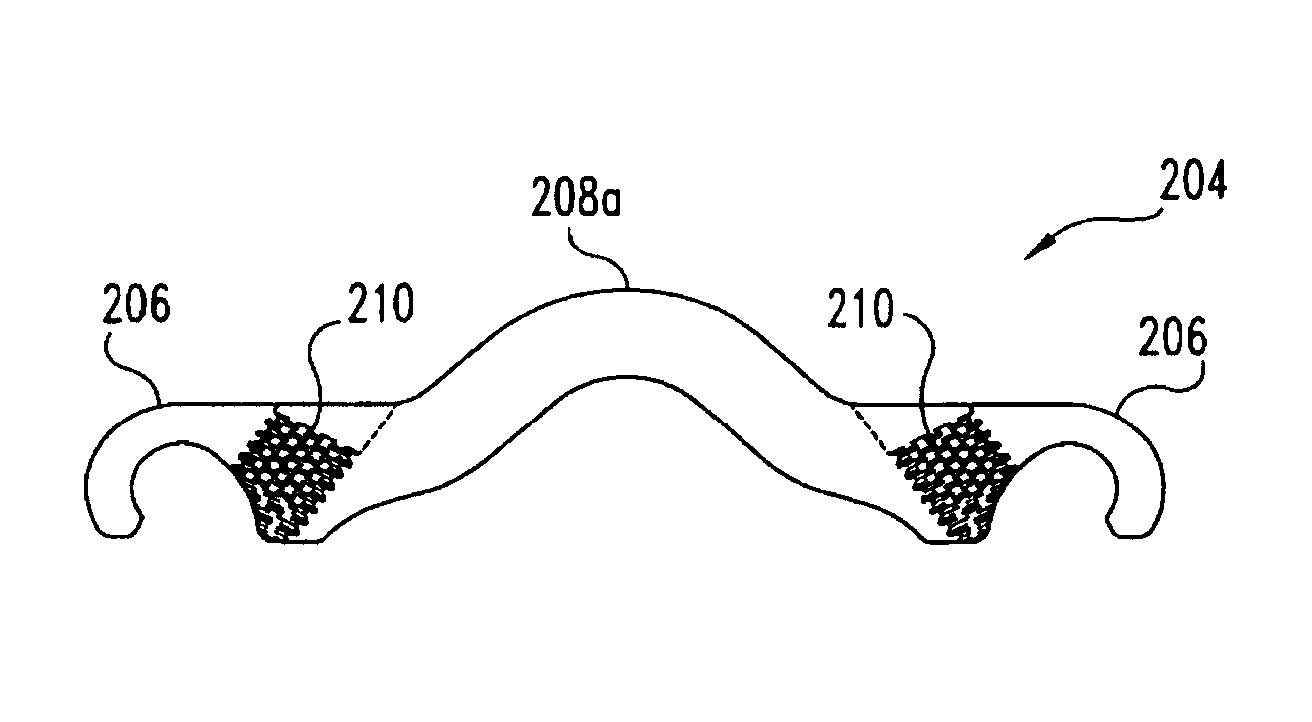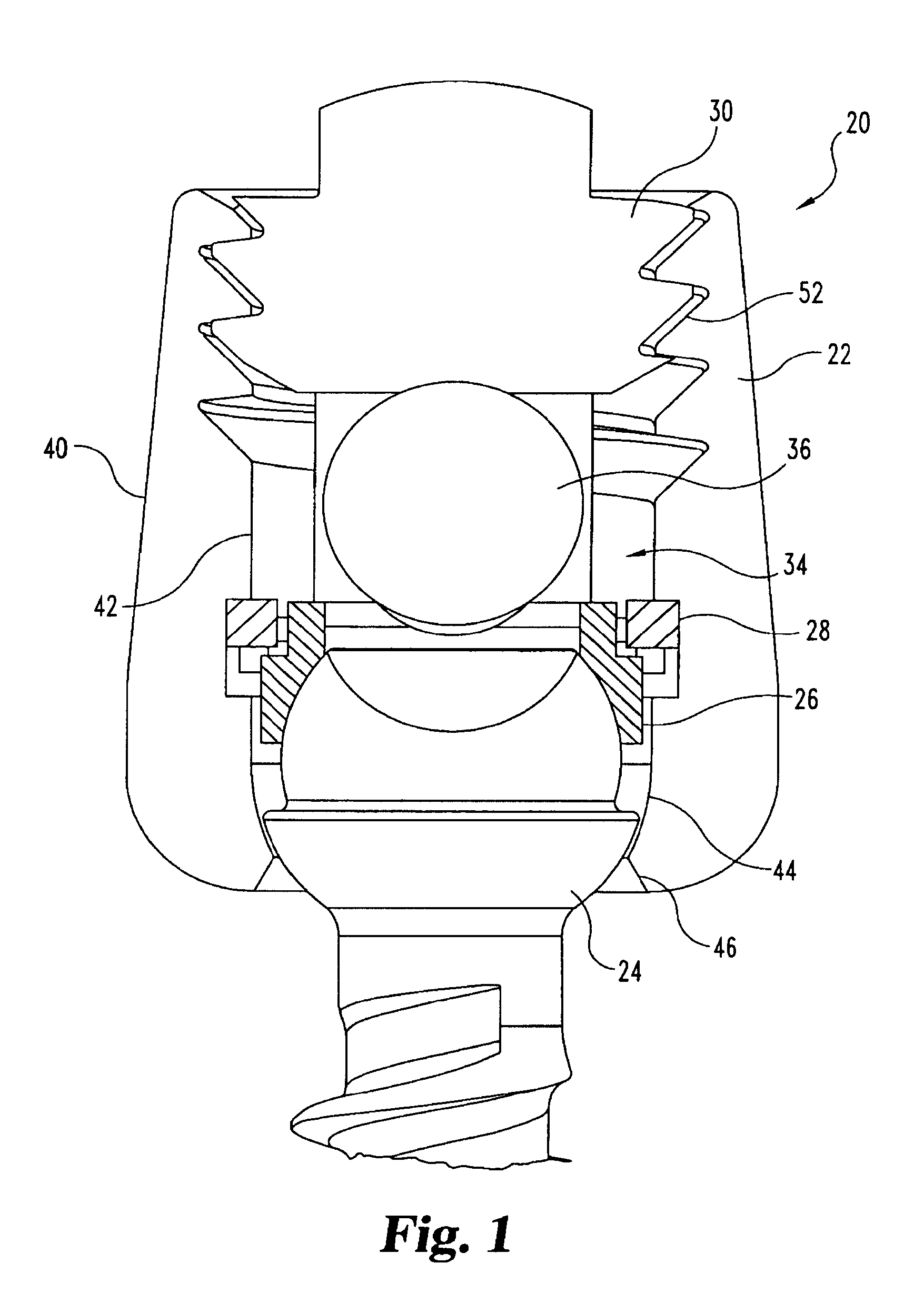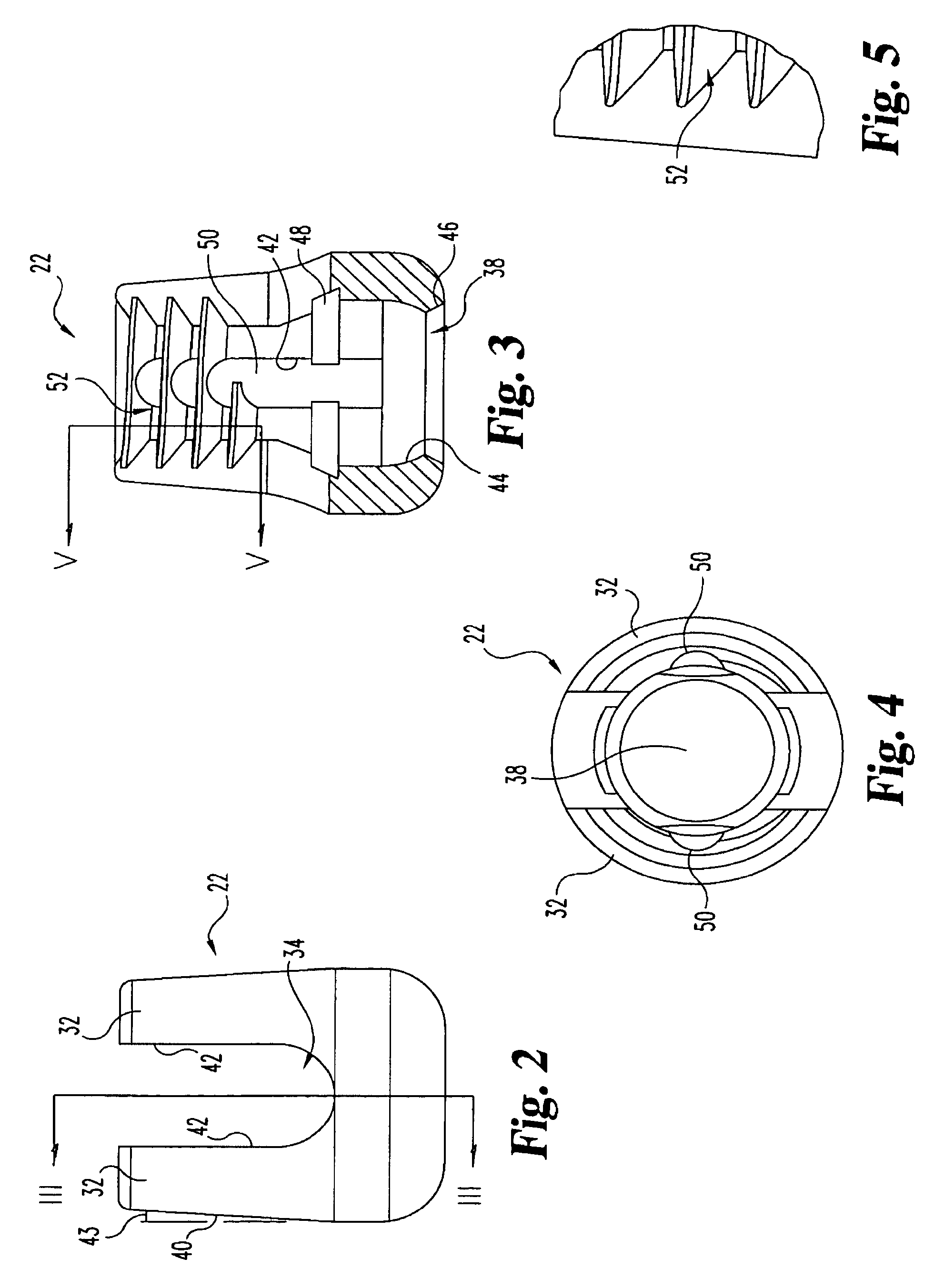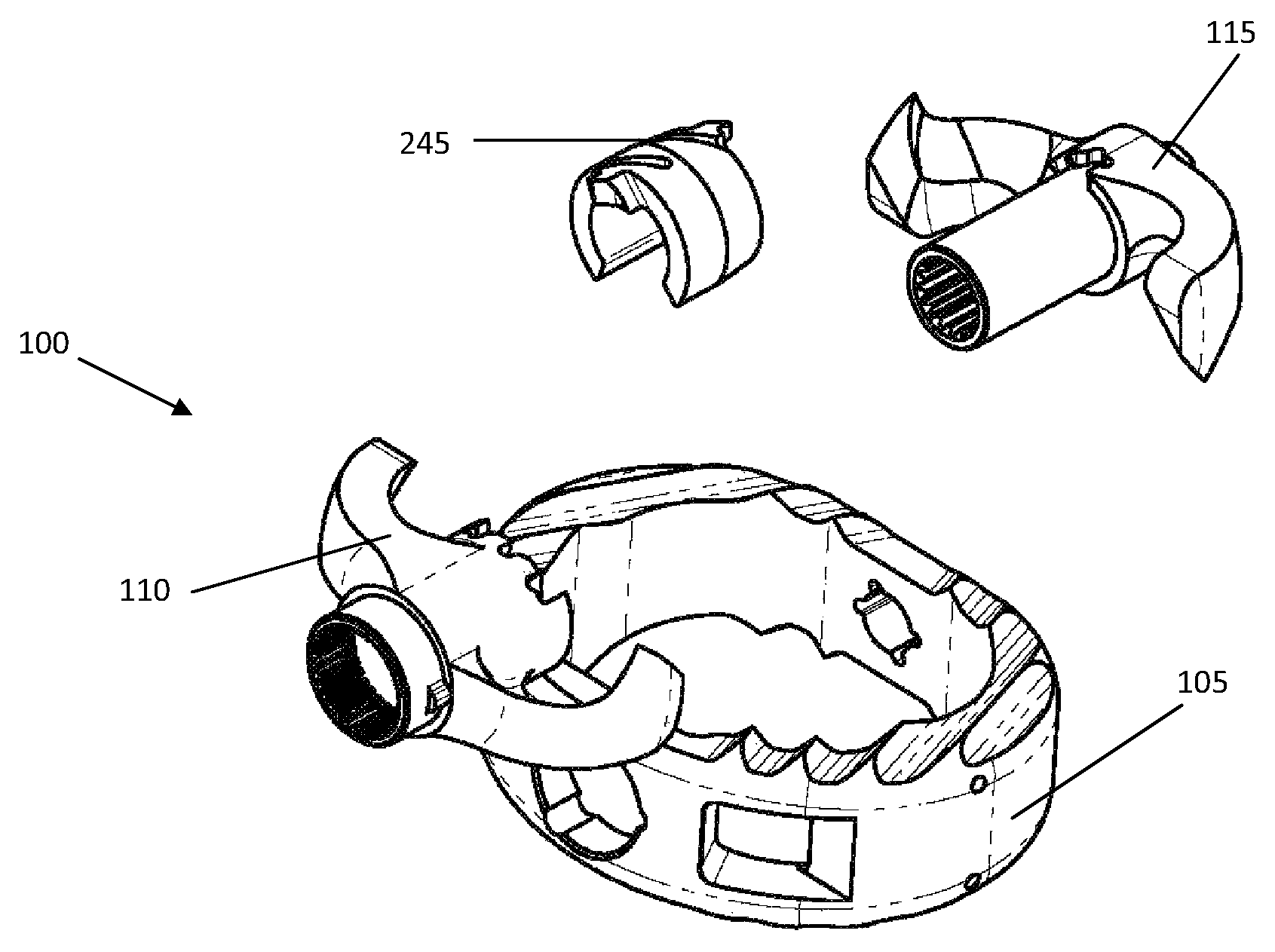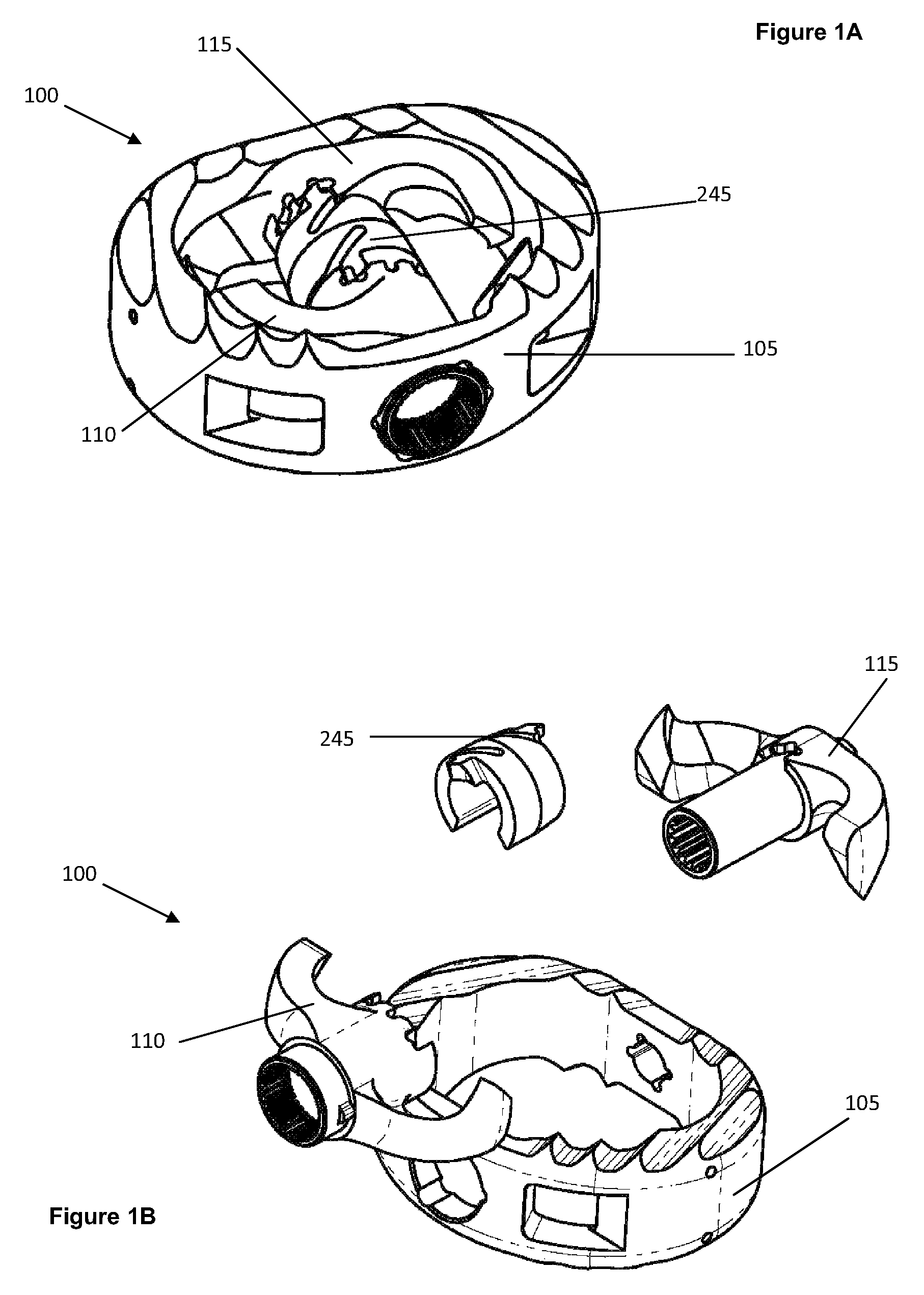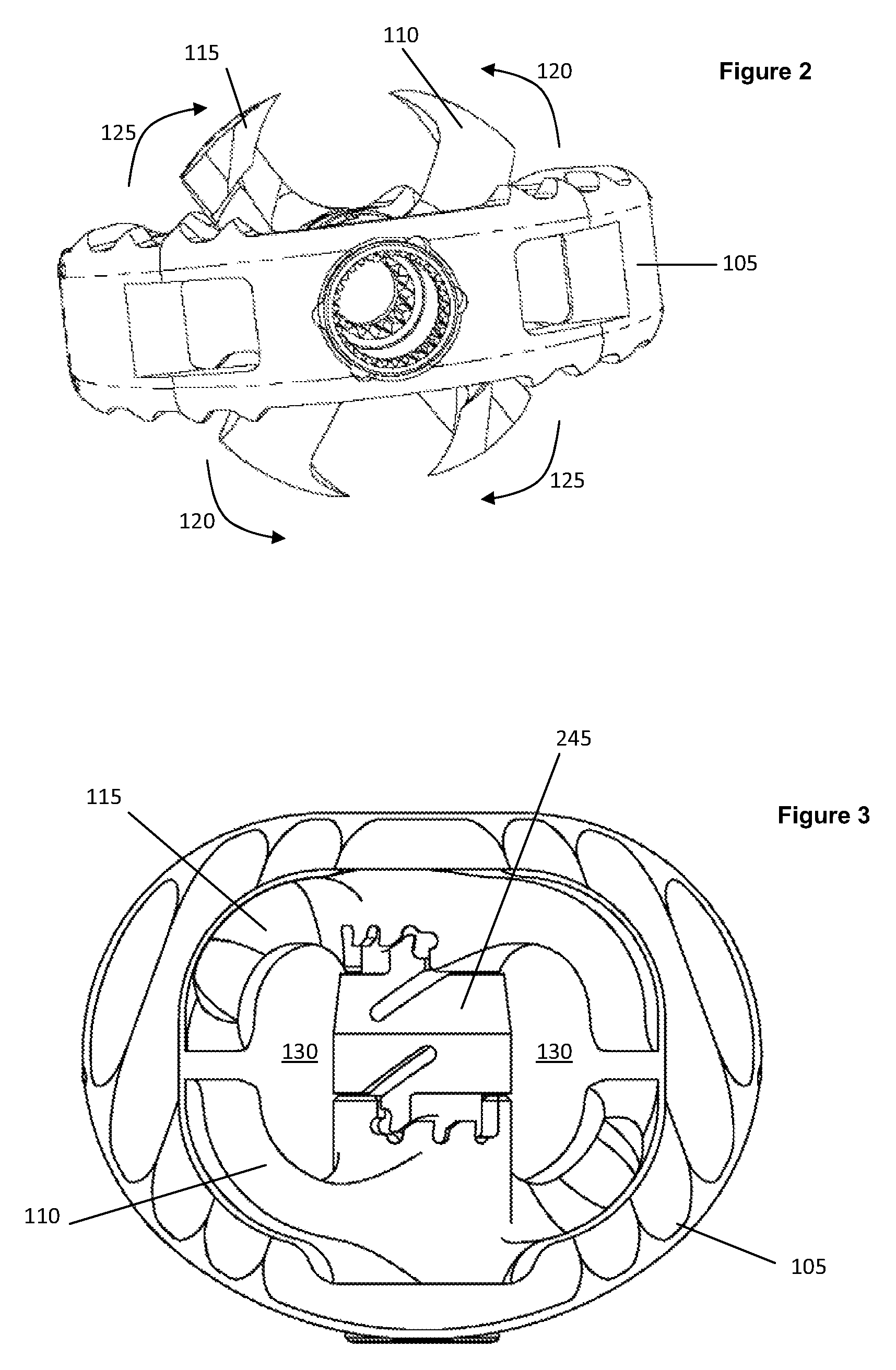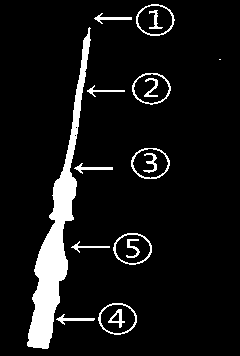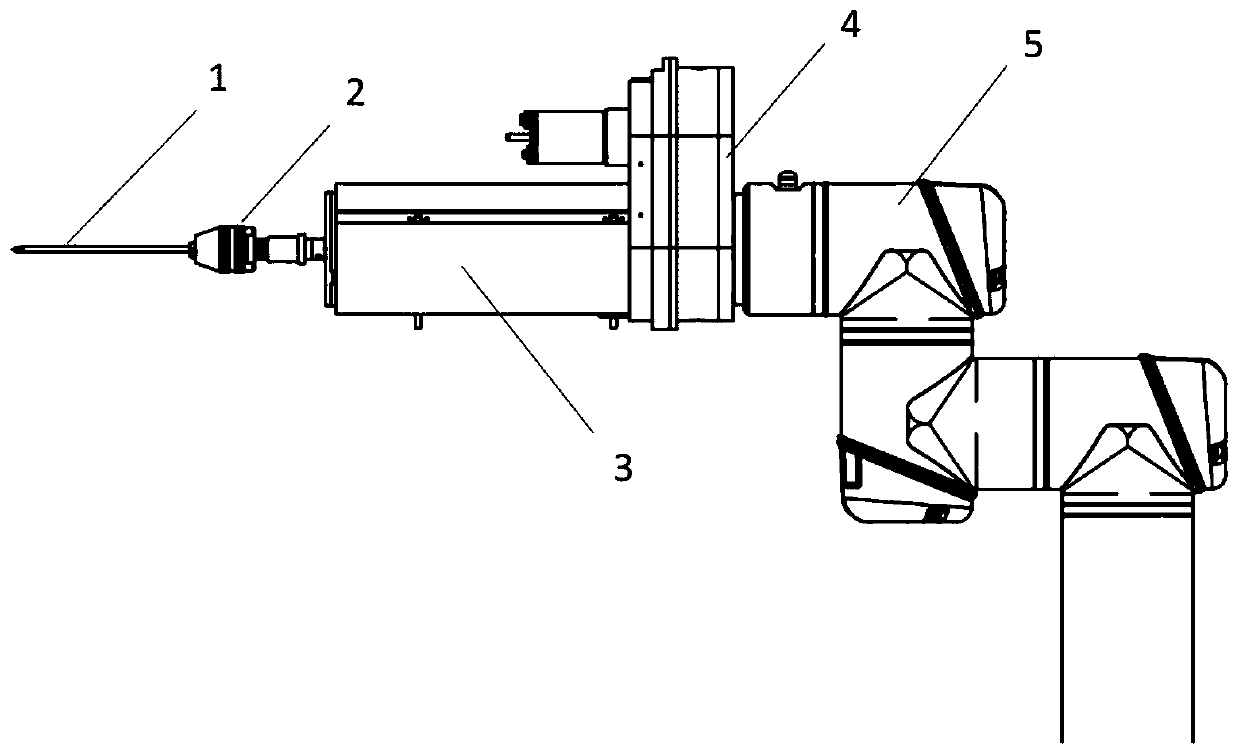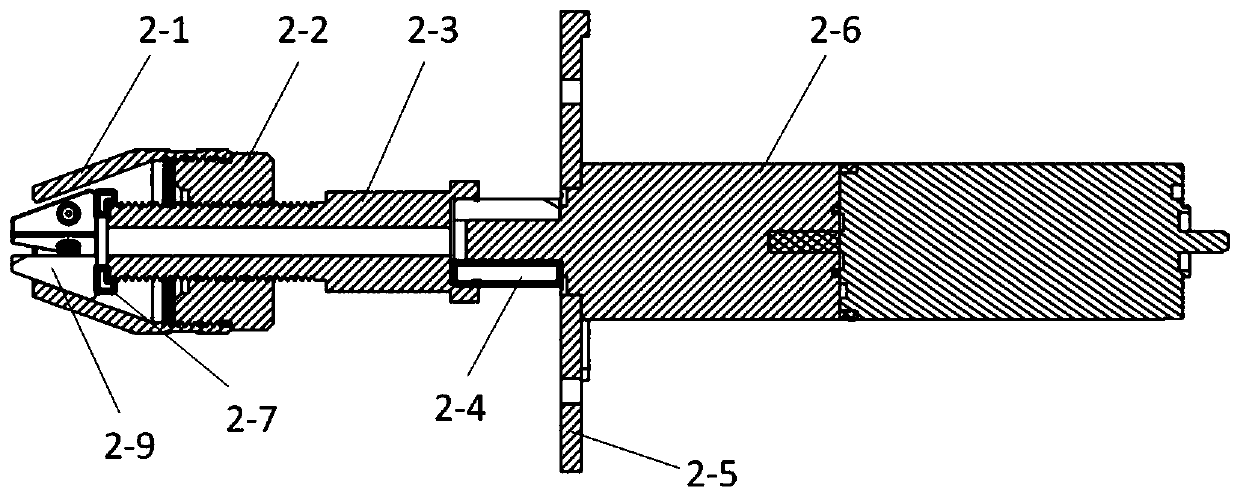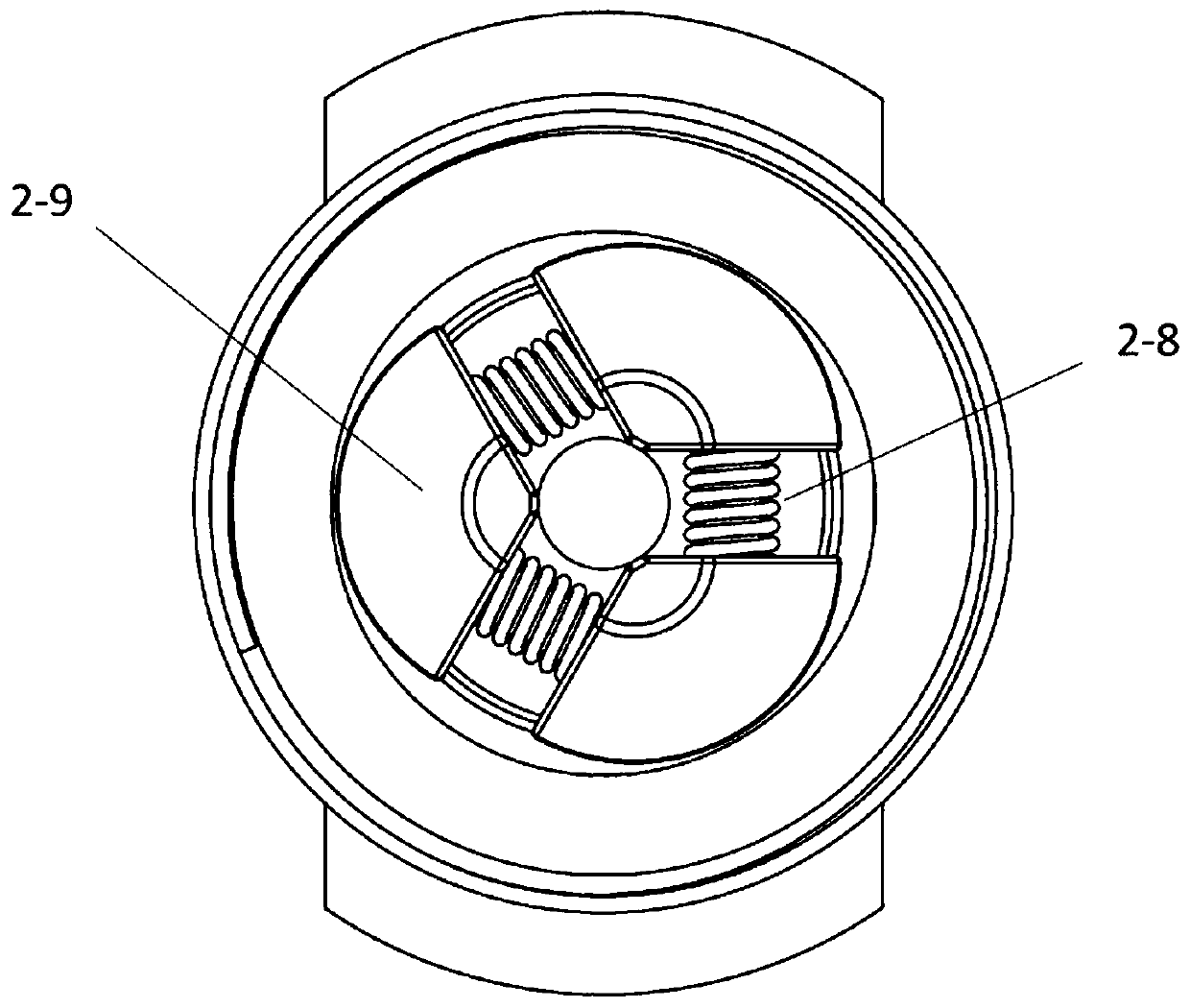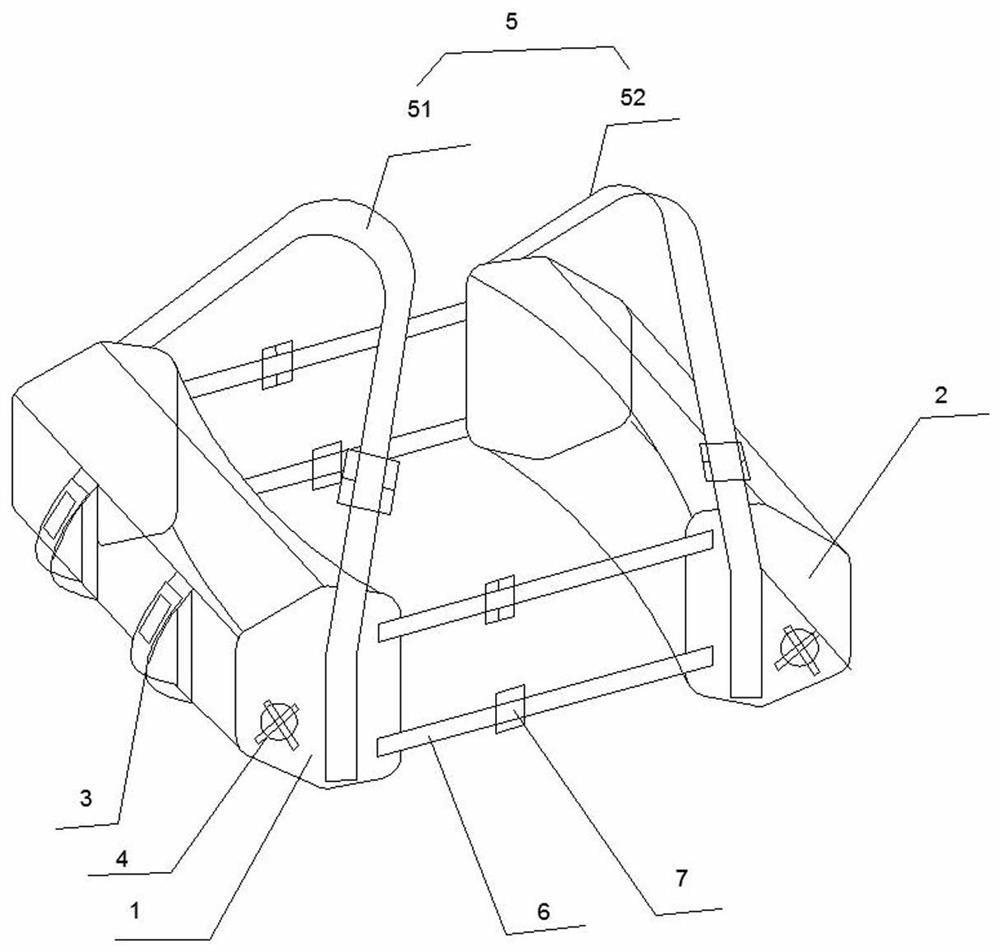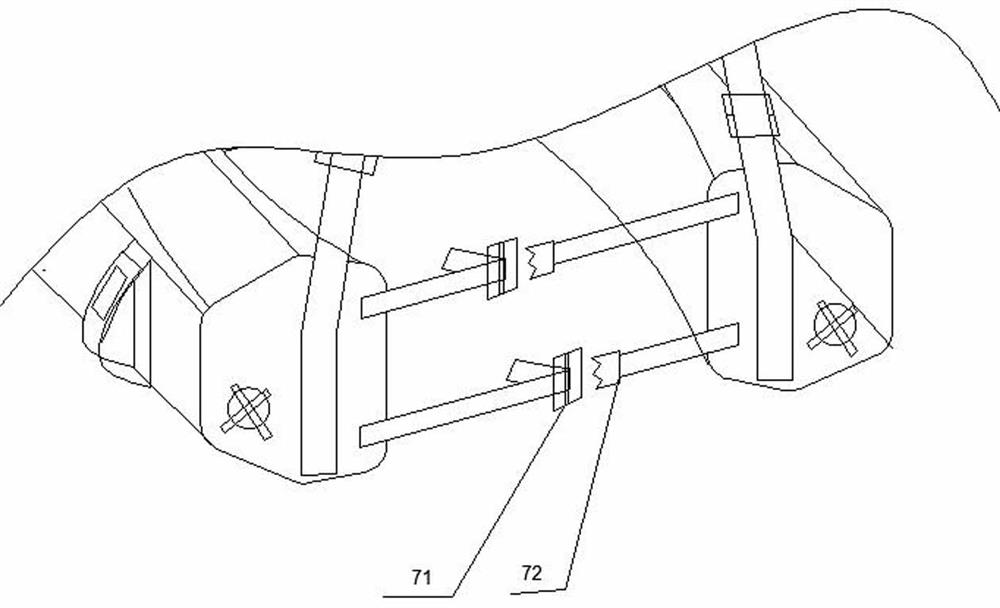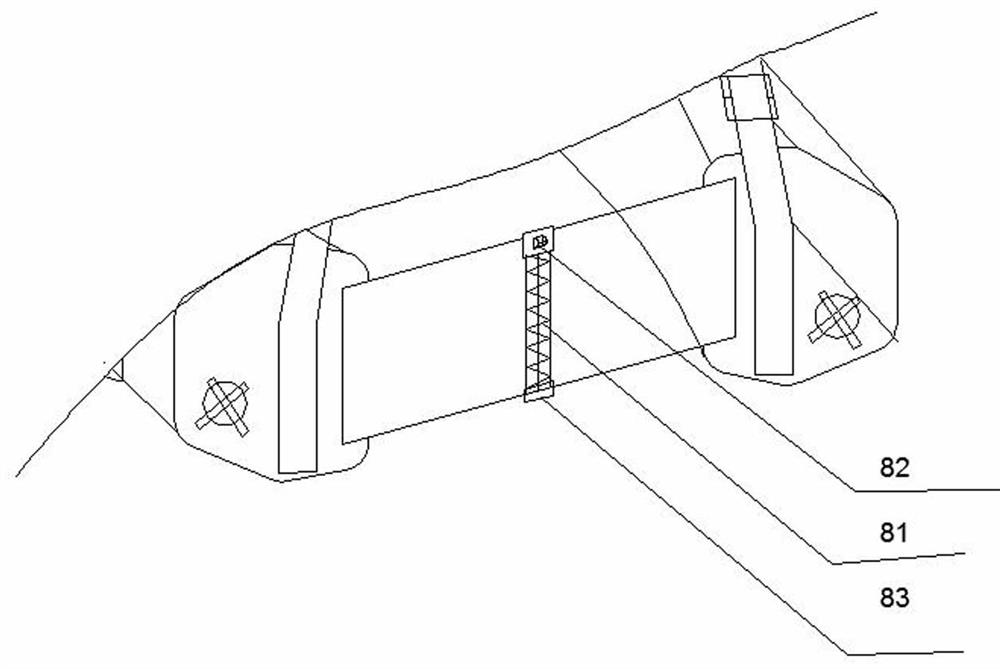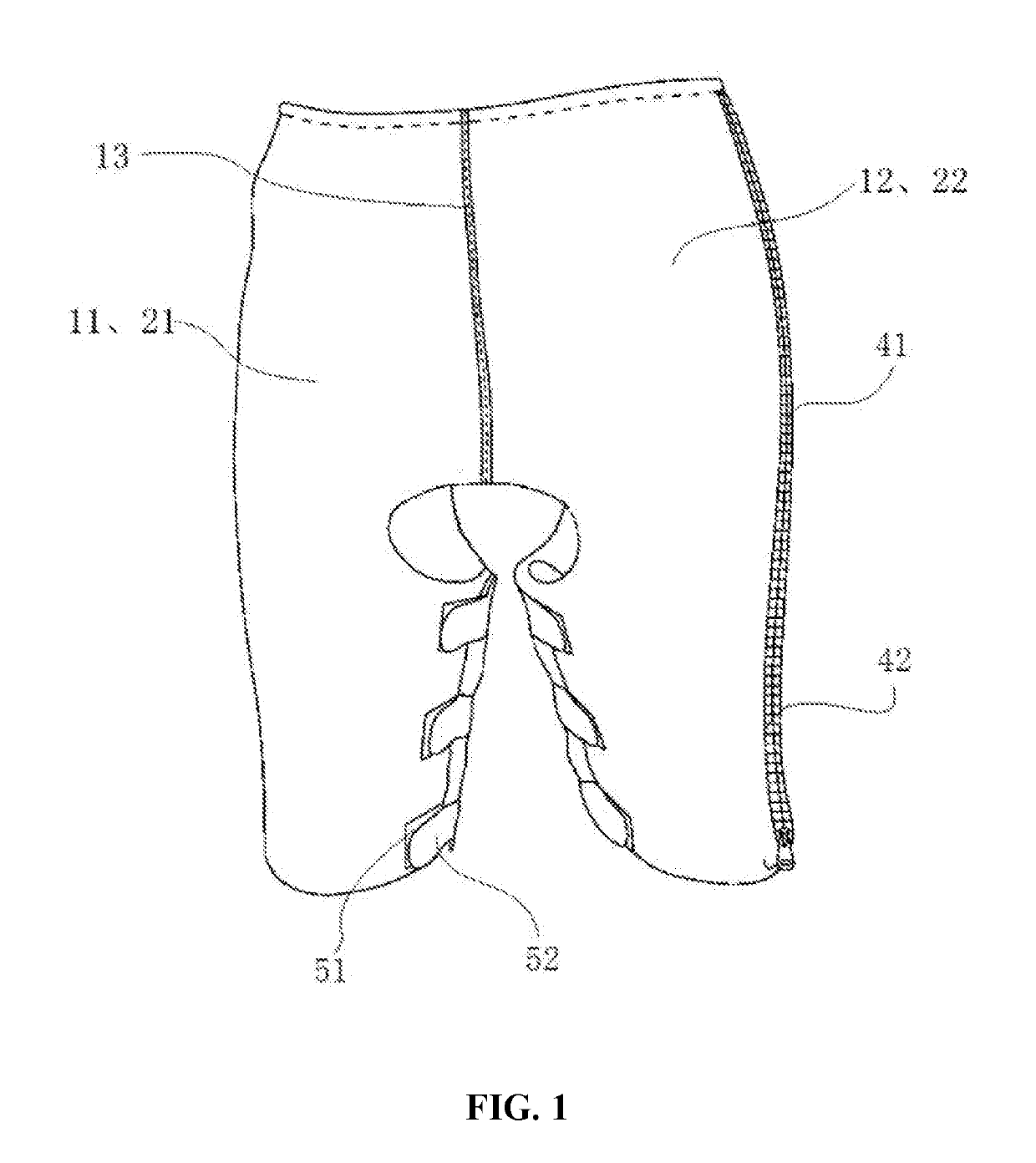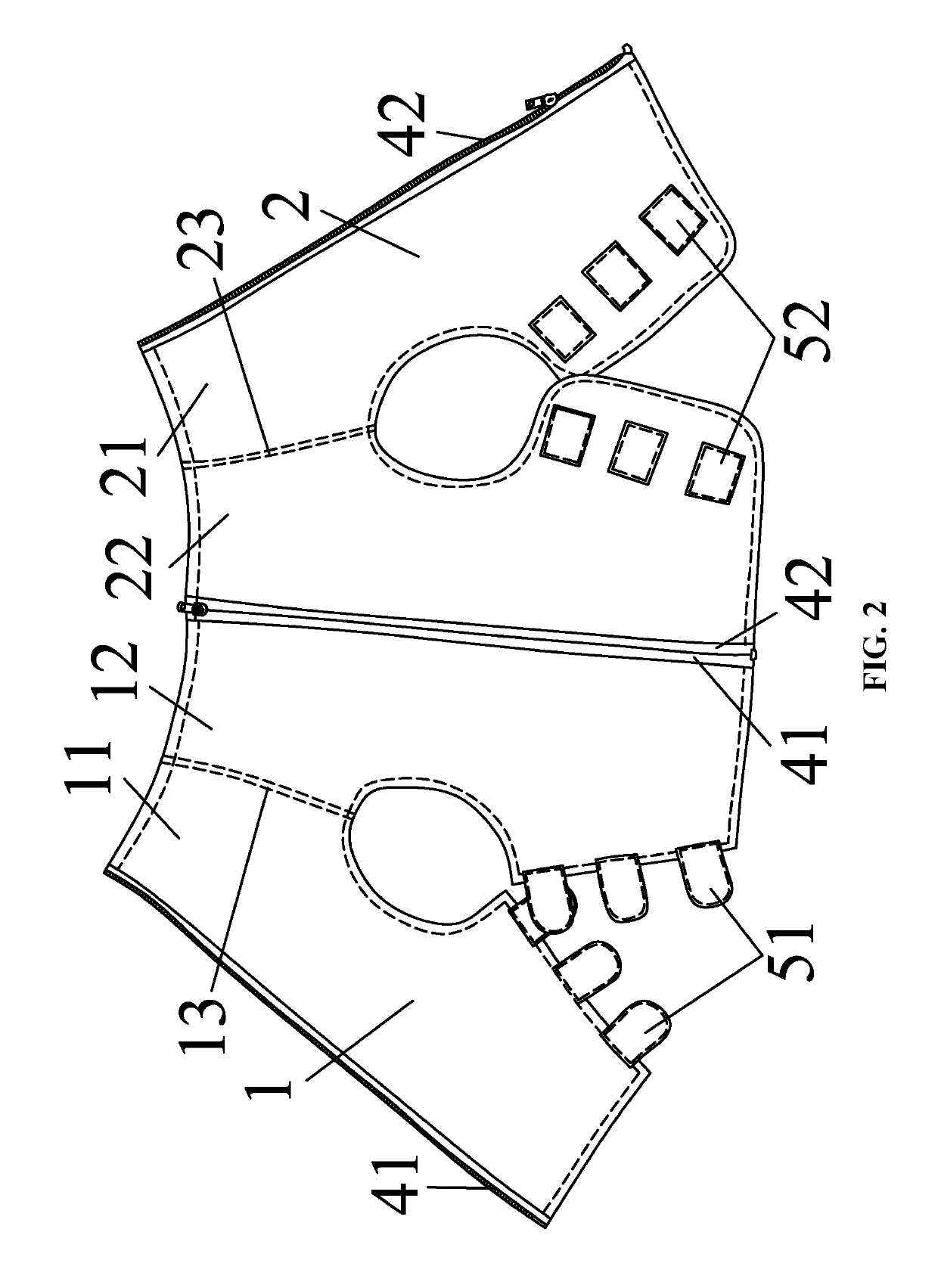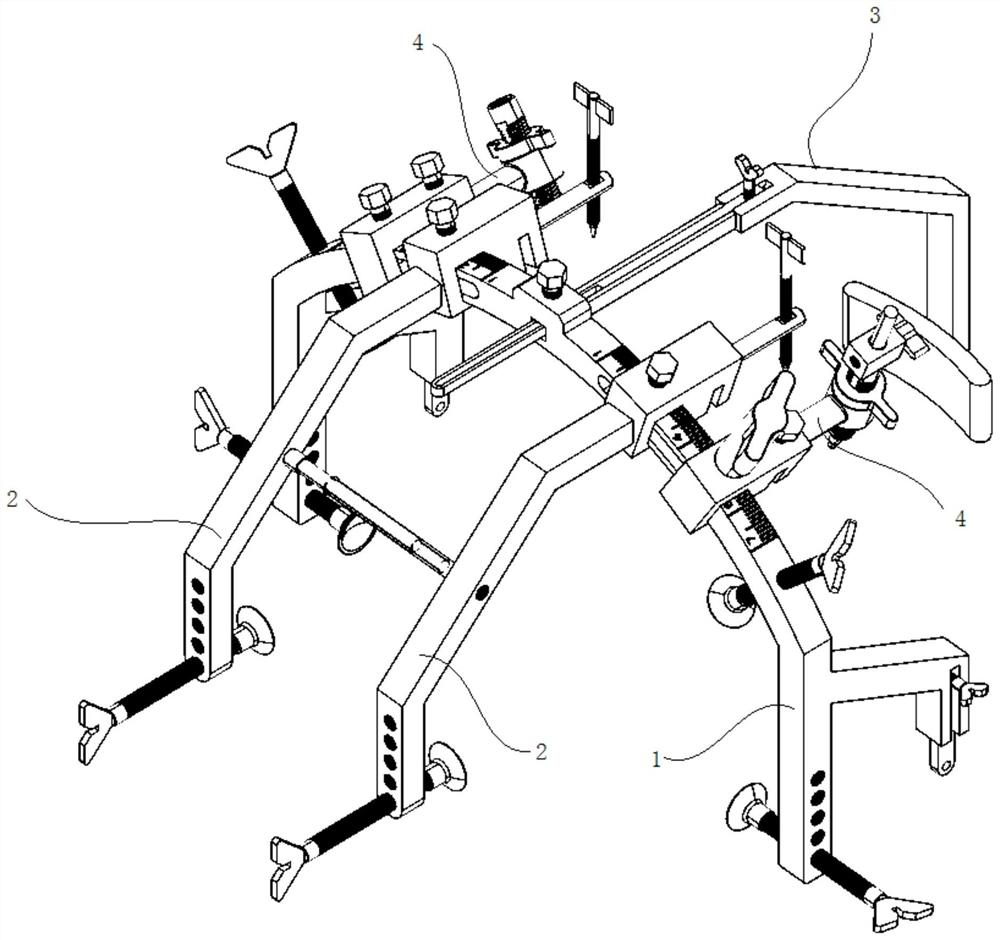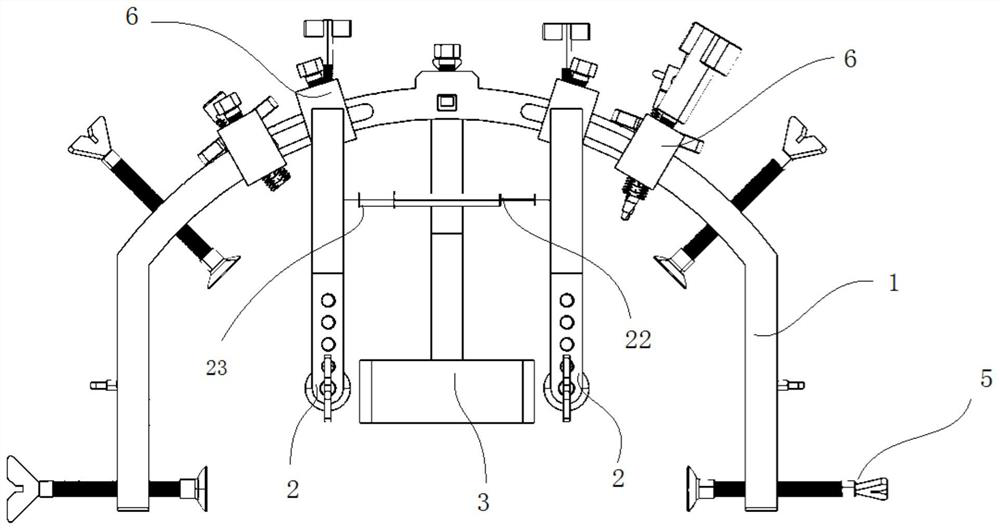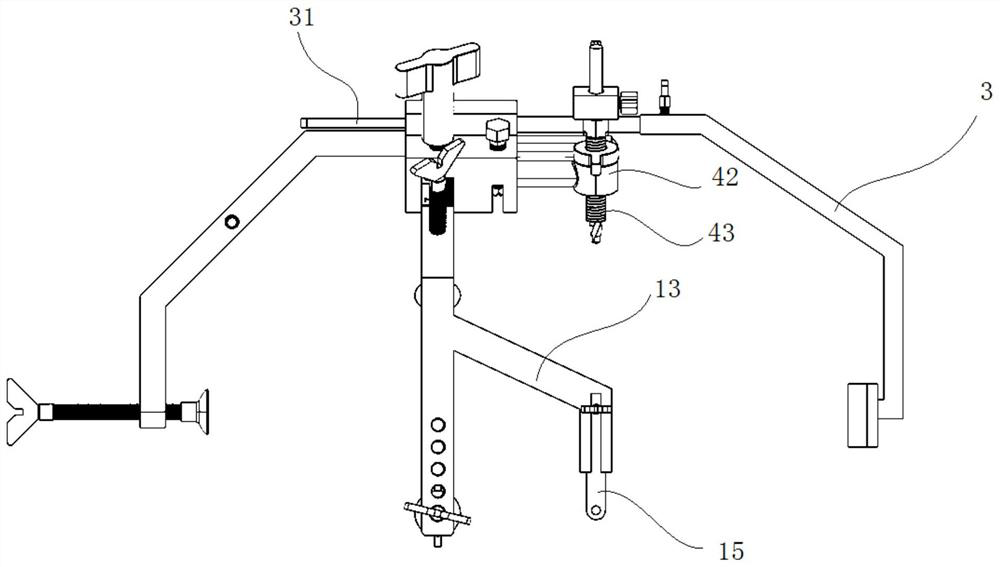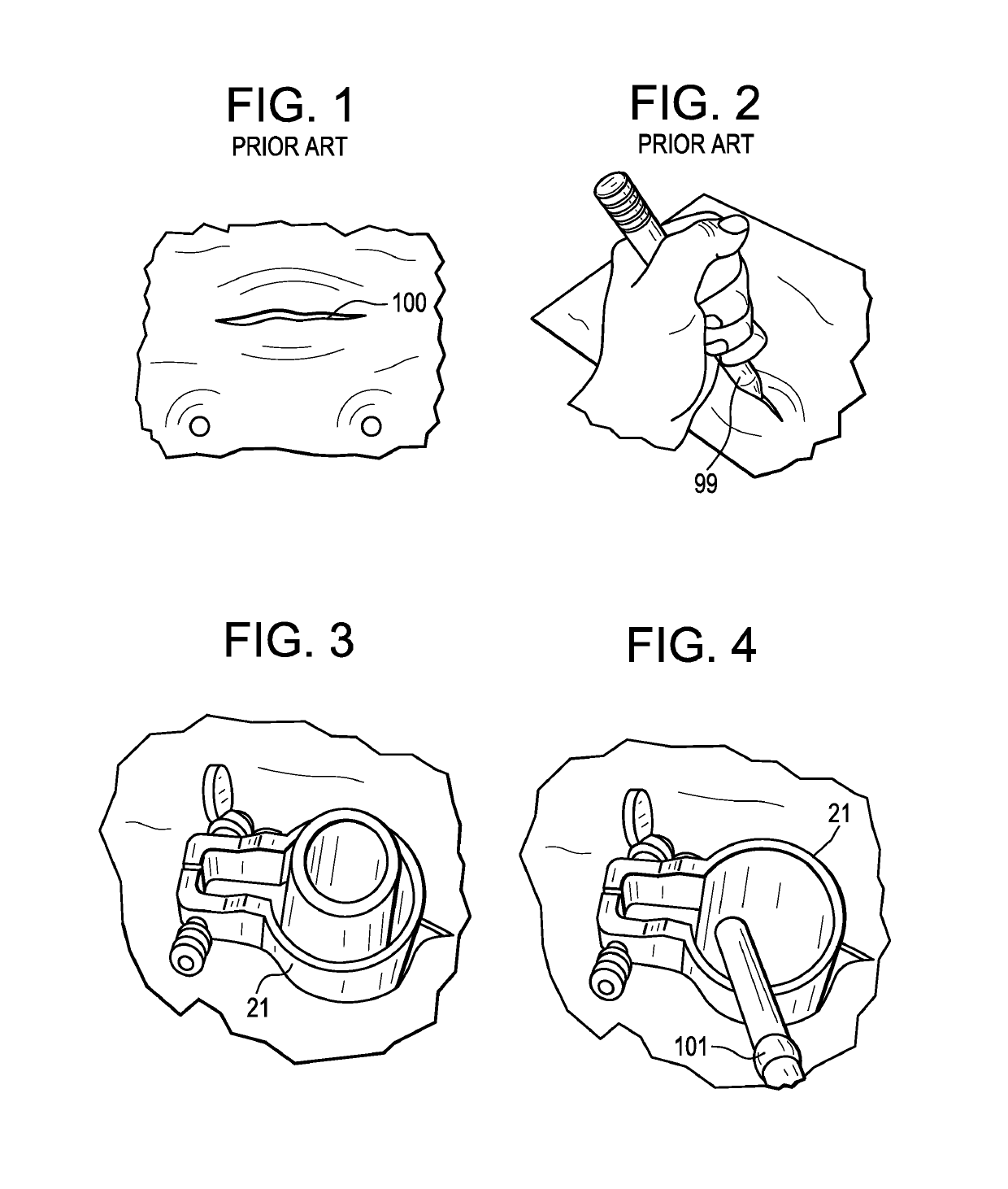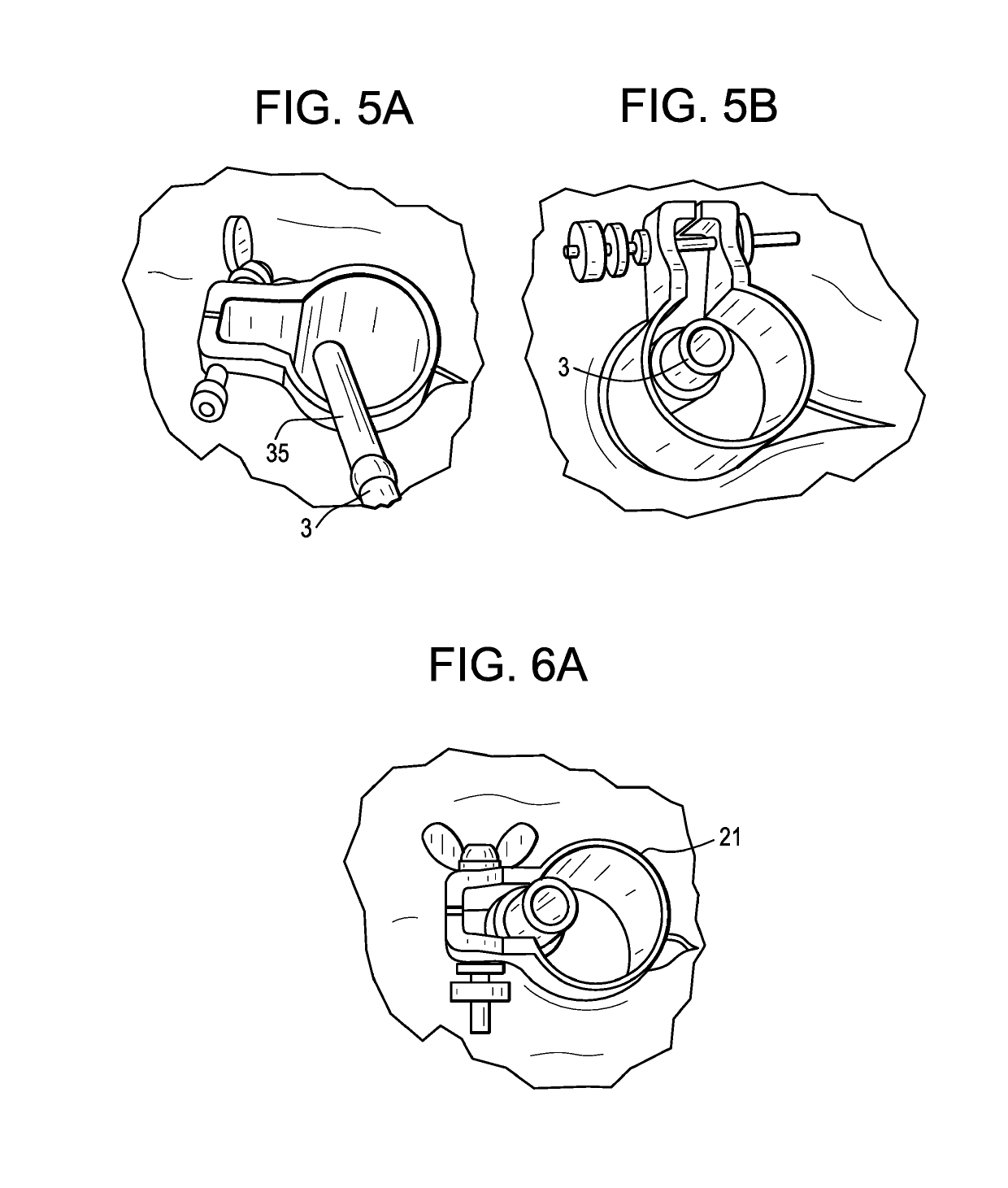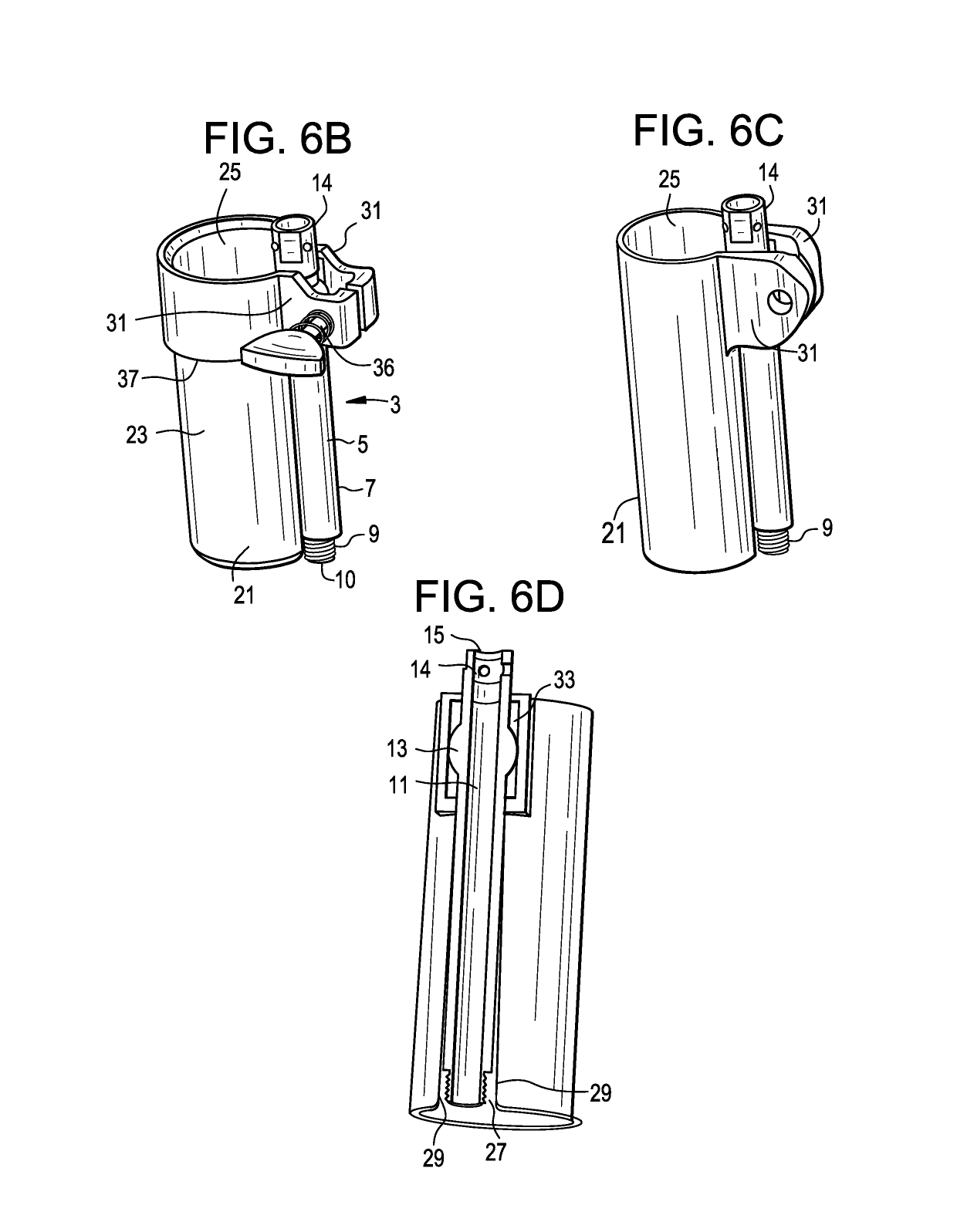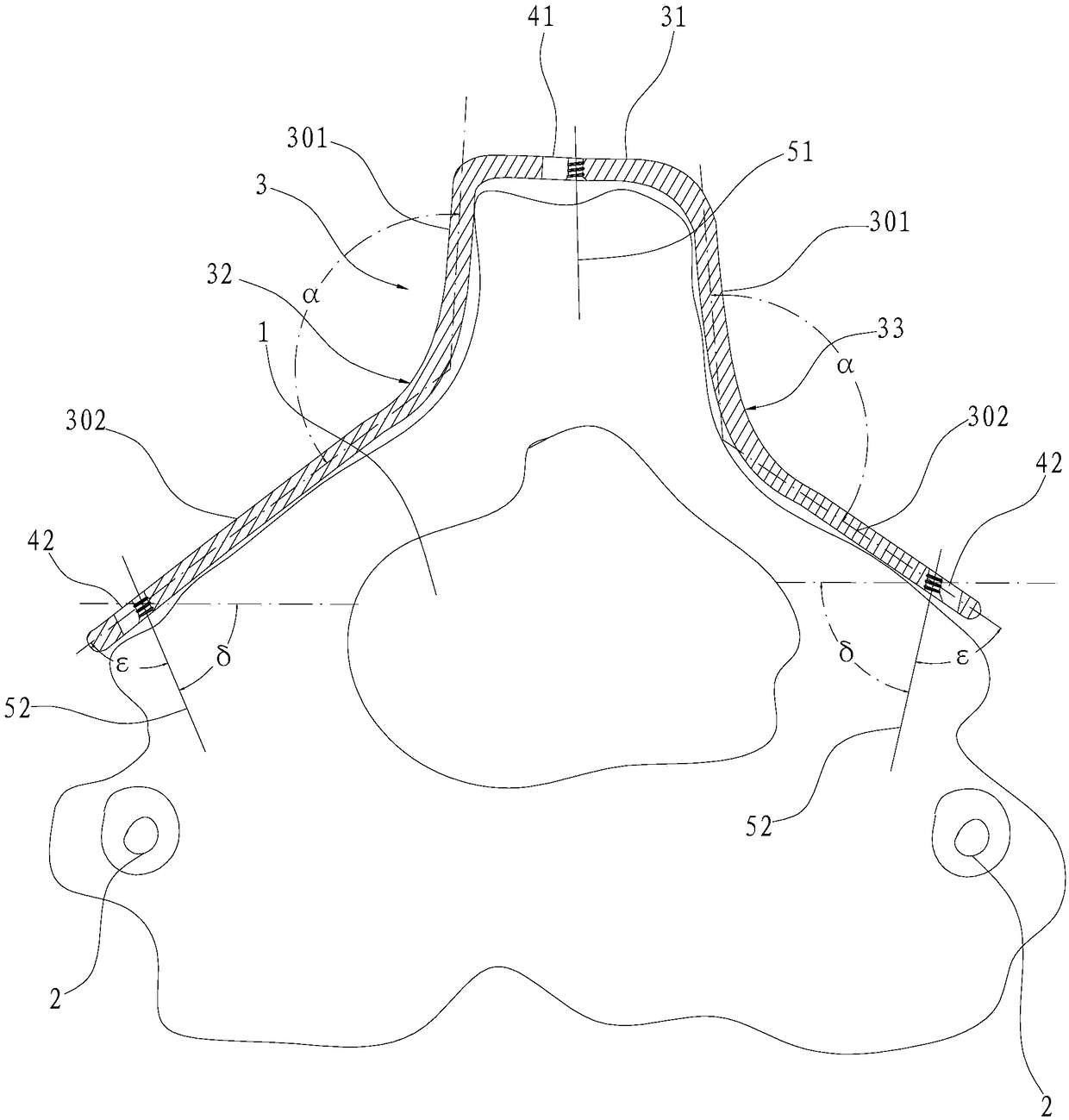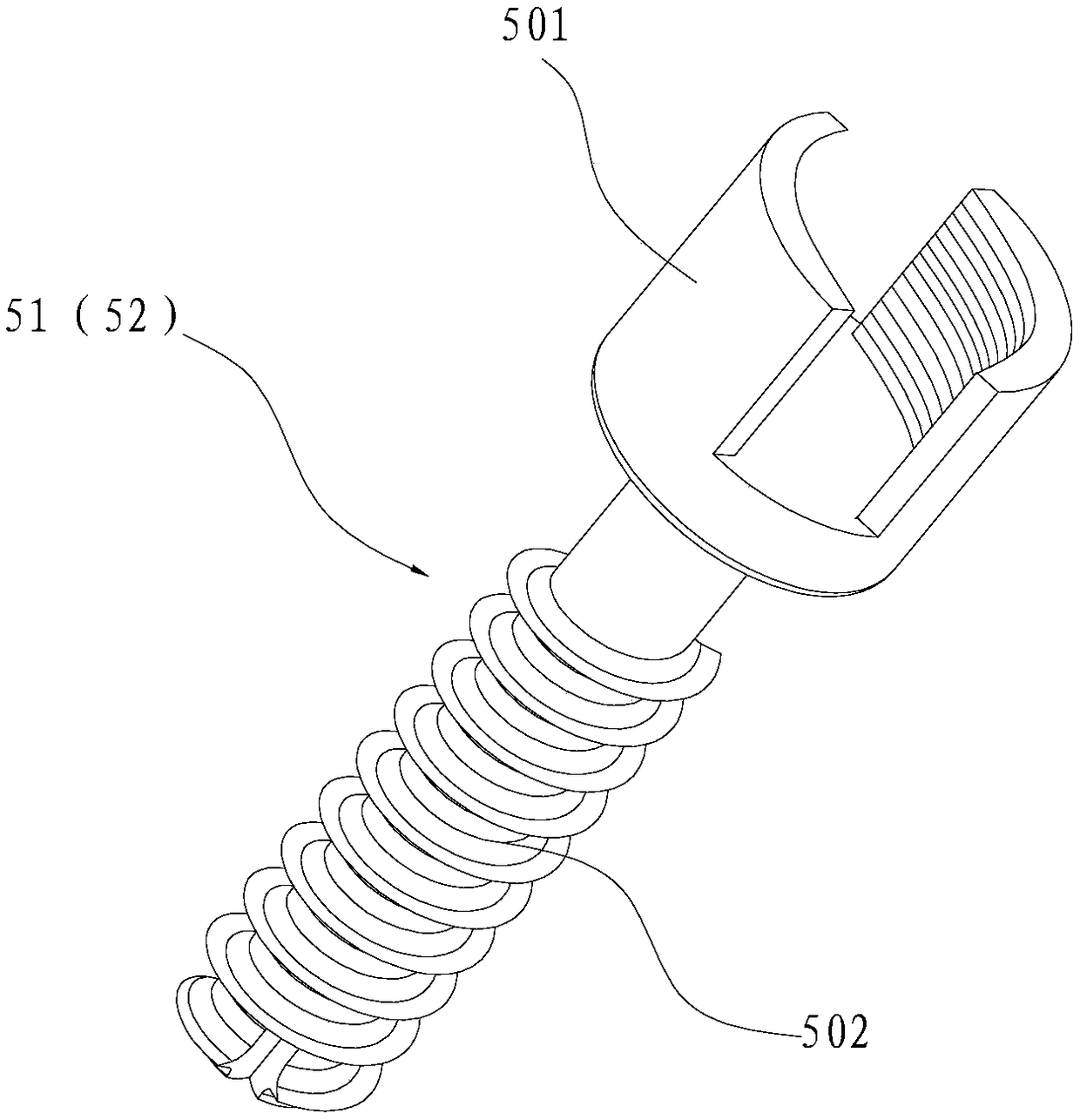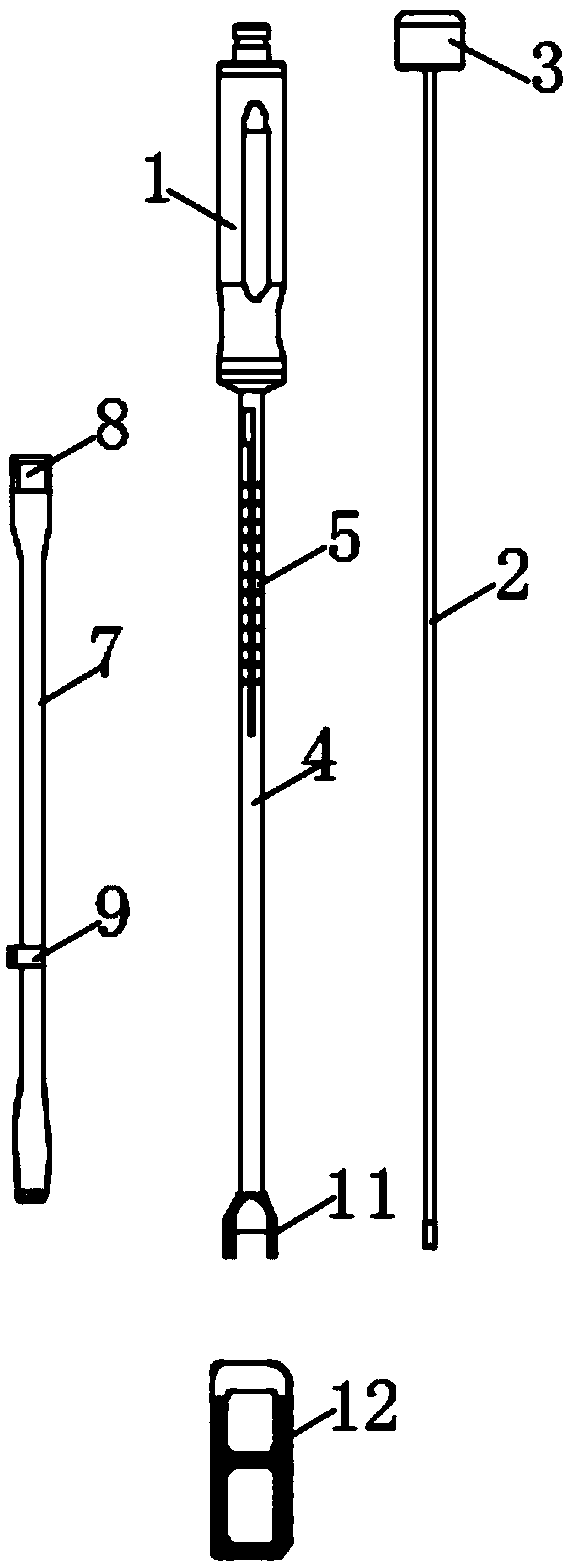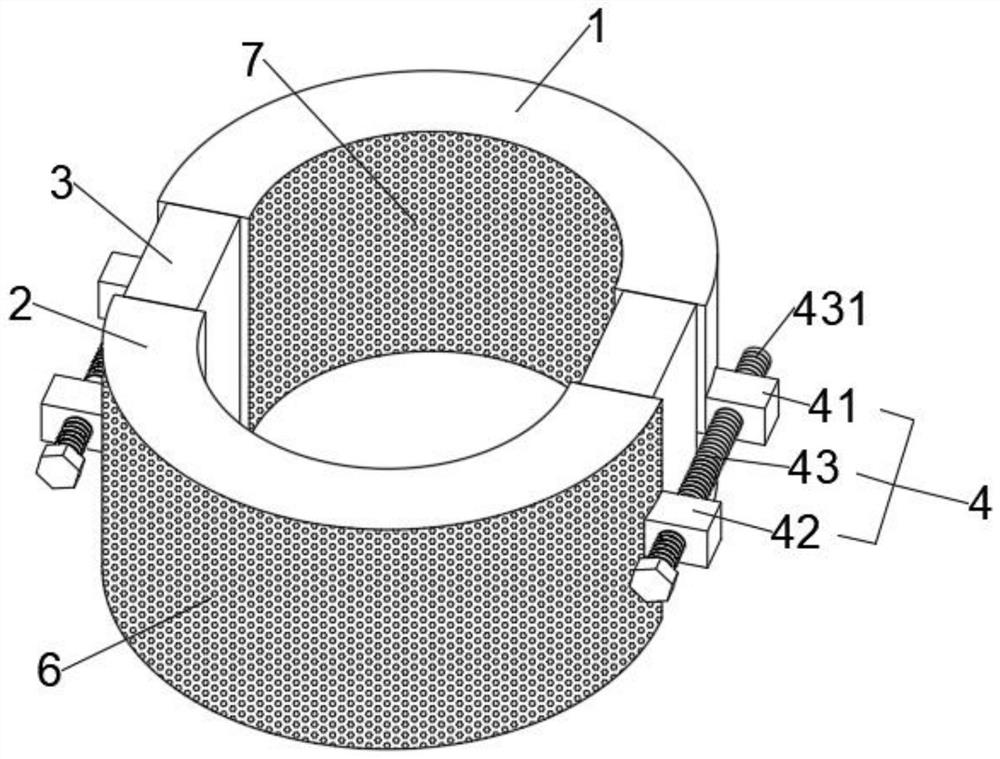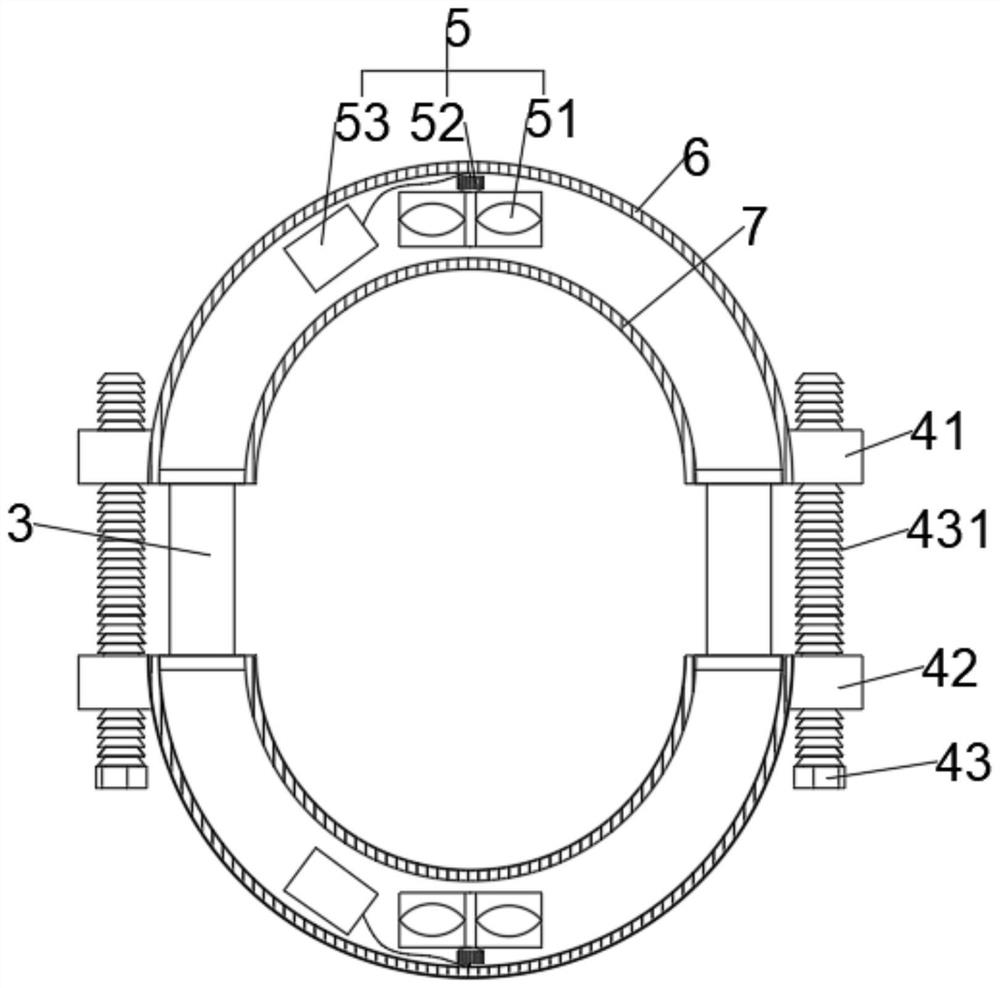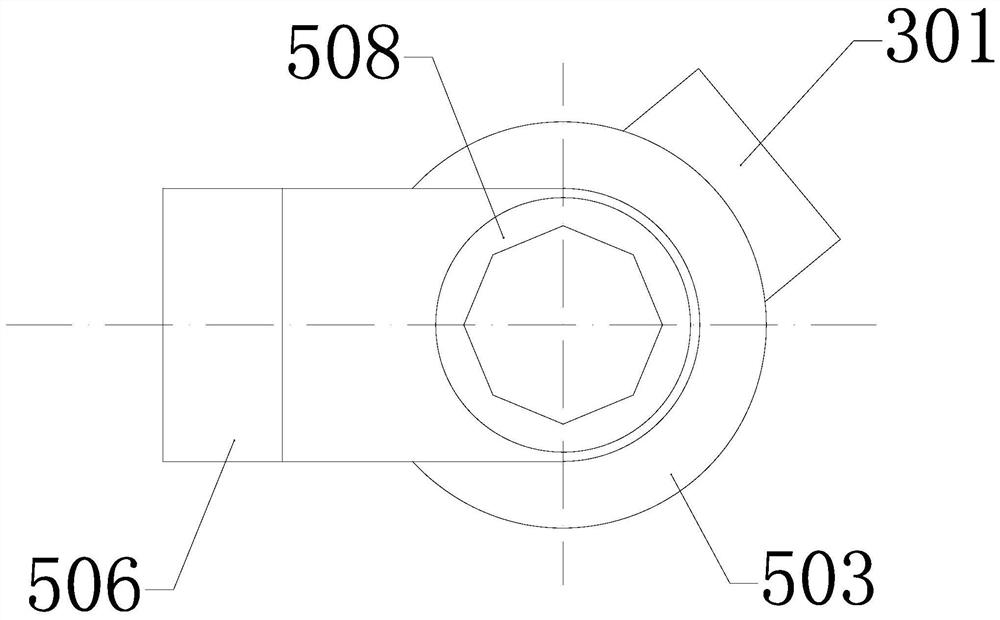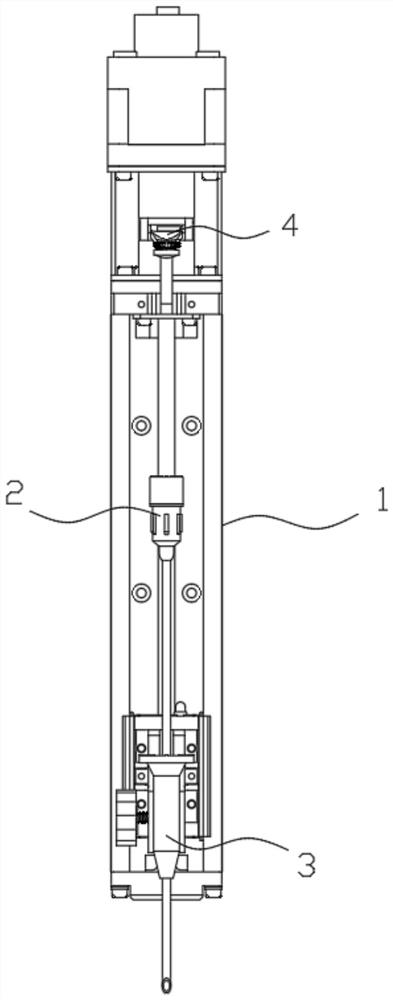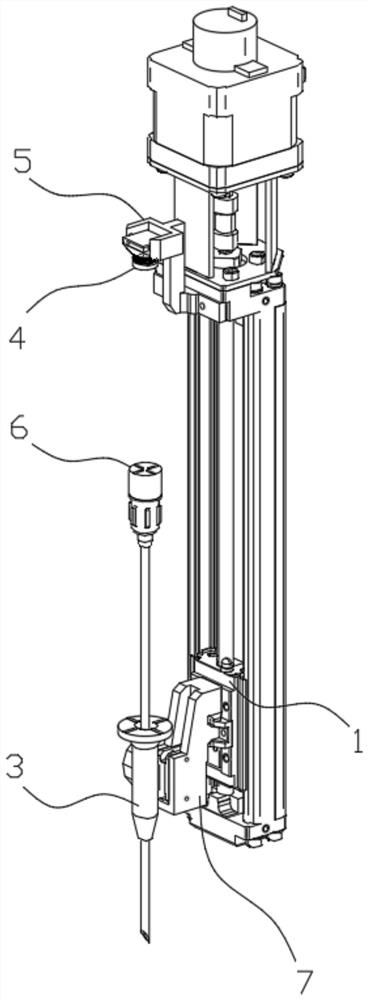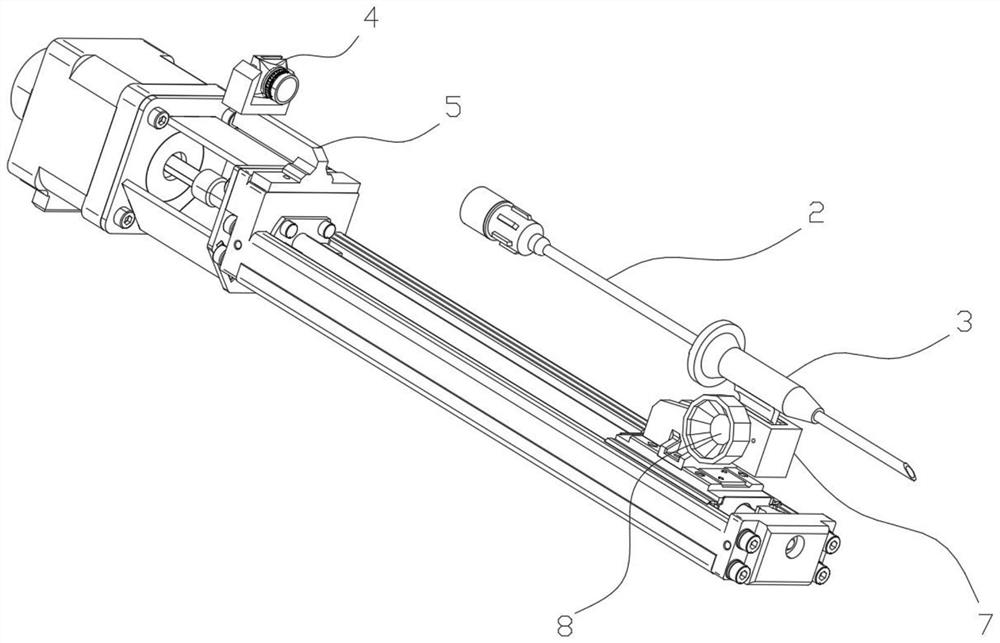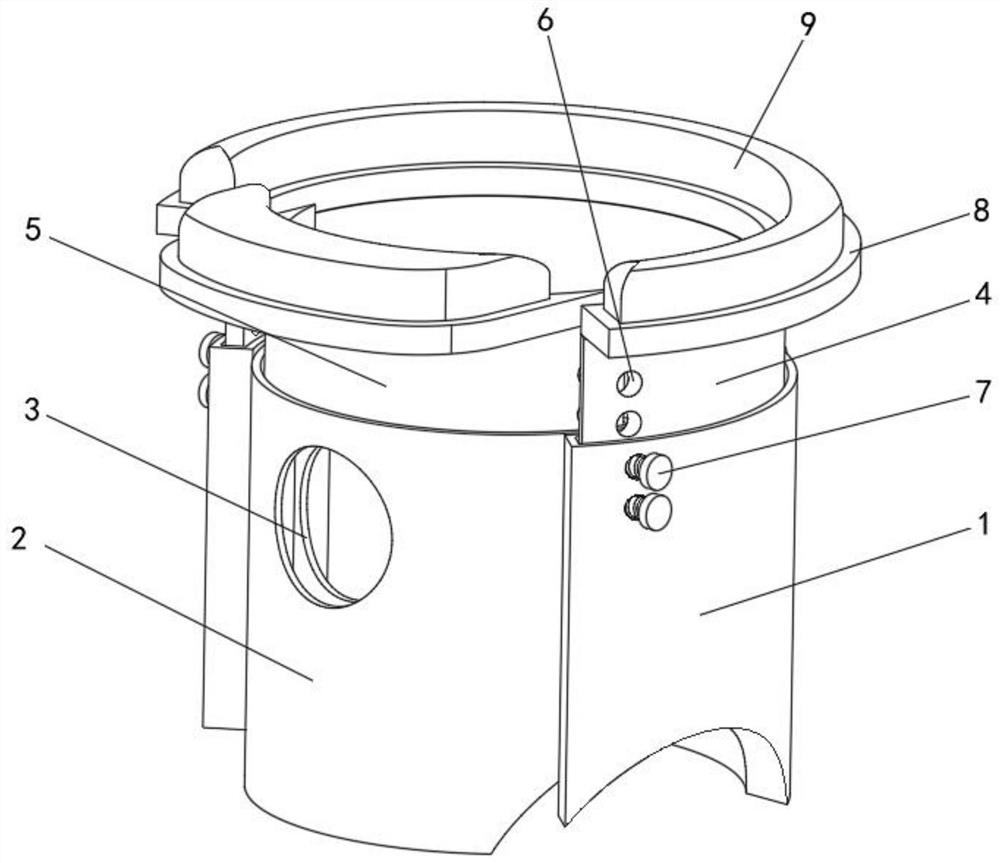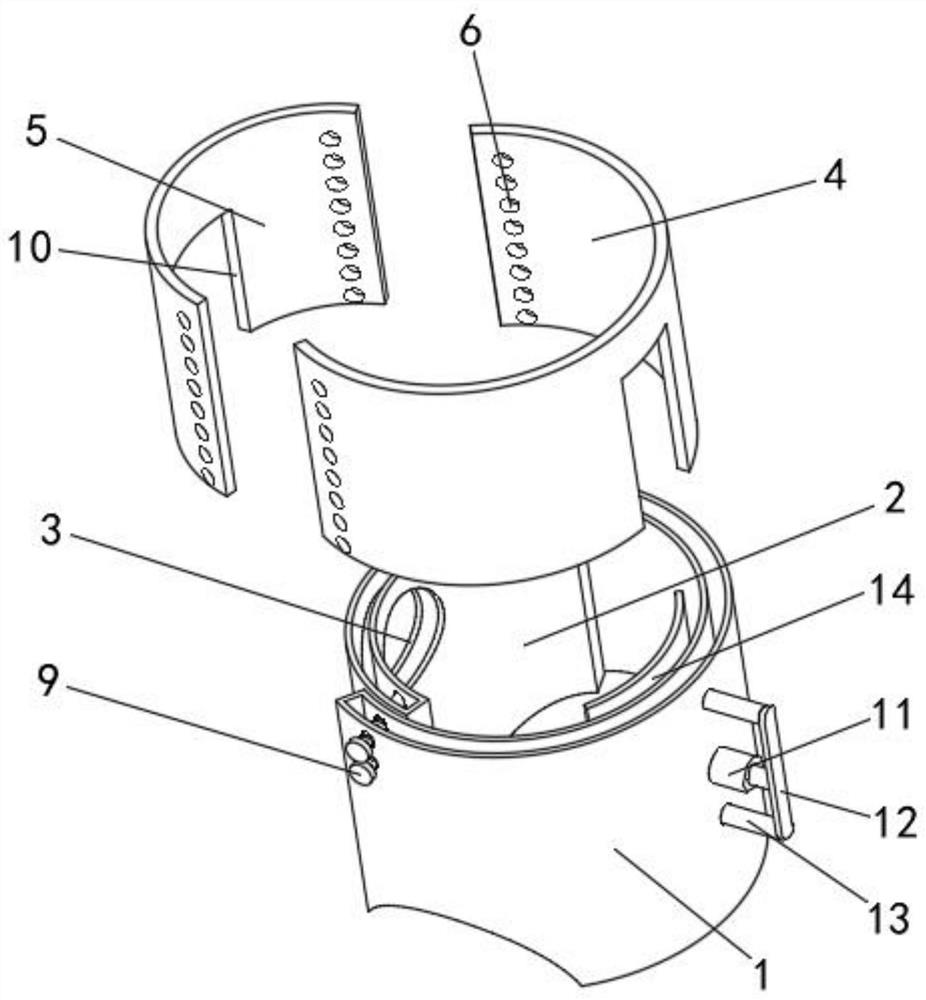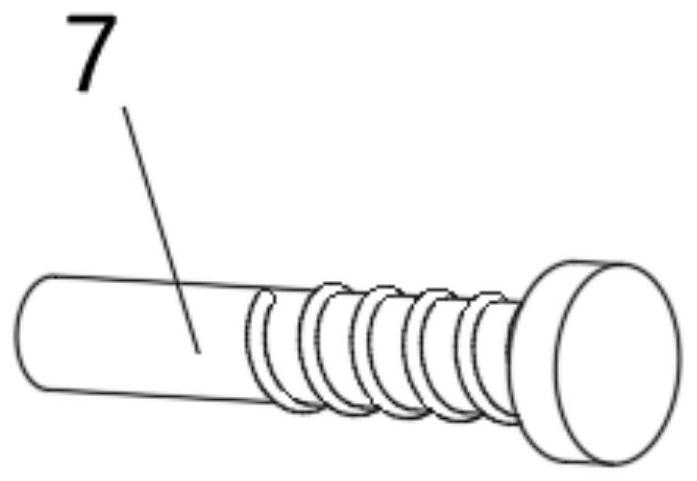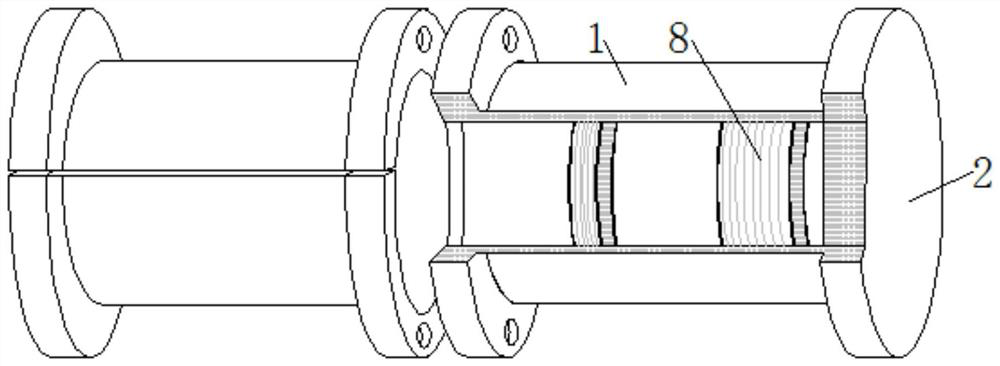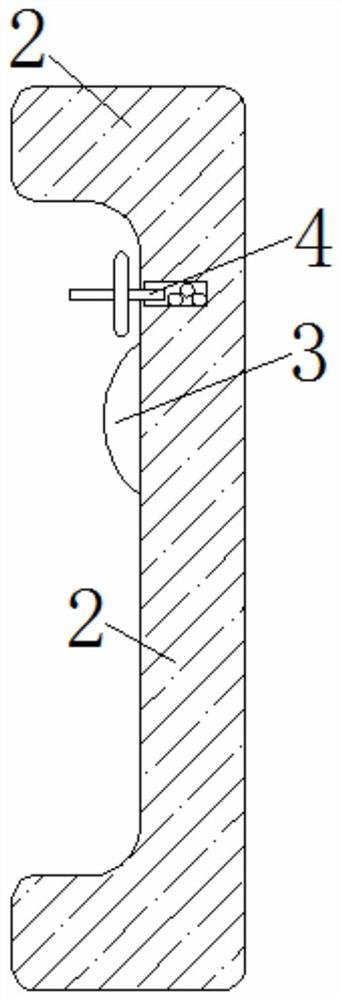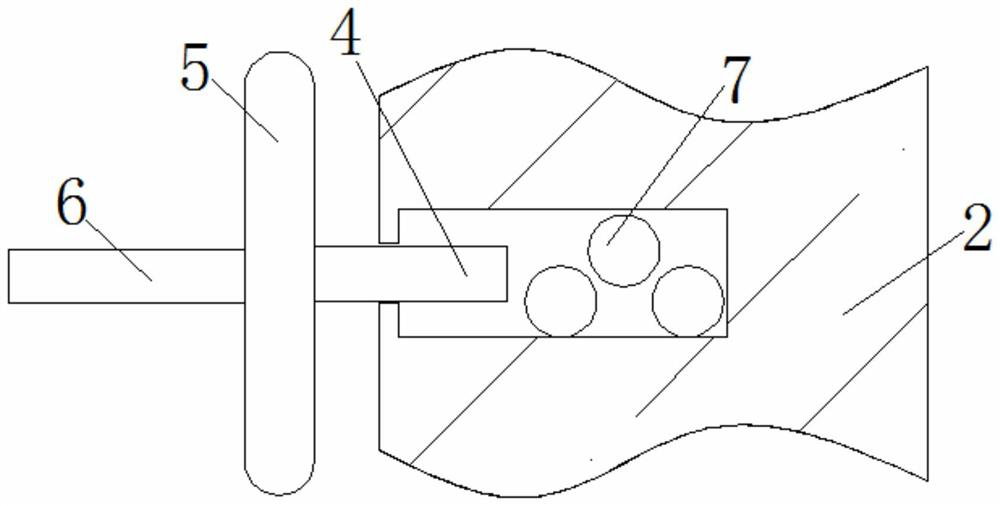Patents
Literature
49 results about "Posterior fixation" patented technology
Efficacy Topic
Property
Owner
Technical Advancement
Application Domain
Technology Topic
Technology Field Word
Patent Country/Region
Patent Type
Patent Status
Application Year
Inventor
Posterior Fixation. Posterior fixation for the thoracolumbar spine is a procedure intended to provide (re)alignment and stabilization of spinal segments throughout the healing process, allowing fusion to occur. The treatment goals of posterior fixation surgery, whether it be an open, MAS, or hybrid technique, are generally recognized to be the same.
Multi-axial bone attachment assembly
ActiveUS20050283157A1Increase allowable angulationSuture equipmentsInternal osteosythesisPosterior fixationBiomedical engineering
A posterior fixation system includes a saddle member and an anchoring member. The anchoring member anchors the saddle member to bone. The saddle member includes a pair of upright portions that define a channel. The saddle member further has a hole therethrough bounded by an inner wall, and the hole forms a lower opening in the saddle member. The lower opening in the saddle member may contain angular cutouts placed symmetrically about the axis of the saddle to increase the allowable angulation of the bone screw in relationship to the axis of the saddle. The channel is adapted to receive an orthopedic rod, and the hole in the saddle member is adapted to receive the anchoring member. The saddle member and the anchoring member can be coupled so as to allow multi-axial movement of the members.
Owner:WARSAW ORTHOPEDIC INC
Multi-axial bone attachment assembly
ActiveUS7264621B2Increase allowable angulationSuture equipmentsInternal osteosythesisPosterior fixationBiomedical engineering
A posterior fixation system includes a saddle member and an anchoring member. The anchoring member anchors the saddle member to bone. The saddle member includes a pair of upright portions that define a channel. The saddle member further has a hole therethrough bounded by an inner wall, and the hole forms a lower opening in the saddle member. The lower opening in the saddle member may contain angular cutouts placed symmetrically about the axis of the saddle to increase the allowable angulation of the bone screw in relationship to the axis of the saddle. The channel is adapted to receive an orthopedic rod, and the hole in the saddle member is adapted to receive the anchoring member. The saddle member and the anchoring member can be coupled so as to allow multi-axial movement of the members.
Owner:WARSAW ORTHOPEDIC INC
Posterior Fixation System
A posterior fixation system includes a saddle member, an anchoring member, an occipital plate, an occipital rod, and a cross-link connector. The anchoring member anchors the saddle member to bone. The saddle member includes a pair of upright portions that define a channel. The channel is adapted to receive an orthopedic rod, and the saddle member can include a hole to receive the anchoring member. The saddle member and the anchoring member can be coupled so as to allow multi-axial movement of the members. The anchoring member in one embodiment is a screw coupled to the hole of the saddle, and in another embodiment, the anchoring member is a hook. The offset member may be coupled to the saddle member to allow for offset connection of rods. Connection of individual rods can be accomplished by connecting the rods with the cross-link connector. The cross-link connector has an integrally formed cylindrical member that couples a pair of coupling portions together. The cylindrical member can be bent along multiple axes. The occipital plate secures the rods to the occipital bone of the skull. The occipital plate has a cross-shaped plate with a plurality of apertures defined in the plate and at least one saddle member coupled to the plate. Alternatively, the occipital rod can be secured to the occipital bone.
Owner:WARSAW ORTHOPEDIC INC
Posterior fixation system
InactiveUS20050090823A1Reduce restrictionsReduces limitation and shortcomingInternal osteosythesisJoint implantsNon invasivePosterior fixation
A posterior fixation system for the human spine associated with fusion or corrective procedures in achieving proper alignment of the spine with regard to the patient's natural or corrective posture through optional postoperative re-adjustment. The fixation system may include a clamping block secured to a bone segment by pedicle screws or other anchoring device whereby a cross member passes through the multi-axial clamping block and is attached to a bone segment opposite the bridged section. The cross member is clamped and locked into position by engaging the set screw which is also accessible postoperatively by non-invasive means. The fixation of the bone segments promotes healing over an affected area while facilitating a proper alignment of the spine.
Owner:BARTIMUS CHRISTOPHER SHAWN
Stand-alone interbody fixation system
A stand-alone interbody fixation system having a cage, anterior fixation blade and posterior fixation blade. The cage includes an annular side wall with an open interior and upper and lower surfaces, the cage being configured to fit between end plates of adjacent vertebrae. The anterior fixation blade includes an anterior alignment boss with two opposing outward extending anterior blades with end plate penetrating tips configured to fit within the open interior of the cage. The posterior fixation blade includes a posterior alignment boss with two opposing outward extending posterior blades with end plate penetrating tips configured to fit within the open interior of the cage. The anterior and posterior fixation blades are counter-rotating blades and the anterior alignment boss and posterior alignment boss are configured to receive or engage a deployment instrument having an anterior engagement portion and a posterior engagement portion configured to rotate the anterior and posterior fixation blades from a stowed position to a deployed condition.
Owner:ALPHATEC SPINE INC
Surgical Instrument With Integrated Reduction And Distraction Mechanisms
ActiveUS20100024487A1Shorten operation timeImprove efficiencyInternal osteosythesisFractureDistractionPosterior fixation
Embodiments of a surgical instrument disclosed herein can include mechanisms for reduction and distraction as well as compression. Some embodiments of the surgical instrument may comprise a reducer knob having a first passage through which a first shaft of a driver is acceptable, a connecting element coupled to the reducer knob and having a second passage through which the first shaft of the driver is acceptable, a compressor handle coupled to the connecting element at a first end and having a through hole, and a common handle coupled to the compressor handle via the through hole and pivots between the reducer knob and the compressor handle. With embodiments of a surgical instrument disclosed herein, surgical personnel can distract and hold vertebrae in a distracted state and perform a reduction without having to switch or add instruments. Some embodiments disclosed herein can be particularly useful for reducing spondylolisthesis during posterior fixation.
Owner:ZIMMER BIOMET SPINE INC
Posterior fixation system
A posterior fixation system includes a saddle member, an anchoring member, an occipital plate, an occipital rod, and a cross-link connector. The anchoring member anchors the saddle member to bone. The saddle member includes a pair of upright portions that define a channel. The channel is adapted to receive an orthopedic rod, and the saddle member can include a hole to receive the anchoring member. The saddle member and the anchoring member can be coupled so as to allow multi-axial movement of the members. The anchoring member in one embodiment is a screw coupled to the hole of the saddle, and in another embodiment, the anchoring member is a hook. The offset member may be coupled to the saddle member to allow for offset connection of rods. Connection of individual rods can be accomplished by connecting the rods with the cross-link connector. The cross-link connector has an integrally formed cylindrical member that couples a pair of coupling portions together. The cylindrical member can be bent along multiple axes. The occipital plate secures the rods to the occipital bone of the skull. The occipital plate has a cross-shaped plate with a plurality of apertures defined in the plate and at least one saddle member coupled to the plate. Alternatively, the occipital rod can be secured to the occipital bone.
Owner:WARSAW ORTHOPEDIC INC
Systems and methods for performing spine surgery
ActiveUS9386971B1Stable positionReduce pressure pointInternal osteosythesisDiagnosticsPosterior fixationSpinal column
This application describes surgical instruments and implants for building a posterior fixation construct across one or more segments of the spinal column during a medialized posterior lumbar interbody fusion (PLIF) procedure.
Owner:NUVASIVE
Systems and methods for performing spine surgery
ActiveUS9113853B1Reduce pressure pointPrevent slippingInternal osteosythesisDiagnosticsPosterior fixationSpinal column
This application describes surgical instruments and implants for building a posterior fixation construct across one or more segments of the spinal column during a medialized posterior lumbar interbody fusion (PLIF) procedure.
Owner:NUVASIVE
Locking nail system for arthrodesis reconstruction in calcaneus fractures
InactiveUS20080015587A1Avoid failureProcess safety and stabilityInternal osteosythesisJoint implantsCalcaneusPosterior fixation
A locking nail system for arthrodesis reconstruction of calcaneus fractures that is comprised of a nail (1), several calcaneus-talar screws (2), a guide (3), guide tubes, bit, depth gauge, cannulated screwdriver, diapason impactor, bit with limiter and reference guide-pin, the principal object of which is the reconstruction of severe comminuted fractures of the calcaneus in humans and fixation of this bone after reconstructing its principal form, to the talus, in order to attain arthrodesis or fusion with the latter.
Owner:LOPEZ OLIVA MUNOZ FELIPE
Intra spinous process and method of bone graft placement
A spinal fixation plate for posterior fixation, including a plate body having flattened flanges extending along sides of the plate body, the flanges being interconnected by a convex arcuate process. A method of fixing vertebrae, including the steps of disposing a spinal fixation plate upon dorsal surfaces of adjoining vertebrae, wherein flanges of the spinal fixation plate extend parallel to the spinal column and rest upon superior articular processes of the adjoining vertebrae, and anchoring the spinal fixation plate to the vertebrae with at least one fastener by disposing the fastener through at least one aperture of the spinal fixation plate into the vertebrae.
Owner:IINN
Surgical instrument with integrated reduction and distraction mechanisms
ActiveUS9066763B2Increase efficiency and accuracyReduce difficultyInternal osteosythesisFractureDistractionSurgical operation
Embodiments of a surgical instrument disclosed herein can include mechanisms for reduction and distraction as well as compression. Some embodiments of the surgical instrument may comprise a reducer knob having a first passage through which a first shaft of a driver is acceptable, a connecting element coupled to the reducer knob and having a second passage through which the first shaft of the driver is acceptable, a compressor handle coupled to the connecting element at a first end and having a through hole, and a common handle coupled to the compressor handle via the through hole and pivots between the reducer knob and the compressor handle. With embodiments of a surgical instrument disclosed herein, surgical personnel can distract and hold vertebrae in a distracted state and perform a reduction without having to switch or add instruments. Some embodiments disclosed herein can be particularly useful for reducing spondylolisthesis during posterior fixation.
Owner:ZIMMER BIOMET SPINE INC
Multi-axial bone attachment assembly
A posterior fixation system includes a saddle member and an anchoring member. The anchoring member anchors the saddle member to bone. The saddle member includes a pair of upright portions that define a channel. The saddle member further has a hole therethrough bounded by an inner wall, and the hole forms a lower opening in the saddle member. The lower opening in the saddle member may contain angular cutouts placed symmetrically about the axis of the saddle to increase the allowable angulation of the bone screw in relationship to the axis of the saddle. The channel is adapted to receive an orthopedic rod, and the hole in the saddle member is adapted to receive the anchoring member. The saddle member and the anchoring member can be coupled so as to allow multi-axial movement of the members.
Owner:WARSAW ORTHOPEDIC INC
Low-profile bidirectional locking large-angle universal pedicle screw
PendingCN106580415ANotch lowUniversal activity is largeInternal osteosythesisPosterior fixationPosterior approach
The invention discloses a low-profile bidirectional locking large-angle universal pedicle screw and relates to pedicle screws for spinal posterior approach surgery. The low-profile bidirectional locking large-angle universal pedicle screw for fixation and correction through pedicle nailing during spinal posterior fixation and correction surgery is provided. The pedicle screw comprises a screw cap and a screw body, wherein a U-shaped groove is formed in the side of a spherical screw head of the screw body; the screw body is hollow; a proximal thread is formed in the proximal end of the screw body; a distal thread is formed in the distal end of the screw body; the depth of the proximal thread is smaller than the depth of the distal thread; a through hole is formed in the distal thread; the distal thread is used for injecting bone cement; a pore is formed in the tail end of the screw body and is used for injecting the bone cement; a screw cap and screw body bidirectional locking device is arranged between the screw cap and the screw body; and a locking nut is arranged on the U-shaped groove and is used for locking the U-shaped groove and a connecting rod.
Owner:张衣北
Posterior fixation system
A posterior fixation system includes a saddle member, an anchoring member, an occipital plate, an occipital rod, and a cross-link connector. The anchoring member anchors the saddle member to bone. The saddle member includes a pair of upright portions that define a channel. The channel is adapted to receive an orthopedic rod, and the saddle member can include a hole to receive the anchoring member. The saddle member and the anchoring member can be coupled so as to allow multi-axial movement of the members. The anchoring member in one embodiment is a screw coupled to the hole of the saddle, and in another embodiment, the anchoring member is a hook. The offset member may be coupled to the saddle member to allow for offset connection of rods. Connection of individual rods can be accomplished by connecting the rods with the cross-link connector. The cross-link connector has an integrally formed cylindrical member that couples a pair of coupling portions together. The cylindrical member can be bent along multiple axes. The occipital plate secures the rods to the occipital bone of the skull. The occipital plate has a cross-shaped plate with a plurality of apertures defined in the plate and at least one saddle member coupled to the plate. Alternatively, the occipital rod can be secured to the occipital bone.
Owner:WARSAW ORTHOPEDIC INC
Stand-alone interbody fixation system
A stand-alone interbody fixation system having a cage, anterior fixation blade and posterior fixation blade. The cage includes an annular side wall with an open interior and upper and lower surfaces, the cage being configured to fit between end plates of adjacent vertebrae. The anterior fixation blade includes an anterior alignment boss with two opposing outward extending anterior blades with end plate penetrating tips configured to fit within the open interior of the cage. The posterior fixation blade includes a posterior alignment boss with two opposing outward extending posterior blades with end plate penetrating tips configured to fit within the open interior of the cage. The anterior and posterior fixation blades are counter-rotating blades and the anterior alignment boss and posterior alignment boss are configured to receive or engage a deployment instrument having an anterior engagement portion and a posterior engagement portion configured to rotate the anterior and posterior fixation blades from a stowed position to a deployed condition.
Owner:ALPHATEC SPINE INC
Manufacture method and use method of rat tracheal intubation equipment
The invention belongs to manufacture method and use method of rat tracheal intubation equipment, and particularly relates to a manufacture method and use method of tracheal intubation equipment of a rat acute myocardial infarction model. A needle core and an inner guide wire of the needle core are respectively a guide needle and a loach guide wire (Terumo super-slippery M-shaped loach guide wire in Japan) used for coronary artery intervention; the soft end of the guide wire penetrates through the tail end of the guide needle and is exposed from the head end of the guide needle by 0.4cm; and the redundant guide wire at the tail end of the guide needle is cut off. An outer-layer hose is prepared from an infusion needle of disposable venous infusion apparatus (Shanghai Youyu Medical EquipmentCo., Ltd., 0.5x20 infusion apparatus), wherein the length of the outer-layer hose is shorter than the length of a catheter needle by 0.3 cm, and the root of the hose is cut obliquely by a movable flap which accounting for 1 / 3 of the circumference of the hose. After anaesthesia, a rat is fixed and is subjected to skin preparation, a rat tongue is clamped out with a small tweezer, the tongue tip ispulled by a left hand, and a tracheal intubation pipe is hold by a right hand. A hard catheter needle at the head end of the tracheal intubation needle core is arranged at the root part of the rat tongue, and a trachea opening of the rat is searched by fine adjustment of the self-made tracheal intubation pipe under direct vision. The guide wire at the head end of the tracheal intubation pipe is sent in instantly when the trachea opening is opened, then the guide wire at the head end is inserted into the trachea opening by about 1cm through rotation, and the catheter needle is pulled out, wherein if the rat can breathe uniformly and smoothly, intubation is successful.
Owner:吴庆景 +1
Automatic bone drilling device
ActiveCN111110316ARealize fully automatic operationSimple and fast operationSurgerySpinal columnPosterior fixation
The invention discloses an automatic bone drilling device. The device comprises a feeding mechanism (3), a rotating mechanism (2) installed on the feeding mechanism (3), and a Kirschner wire (1) installed on the rotating mechanism (2); and the rotating mechanism (2) has a hollow structure, the Kirschner wire (1) is fixed after being inserted into the rotating mechanism (2), and the insertion depthof the Kirschner wire (1) is adjustable. According to the device, the rotating mechanism is set as the hollow structure, so that the exposed length of the operation part of the Kirschner wire can beadjusted, and the device is simple and convenient to operate without being assembled and disassembled by bolts; and in addition, the feeding mechanism and the rotating mechanism of the device are improved in structure, the volume and mass are greatly reduced, and the device can realize fully automatic operation of spinal bone drilling.
Owner:NANJING TUODAO MEDICAL TECHNOLOGY CO LTD
Bilateral shoulder joint postoperative fixing abduction bag support
A bilateral shoulder joint postoperative fixing abduction bag brace relates to the field of medical tools and is characterized in that the front end of a left brace is fixedly connected with one end of a left strap, the rear end of the left brace is fixedly connected with the other end of the left strap, the front end of a right brace is fixedly connected with one end of a right strap, and the rear end of the right brace is fixedly connected with the other end of the right strap; wherein the binding belts are sewn on the left side support and the right side support, and the left side support and the right side support are connected through the connecting belt and the connecting device. The length of the left strap and the length of the right strap can be adjusted. The diameter of the bandage is adjustable. Crossed belts are fixed at the front ends of the left and right supports and can be used for placing health care balls. The binding band and the cross band are adhered together through the adhesive tape, and the use is convenient. The fixing is accurate, simple, convenient and comfortable; the cost is low; the complications are few, and the like.
Owner:闫增龙
Fixation device for pelvis
InactiveUS20190117434A1Easy to useShorten periodPlastersPlaster of paris bandagesThighPelvic fixation
A fixation device for pelvis includes a front fixation plate and a back fixation plate. The front fixation plate and the rear fixation plate are detachably connected to form a receiving space for receiving the waist, the abdomen, the hip and the thighs. The front fixation plate includes a first left-side piece and a first right-side piece. The rear fixation plate includes a second left-side piece and a second right-side piece. The first left-side piece, the first right-side piece, the second left-side piece and the second right-side piece are respectively provided with a cavity for accommodating a polyurethane slurry. When in use, the cavities are respectively injected with the polyurethane slurry, and after the polyurethane slurry solidifies, the shape of the fixation device is matched to the waist, the abdomen, the hip and the thighs to support the patient's hip and pelvis.
Owner:ZHU XIEPING
Positioning device for skull drilling
ActiveCN111658067AEffective positioningInstruments for stereotaxic surgeryBone drill guidesPosterior fixationHead fixation
The invention discloses a positioning device for skull drilling. The positioning device comprises a main mounting frame, front fixing rods and a rear fixing rod. During use, the main mounting frame isarranged above the head of a patient, and extends in the left-right direction of the patient; the main mounting frame is fixed to the head of the patient; the front fixing rods are movably connectedwith the main mounting frame; one end of each front fixing rod extends to the rear of the main mounting frame, and is used for positioning a drilling point, and the other end of each front fixing rodextends to the front of the head of the patient, is suspended in front of the head of the patient, and is used for being fixed to the head of the patient; one end of the rear fixing rod is movably connected with the main mounting frame, and the other end of the rear fixing rod extends to the rear of the head of the patient and is used for supporting the head of the patient from the rear portion; adrill bit fixing rod is movably connected onto the main mounting frame, and a drill bit can be effectively positioned by adjusting the position of the drill bit fixing rod; and the drill bit is arranged in the drill bit fixing rod, and drills the drilling position located by the front fixing rods, so that the accuracy of the drilling position can be guaranteed.
Owner:THE SECOND XIANGYA HOSPITAL OF CENT SOUTH UNIV
Method and instruments for interbody fusion and posterior fixation through a single incision
ActiveUS10299838B2Invasive accessInternal osteosythesisCannulasPosterior fixationIntervertebral disc
A method of providing access to an intervertebral disc has been developed that involves using the patient's bony pedicle as an anchoring spot for a pedicle screw that temporarily attaches to the access port. One key element of the method is an assembly comprising: a) a screw extension comprising a shaft having a distal end portion comprising a receiver adapted for receiving a screw and a proximal end portion comprising a pivoting feature, b) a port comprising: i) a tubular wall defining a central passageway, ii) a longitudinal slot in the wall defining opposed ends of the wall, iii) opposed flanges extending radially from each end of the wall, and iv) a mating feature disposed in each opposed flanges adapted to pivotally mate with the pivoting feature of the screw extension, wherein the mating feature of the tube pivotally mates with the pivoting feature of the screw extension.
Owner:MEDOS INT SARL
A screw plate system for posterior fixation of the axis
PendingCN109171932AEasy to fixAvoid insertingFastenersBone platesPosterior fixationLeft vertebral artery
The present invention relates to a screw plate system for posterior fixation of the axis, including a spinous process screw, an isthmus screw and a spinous process plates. The spinous process plate comprising a head and first and second shoulders disposed on both sides of the head. The head matches the anatomy of the spinous process apex. The first shoulder is matched with the spinous process sideof the spinous process tip and the vertebral lamina, and the second shoulder is matched with the spinous process side of the other spinous process tip and the pushing plate. The head is provided witha first through hole for inserting the spinous process screw, and the first shoulder and the second shoulder are provided with a first through hole for inserting the isthmic screw. The spinous process steel plate can be stably fixed at the corresponding position of the spinous process of the axis, can completely avoid the spinous process screw from being inserted into the vertebral canal, minimizes the possibility of encroaching on the spinal cord, and furthermore can prevent the isthmus screw from encroaching on the vertebral artery.
Owner:刘观燚
Spinal fusion cage
PendingCN109124834AReduce radiationNovel structureJoint implantsSpinal implantsPosterior fixationBiomedical engineering
A spinal fusion cage implant is disclosed, including a handles. A sleeve is fixedly connected to the bottom of the handle, an outer side of the sleeve and an end adjacent to the handle are provided with a graduation mark, two stopper grooves are symmetrically arranged on the outer side of the sleeve and close to the handle, and an end of the sleeve away from the handle is fixedly connected with afuser connecting head. The sleeve and handle are hollow structure, and a lifting lever is inserted into the handle. The lifting lever is pierced from one end of the handle and extends into the interior of the sleeve, a tail cap is fixedly connected to an end of that lifting rod close to the handle. The cannula is slidably connected with a posterior fixation seat on the outside, and two limiting blocks are symmetrically arranged inside the posterior fixation seat. The invention has simple and novel structure, strong practicability, simple and quick operation, and the novel spinal fusion cage implantation device does not need fluoroscopy to determine the implantation depth of the fusion cage when implantation, reduces radiation to the patient body, and is convenient to operate.
Owner:CHUANGHUI MEDICAL EQUIP JIANGSU
Neck spine fixing device
PendingCN113288555ASpeed up circulationEasy to adjustFractureTherapeutic coolingPosterior fixationSpinal column
The invention relates to the technical field of medical equipment, in particular to a neck spine fixing device, which is characterized by comprising a front fixing seat and a rear fixing seat, the front fixing seat and the rear fixing seat are arc-shaped, and the front fixing seat and the rear fixing seat are fixed through an elastic belt and an adjusting mechanism; the elastic belt is located between the end of the front fixing base and the end of the rear fixing base, the adjusting mechanism is located on the outer end face of the front fixing base and the outer end face of the rear fixing base, and the cooling mechanisms are arranged in the front fixing base and the rear fixing base correspondingly.Through the design of the adjusting mechanism, the neck spine fixing device is changed into a spliced structure, the fixing size can be conveniently adjusted according to the actual requirements of different patients, and the flexibility of the device in the using process is improved; and through the design of the cooling mechanism, starting according to the environment temperature is facilitated, so that air circulation is accelerated, and the heat dissipation effect is improved.
Owner:南京市高淳人民医院
Vertebral body universal reducer used in orthopedic spine surgery
ActiveCN112155704BGuaranteed precisionGuaranteed resetInternal osteosythesisPosterior fixationSpinal column
The invention relates to the technical field of vertebral body reduction structures, in particular to a vertebral body universal reducer used in orthopedic spinal surgery, which includes several positioning locking mechanisms arranged at intervals along the length direction of the spine, and the positioning locking mechanisms It includes two locking components arranged symmetrically about the center line of the spine, the two locking components are fixedly installed on the lumbar posterior transverse process of the corresponding vertebral body, and a fixing rod is respectively installed on both sides of the spine. The fixation rod is used to realize orthopedic reduction and position limitation on both sides of the deformed spine. The present invention adopts the way of fixing the back of the waist to realize the limit fixation of the deformed spine of the human body, which can effectively ensure the correction and reset of the patient's spine; during the surgical installation, the limit fine-tuning distance can be set according to the current patient's deformation, At the same time, different sizes and types of fixing rods can be selected according to the patient's condition, and the fastening, positioning and rotation limit of different fixing rods can be realized.
Owner:陈文祥
A space positioning and guiding device based on c-arm machine puncture
ActiveCN113229904BPrecise puncture guidance effectPrevents affecting puncture guidance accuracySurgical needlesInstruments for stereotaxic surgeryHuman bodyPosterior fixation
Owner:锐德泰医疗科技(成都)有限公司
Rehabilitation tool for medical orthopedic department cervical vertebra physical treatment
PendingCN113017964AImprove comfortImprove practicalityVibration massageFracturePosterior fixationPhysical medicine and rehabilitation
The invention relates to the technical field of medical instruments, and discloses a rehabilitation tool for medical orthopedic department cervical vertebra physical treatment. The tool comprises a rear fixing shell, a front fixing shell is movably connected to the front side of an inner cavity of the rear fixing shell, a through hole is formed in the front side face of the front fixing shell, and a rear lifting plate is movably connected to the top face of the rear fixing shell. The top face of the front fixing shell is movably connected with a front lifting plate. The rear lifting plate and the front lifting plate are pulled upwards, the bottoms of the rear fixing shell and the front fixing shell are attached to the shoulders, an air bag surrounds the jaw and the rear side of the head of a patient, and at the moment, fixing pins are rapidly inserted into connecting holes to fix the positions of the rear fixing shell, the front fixing shell, the rear lifting plate and the front lifting plate. The upward drawing heights of the rear lifting plate and the front lifting plate are different, so that the head of the patient can be finely adjusted in the front-back direction, the comfort of the patient is improved, and the practicability of the device is improved.
Owner:THE AFFILIATED HOSPITAL OF QINGDAO UNIV
A skull drilling positioning device
ActiveCN111658067BEffective positioningInstruments for stereotaxic surgeryBone drill guidesPosterior fixationPhysical medicine and rehabilitation
The invention discloses a skull drilling positioning device, which comprises a main mounting frame, a front fixing rod and a rear fixing rod. During use, the main mounting frame is arranged above the patient's head and extends along the left and right directions of the patient, and the main mounting frame is fixed to the patient's head. The front fixing rod is movably connected with the main mounting bracket. One end of the front fixing rod extends to the rear of the main mounting frame for positioning the drilling point, and the other end extends to the front of the patient's head and is suspended in front of the patient's head for fixing with the patient's head. One end of the rear fixing rod is movably connected with the main mounting frame, and the other end extends toward the back of the patient's head, and is used to support the patient's head from behind. The drill bit fixing rod is movably connected with the main mounting frame, and the position of the drill bit can be effectively positioned by adjusting the position of the drill bit fixing rod. The drill bit is arranged in the drill bit fixing rod, and drills at the drilling position positioned on the forward fixing rod, which can ensure that the drilling position is accurate.
Owner:THE SECOND XIANGYA HOSPITAL OF CENT SOUTH UNIV
Postoperative fixation device for children's leg fractures
ActiveCN111419504BPrevent tamperingAvoid atrophyFracturePosterior fixationPhysical medicine and rehabilitation
The invention relates to the technical field of fracture fixation, and discloses a postoperative fixation device for children with leg fractures, comprising: a fixing cylinder, a stopper is movably installed on the right end of the fixation cylinder, and a fixing block is fixedly installed at the groove of the stopper , the groove of the baffle is movably installed with a movable column, the left end of the movable column is fixedly installed with a fixed piece, the left side of the fixed piece is fixedly installed with a sleeve frame, and the right end of the movable column penetrates and extends to the inside of the baffle The lap has pinballs. Through the cooperation of the fixed ring, the limit block, the block, the movable rod, the inner ring and the limit plate, the child's leg can be limited, ensuring that the child's leg is about to heal, and the child's leg is avoided. At the same time, if the child's legs are disturbed, the change of the angle of the limit plate will not only cause some pain to the legs, but also squeeze the muscles of the legs to avoid the possibility of muscle atrophy caused by the legs not moving for a long time The situation arises.
Owner:丁敬瑄
Features
- R&D
- Intellectual Property
- Life Sciences
- Materials
- Tech Scout
Why Patsnap Eureka
- Unparalleled Data Quality
- Higher Quality Content
- 60% Fewer Hallucinations
Social media
Patsnap Eureka Blog
Learn More Browse by: Latest US Patents, China's latest patents, Technical Efficacy Thesaurus, Application Domain, Technology Topic, Popular Technical Reports.
© 2025 PatSnap. All rights reserved.Legal|Privacy policy|Modern Slavery Act Transparency Statement|Sitemap|About US| Contact US: help@patsnap.com
